Are you a true-blue fan?
Get our Dodgers Dugout newsletter for insights, news and much more.
You may occasionally receive promotional content from the Los Angeles Times.
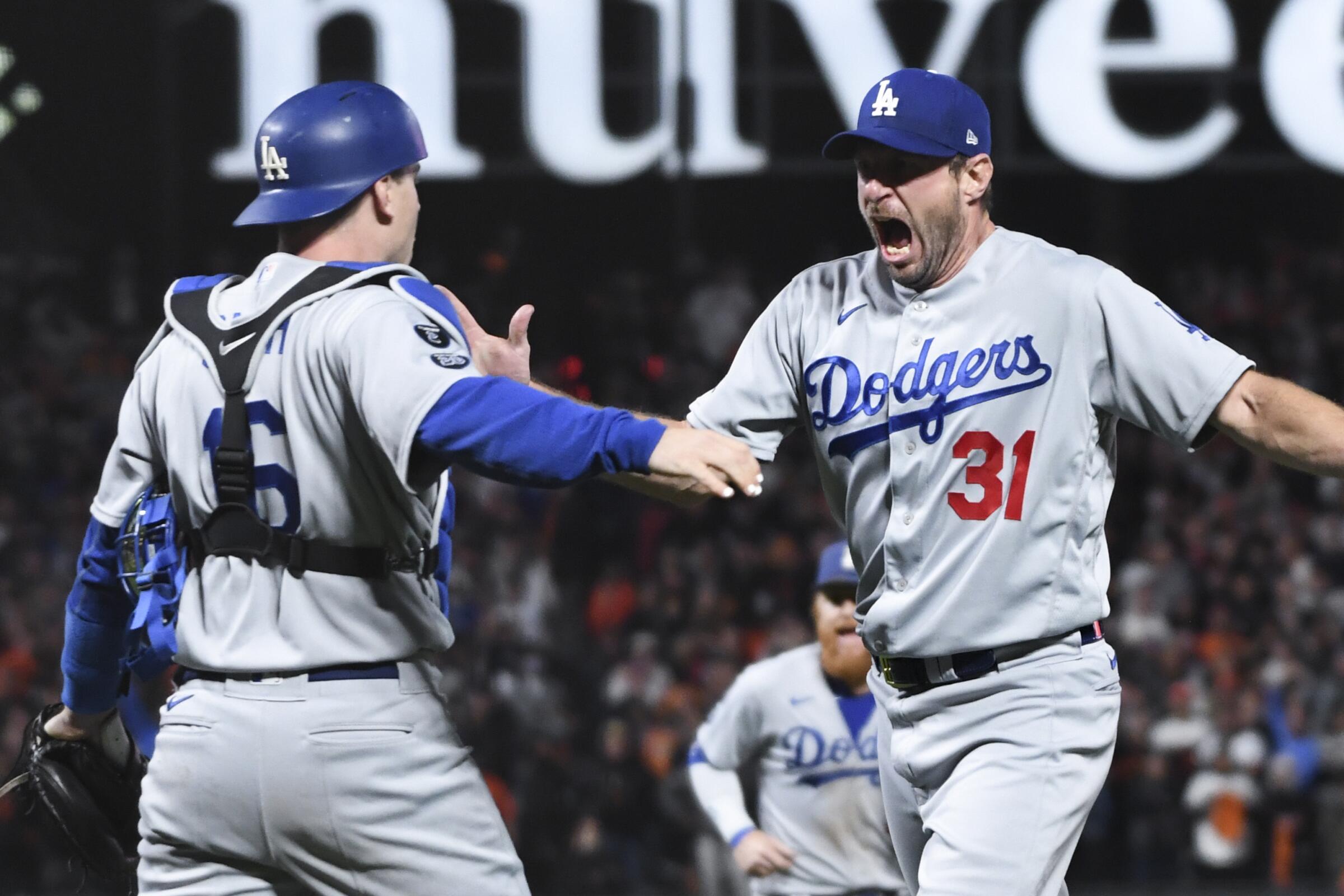
On Saturday, the Dodgers will play their fifth elimination game in the last 16 days, having survived a wild-card play-in game against the St. Louis Cardinals, back-to-back winner-take-all NLDS games against the San Francisco Giants and Thursday’s NLCS Game 5 against the Atlanta Braves. They have won their last 10 elimination games.
Between Brooklyn and Los Angeles, the franchise has played in 84 elimination games, defined here as a playoff game in which either the Dodgers or their opponent would see their season end with a defeat. This list includes playoff tiebreaker series or games in which the loser went home (the 2018 tiebreaker game against the Colorado Rockies to determine the NL West winner is not included because both teams’ seasons continued; the 1980 tiebreaker game against the Houston Astros is included because it ended the loser’s season).
They are 44-42 in elimination games. When down 3-2 in a series, they are 4-6. In winner-take-all seventh games, they are 5-4.
For the list of winner-take-all elimination games in Dodgers history, click here.
For the list of tiebreaker playoff games in Dodgers history, click here.
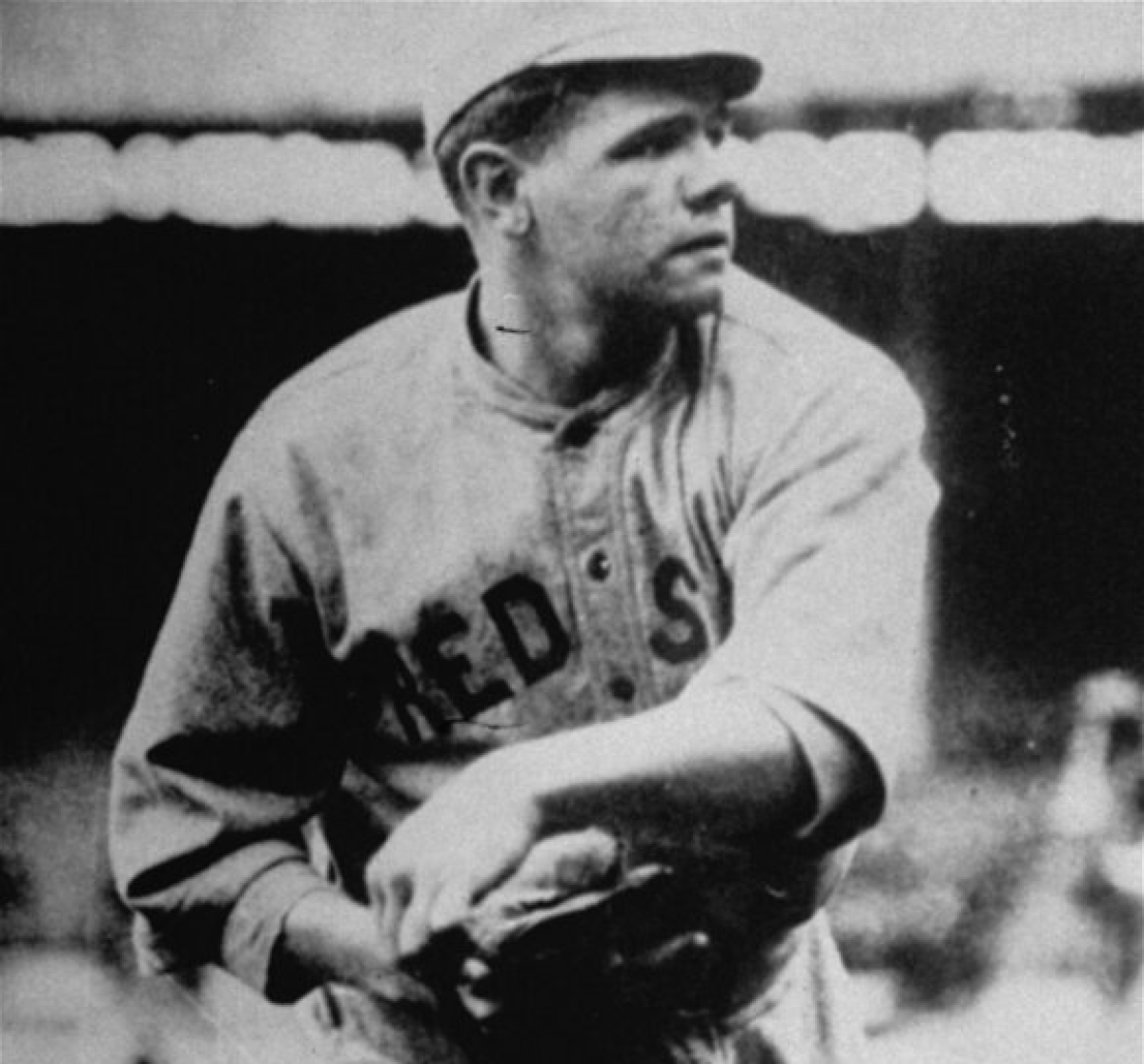
Game 5
Oct. 12
Boston Red Sox 4, Brooklyn Robins 1
Originally named the Dodgers, Brooklyn went by the Robins nickname from 1914-31 (so named after its manager, Wilbert Robinson) and was closed out in Game 5 by Ernie Shore, who pitched a complete-game three-hitter for his second win of the Series. The inaugural World Series in franchise history was notable for the Game 2 performance of Babe Ruth. The pitcher. The Babe tossed a 14-inning complete game in the 2-1 victory. You ask of Babe the slugger? He went 0 for 5 in Game 2, his only appearance in the Series.
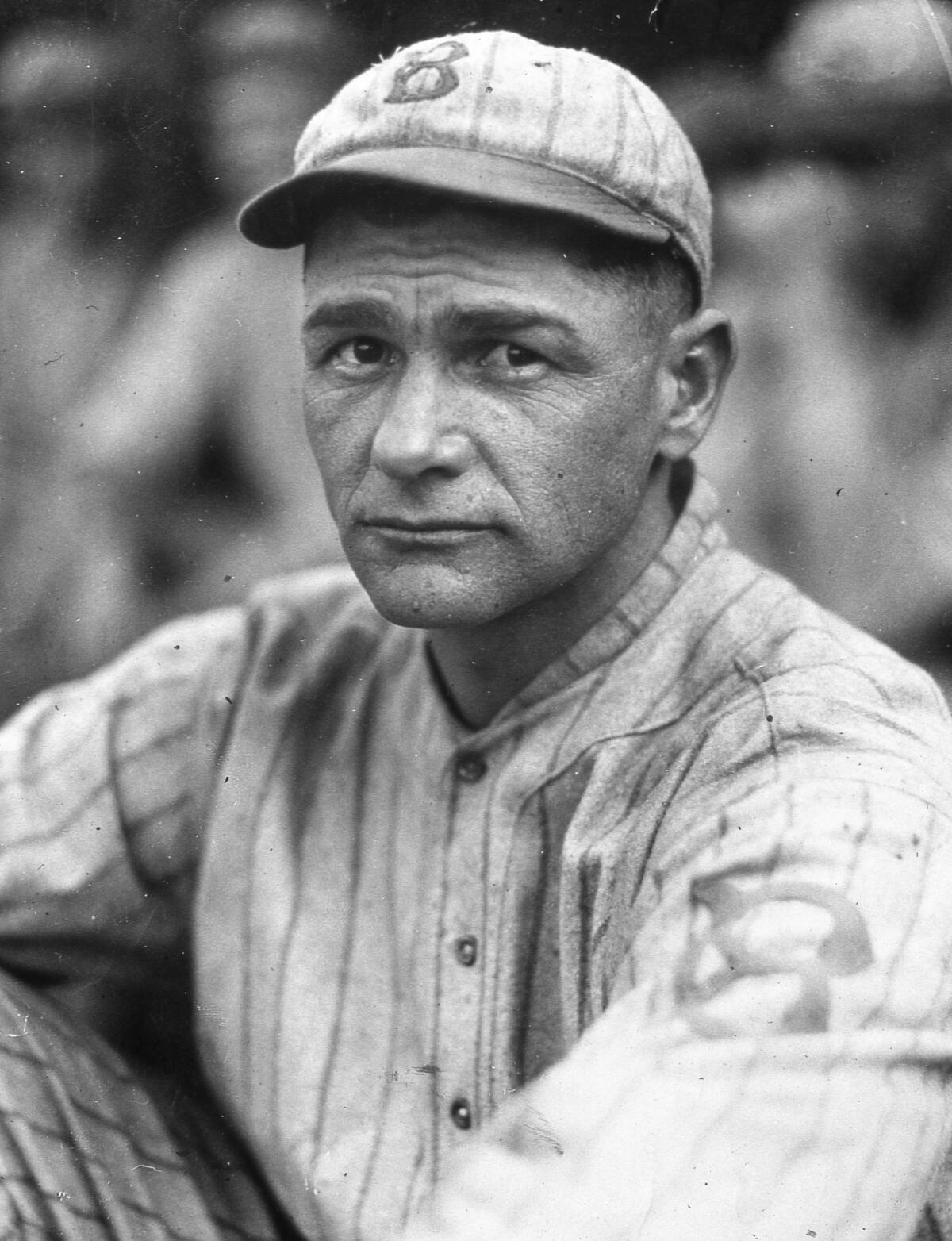
Game 7
Oct. 3
Cleveland Indians 3, Brooklyn Robins 0
There was a brief period when the World Series was a best-of-nine. In their only appearance in such a Series, the Dodgers were eliminated in Game 7, their third consecutive loss. These were the dying days of the Dead Ball Era; during those last three games, Brooklyn did not score more than one run in a game.
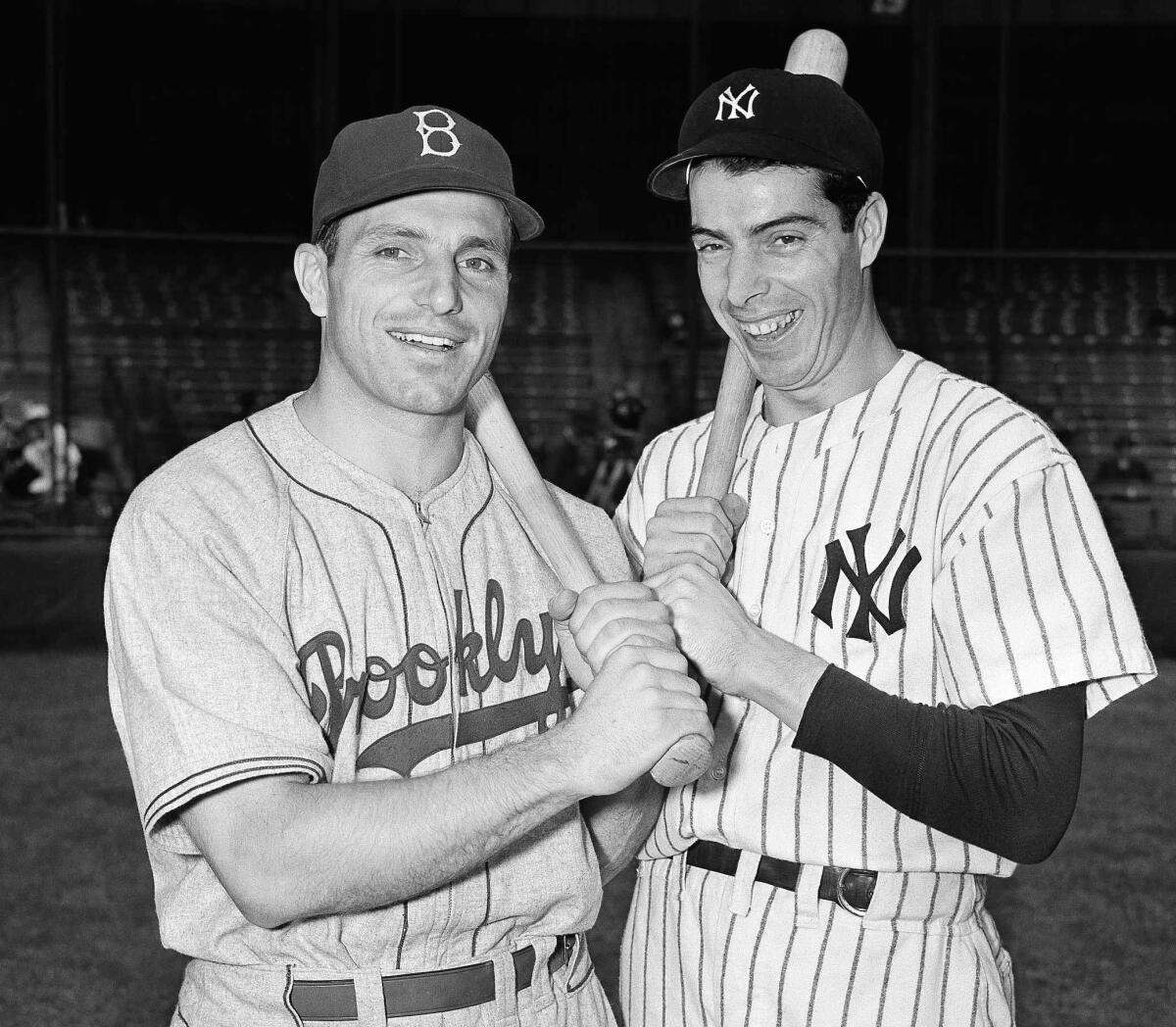
Game 5
Oct. 6
New York Yankees 3, Brooklyn Dodgers 1
In their first World Series as the Dodgers — they were the Brooklyn Robins in their two previous Fall Classic appearances, both losses—Brooklyn was held under three runs for the third time in five games. A Pete Reiser RBI single was the only scoring the Dodgers could muster off Tiny Bonham. This would be the first of 11 World Series meetings between the two franchises.
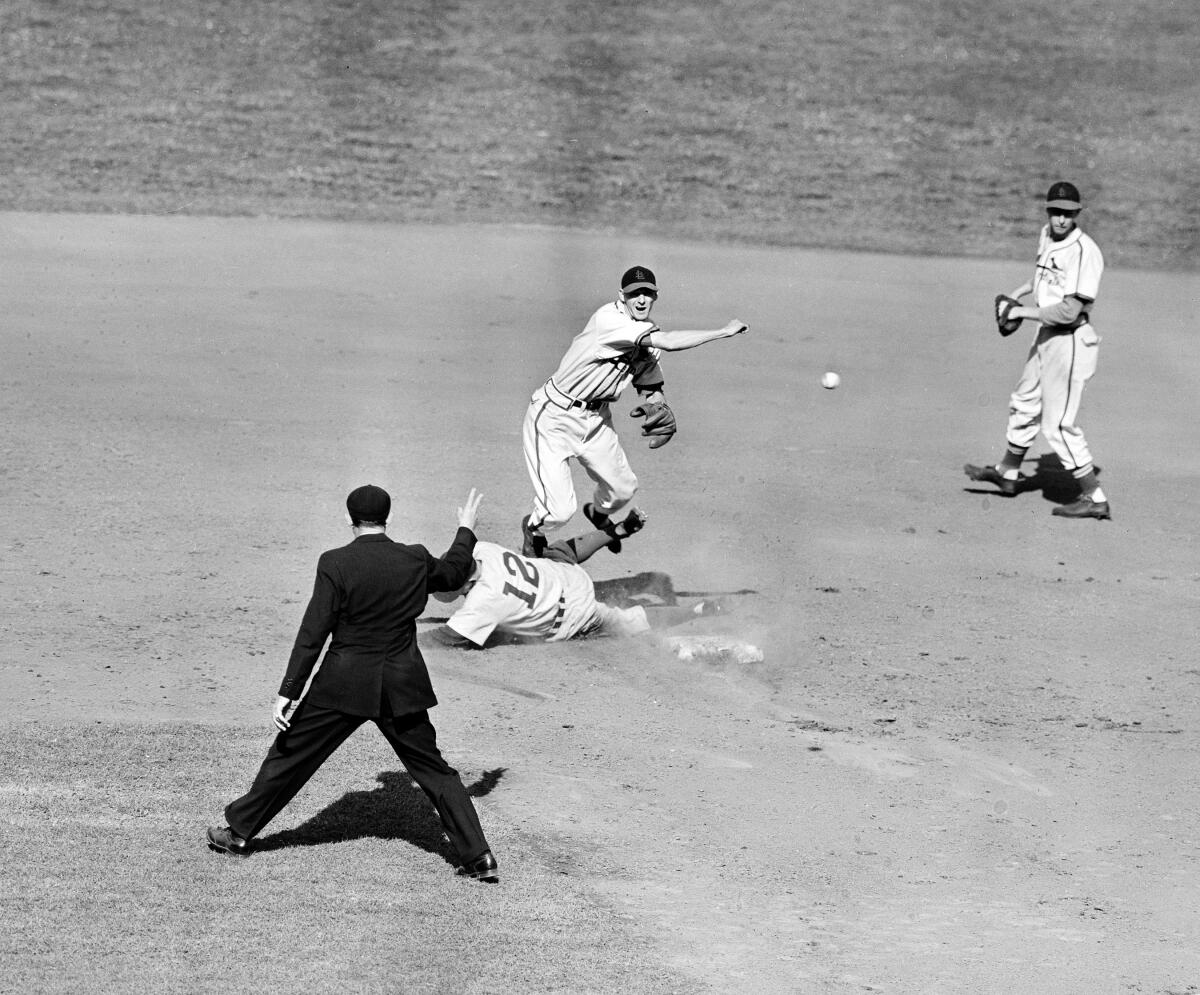
Game 2
Oct. 3
St. Louis Cardinals 8, Brooklyn Dodgers 4
Until 1969, teams knotted at the end of the regular season played a best-of-three tiebreaker series to determine who went to the World Series. In the first of four tiebreaker series the Dodgers would play over the next 16 years, the Cardinals largely silenced the Dodgers’ bats until the bottom of the ninth inning of Game 2 , when the Brooklyn scored three of the six runs it would score in the two games. By that time, the Cardinals led 8-1.
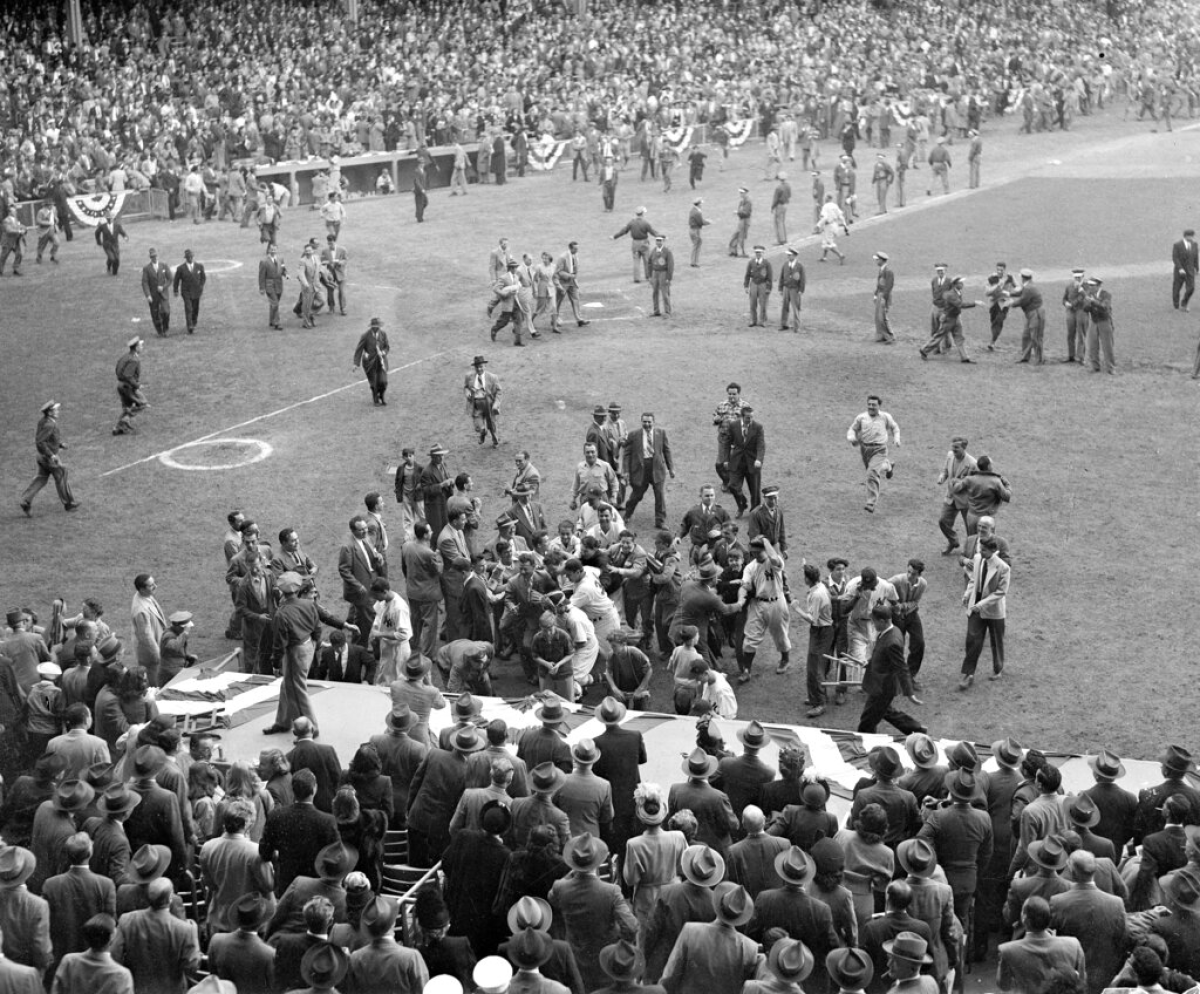
Games 6-7
Oct. 5-6
Brooklyn Dodgers 8, New York Yankees 6
Yankees 5, Dodgers 2
This was the first of six World Series meetings over the next decade between two of the game’s most storied franchises and it was indeed a Fall Classic. Down 3-2 in the Series and headed back to Yankee Stadium, the Dodgers scored four runs in the top of the sixth of Game 6, capped by a Pee Wee Reese two-run single, to erase a 5-4 New York lead. Neither starting pitcher got past the fourth inning in Game 7, but five scoreless innings in relief by the Yankees’ Joe Page was the difference. The Series was also notable for the presence of Jackie Robinson, who that season broke baseball’s color barrier. In the first of five World Series appearances, Robinson went seven for 27 with two stolen bases.
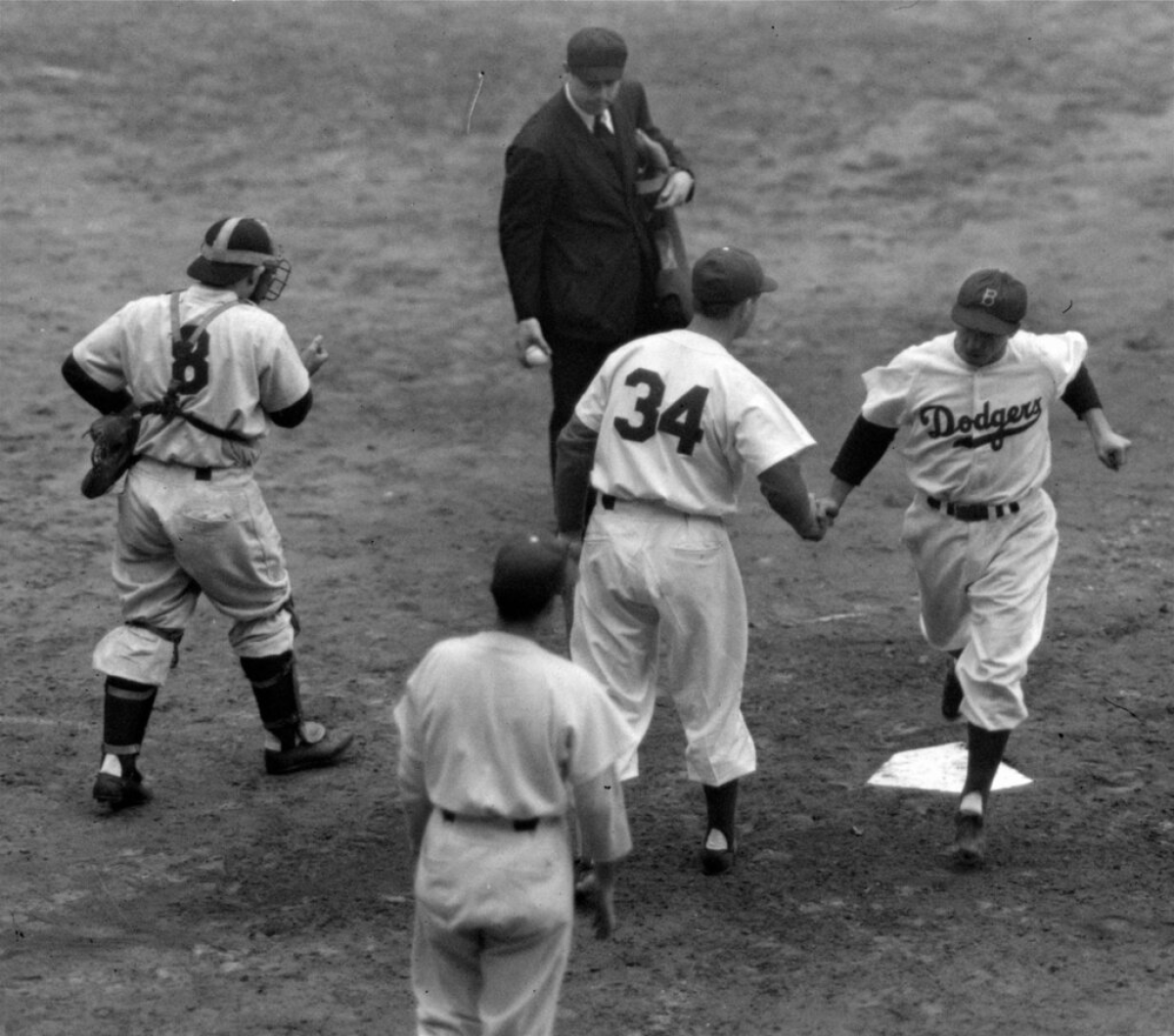
Game 5
Oct. 9
New York Yankees 10, Brooklyn Dodgers 6
The Yankees jumped out to a 10-1 lead by the fifth inning off the Dodgers’ trio of Rex Barney, Jack Banta and Carl Erskine. Brooklyn made it interesting with four runs in the sixth to close the gap to four, but did not score again.
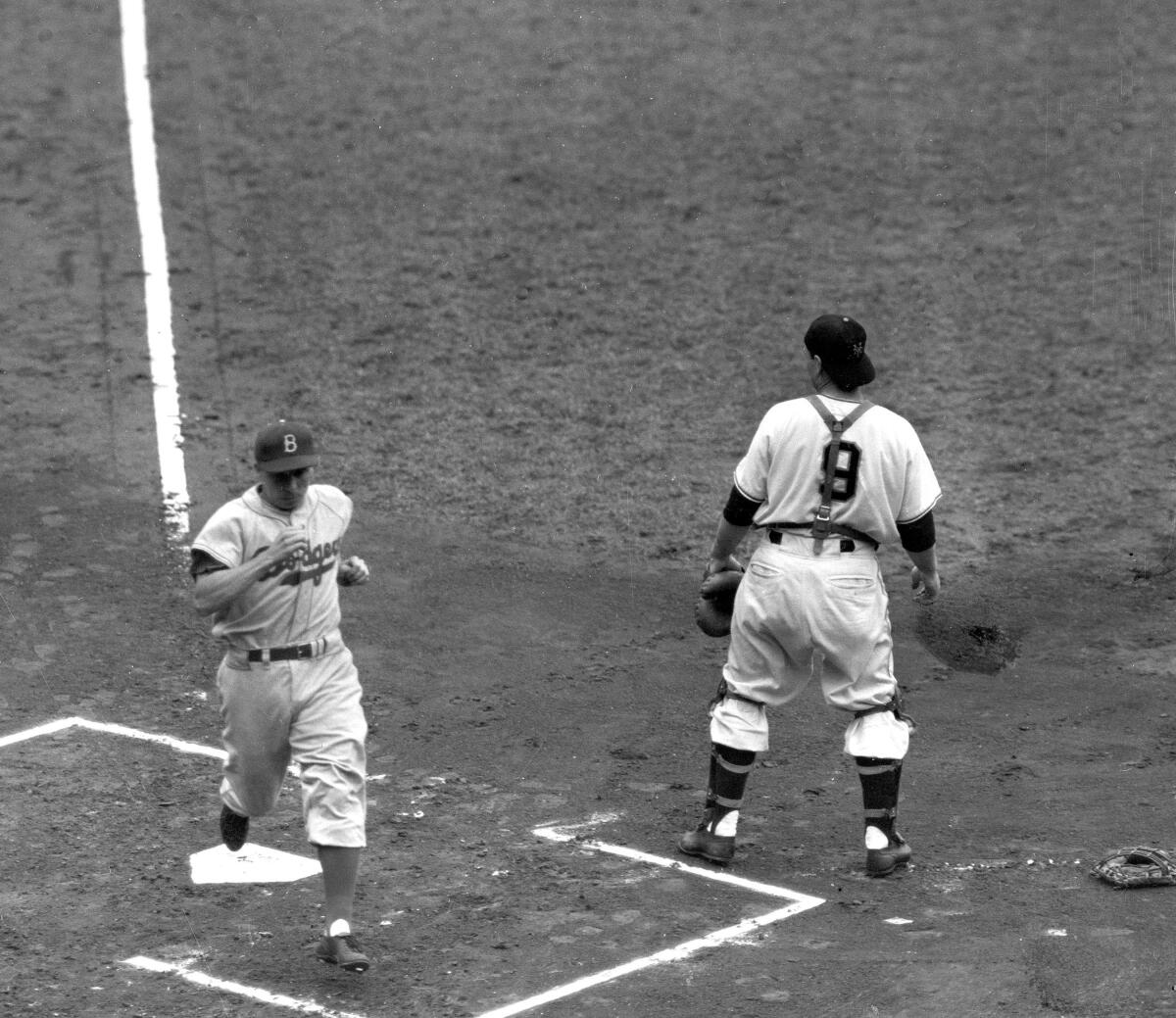
Games 2-3
Oct. 2-3
Brooklyn Dodgers 10, New York Giants 0
Giants 5, Dodgers 4
Small forests have been felled in the telling and re-telling of the Most Famous Tiebreaker Game of Them All (Sorry, ’78 Red Sox-Yankees). After the Dodgers smoked the Giants 10-0 in Game 2, they took a 4-1 lead into the bottom of the ninth inning of Game 3. Whitey Lockman’s RBI double chased Dodgers starter Don Newcombe, who was replaced by Ralph Branca with the Dodgers still holding a 4-2 lead. The first batter he faced was Bobby Thomson (who in Game 1 had hit a much-less famous game-deciding homer off Branca). You know the rest.
Watch tiebreaker series highlights (if you must) here.
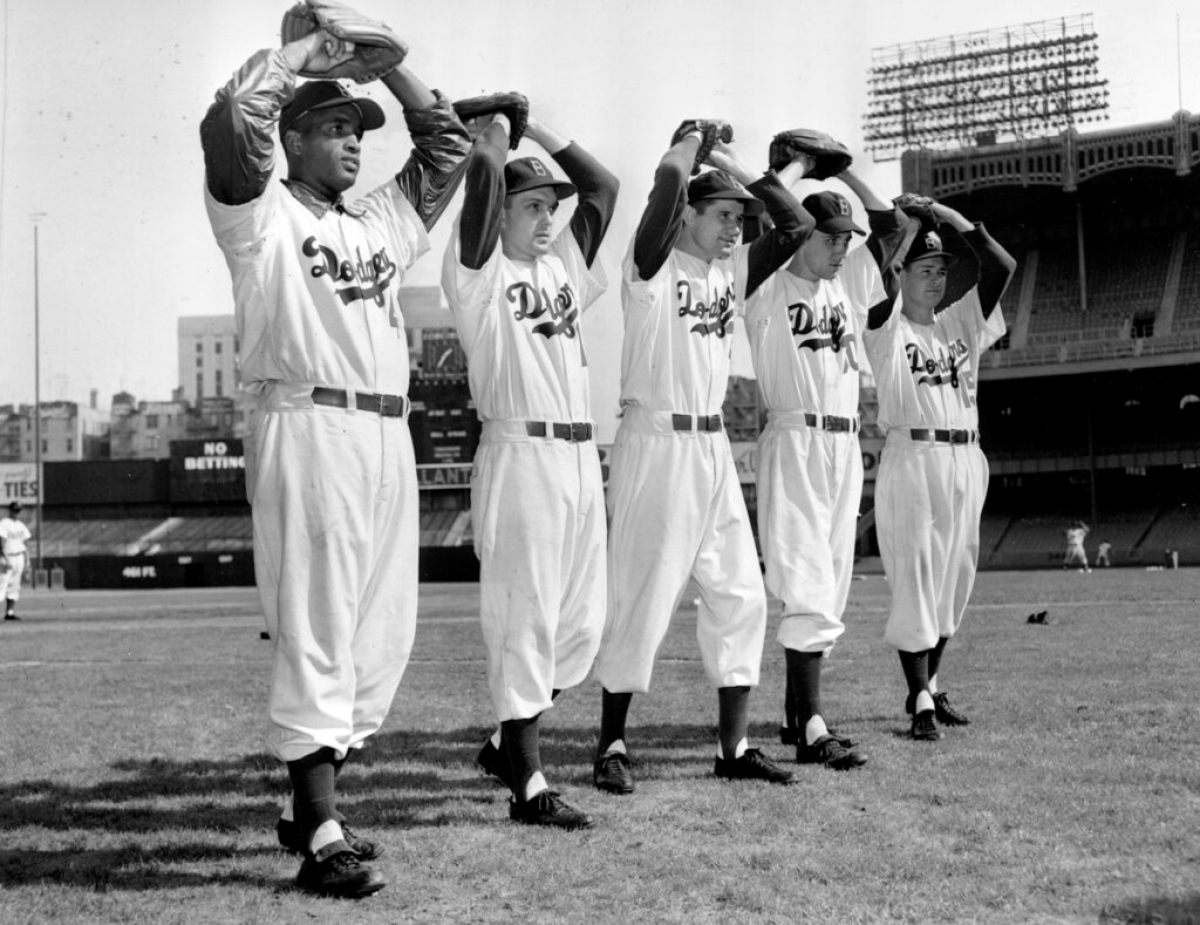
Games 6-7
Oct. 6-7
New York Yankees 3, Brooklyn Dodgers 2
Yankees 4, Dodgers 2
The first of three seven-game World Series between the Dodgers and Yankees in the ‘50s. Up 3-2 in the Series and returning home to Ebbets Field for Games 6 and 7, Mickey Mantle hit solo homers that were the difference in each game, spoiling an epic performance from Duke Snider, who hit a then-record four homers in the Series.
Watch Game 7 here.
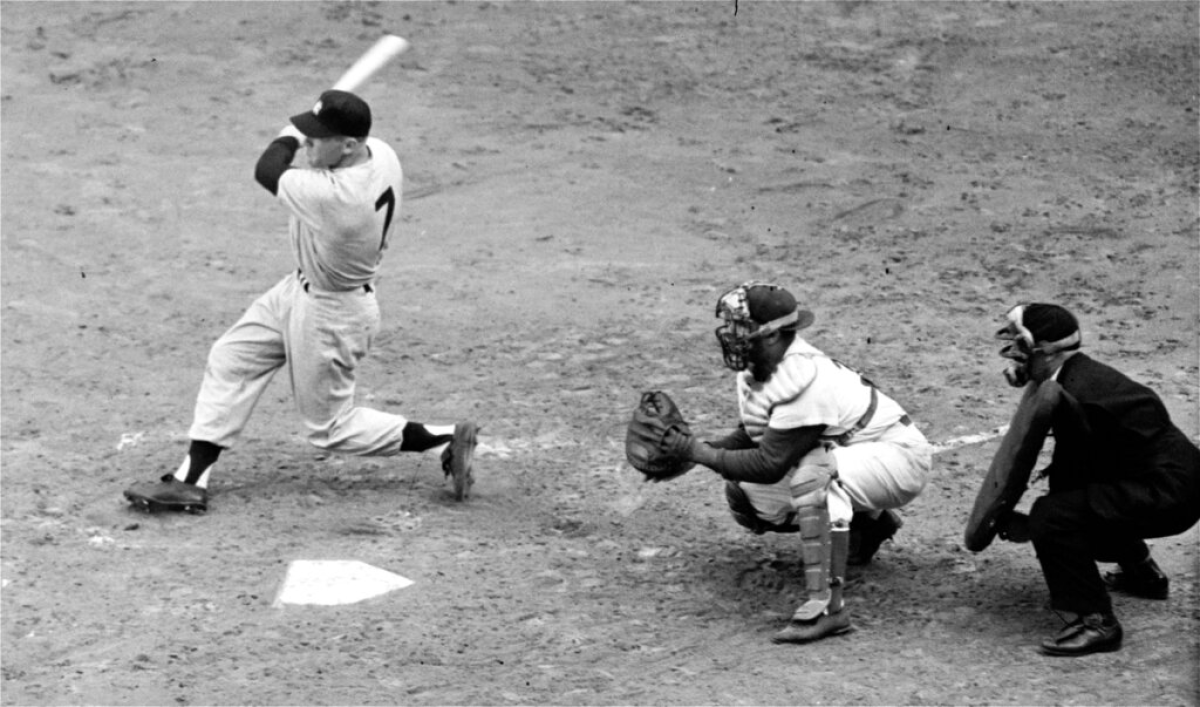
Game 6
Oct. 5
New York Yankees 4, Brooklyn Dodgers 3
Down 3-2 in the Series and 3-1 in the top of the ninth inning of Game 6, the Dodgers tied the game at three on a two-run homer by Carl Furillo off Allie Reynolds. The Yankees, however, won in the bottom of the ninth on a Billy Martin single that drove home Hank Bauer.
Watch Series highlights here.
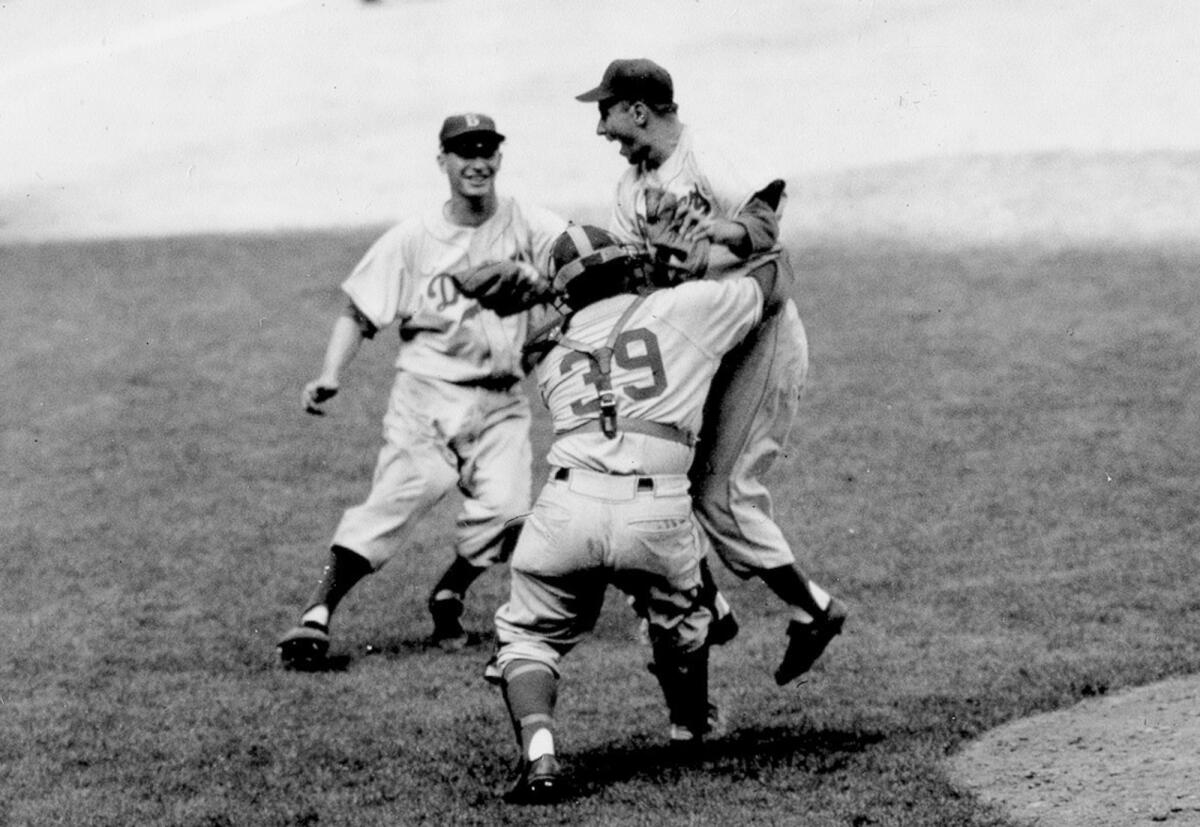
Games 6-7
Oct. 3-4
New York Yankees 5, Brooklyn Dodgers 1
Dodgers 2, Yankees 0
In the first of consecutive World Series between the Dodgers and Yankees that went the distance, the Bronx Bombers took the first two games in Yankee Stadium—Game 1 famously included Jackie Robinson’s straight steal of home in New York’s 6-5 victory—before the Dodgers won the next three at Ebbets Field. The Yankees won Game 6 behind Whitey Ford, who got all the run support he needed in the first, when New York scored all five of its runs. Johnny Podres pitched a complete-game, eight-hit shutout in Game 7 that delivered the Dodgers their first World Series championship and Podres, at year’s end, Sports Illustrated’s Sportsman of the Year award.
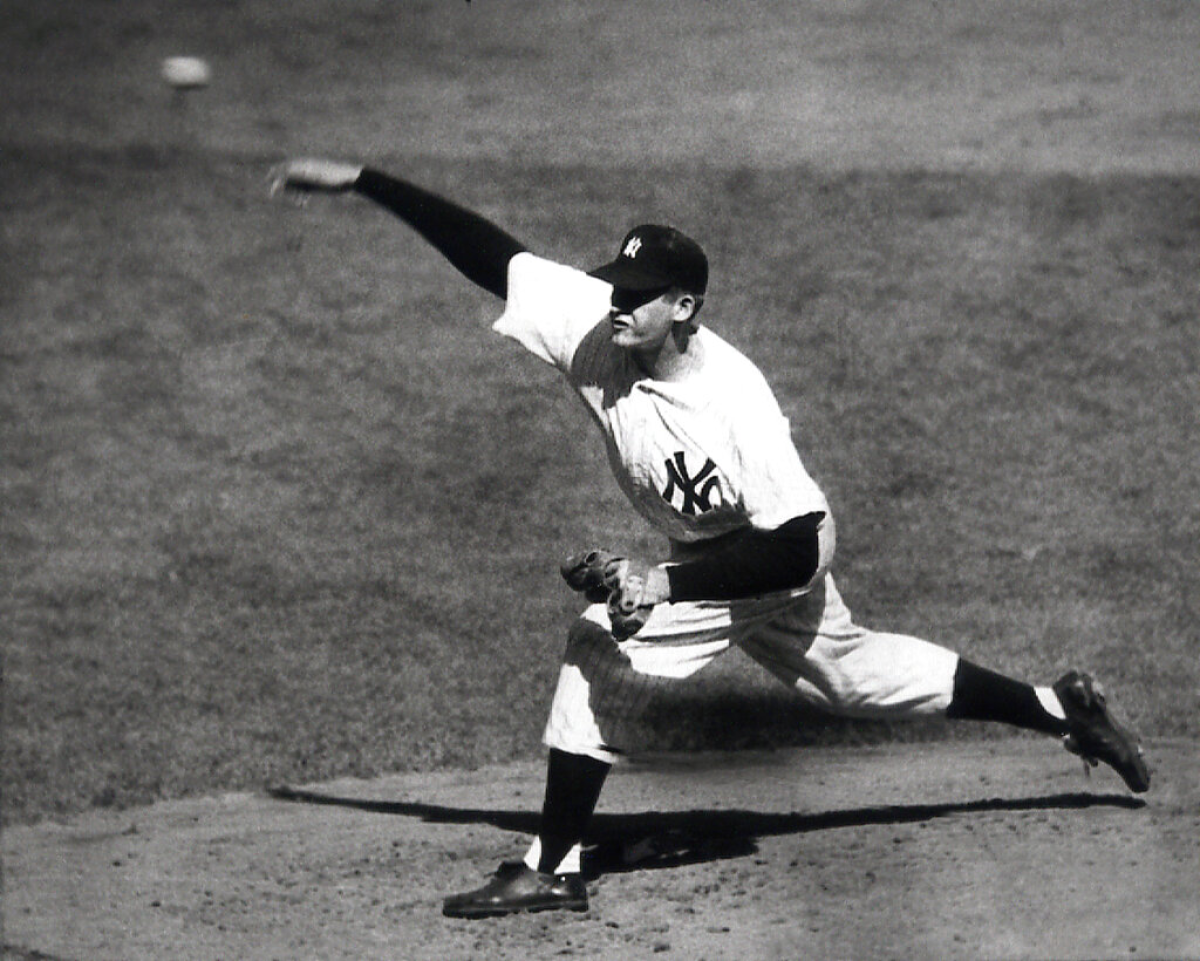
Games 6-7
Oct. 8-9
Brooklyn Dodgers 1, New York Yankees 0
Yankees 9, Dodgers 0
This seven-game classic will be best remembered not for the two elimination games, but rather for the game that preceded them. In Game 5 Don Larsen spun the first, and still only, perfect game in World Series history. The Dodgers rebounded in Game 6 behind a 10-inning shutout by Clem Labine, who got the win when Jackie Robinson drove home Jim Gilliam with a walkoff single. The Yankees, however, hit four home runs, including two by Series MYP Yogi Berra, in the Game 7 rout.
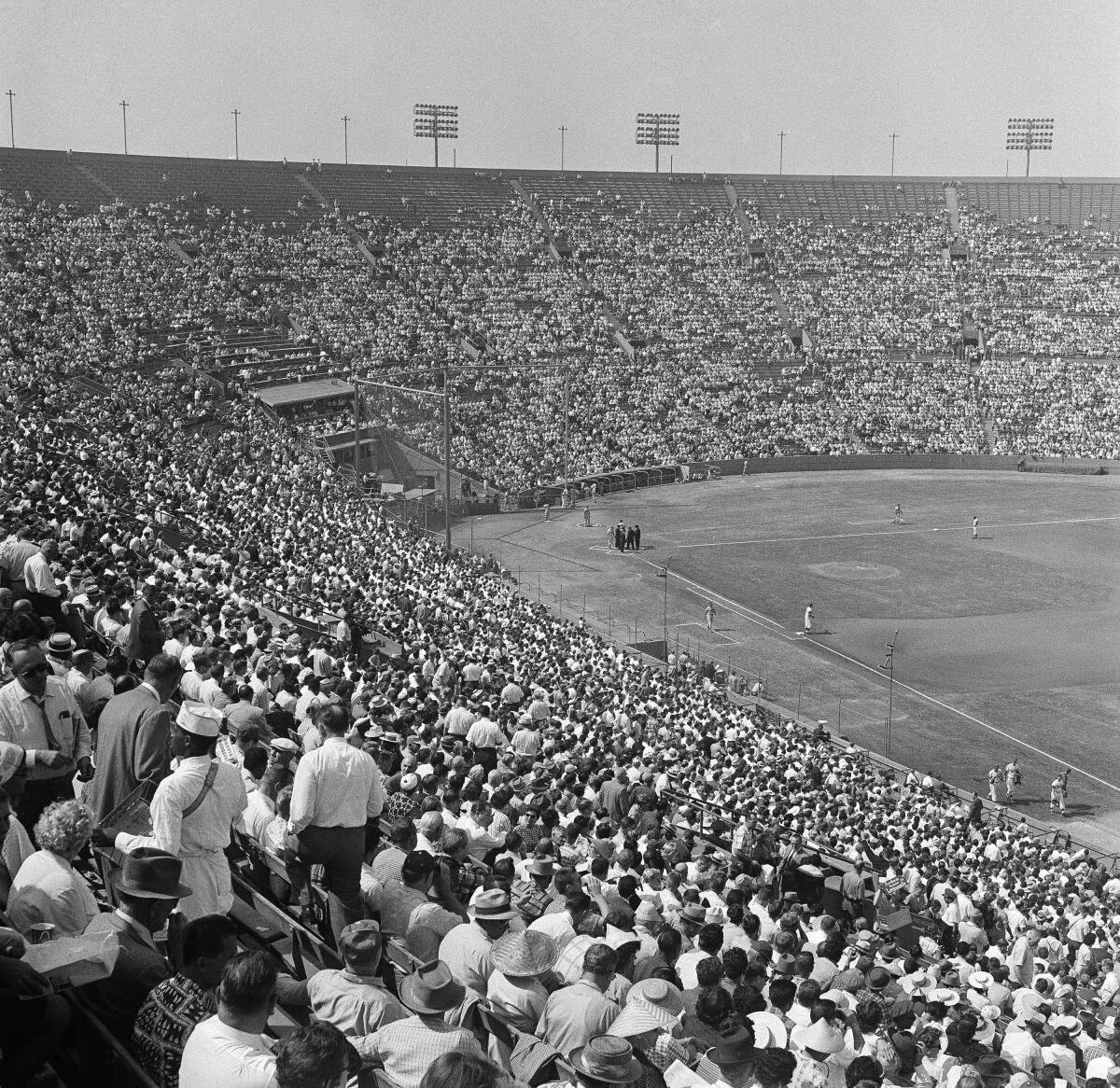
Game 2
Sept. 29
Los Angeles Dodgers 6, Milwaukee Braves 5 (12)
Trailing 5-2 in the bottom of the ninth, the Dodgers forced extra innings with five singles, capped by Maury Wills’ game-tying hit. In the 12th Carl Furillo reached on an infield single and Gil Hodges raced home with the winning run on Braves shortstop Felix Mantilla’s errant throw to send the Dodgers to their first World Series in Los Angeles.
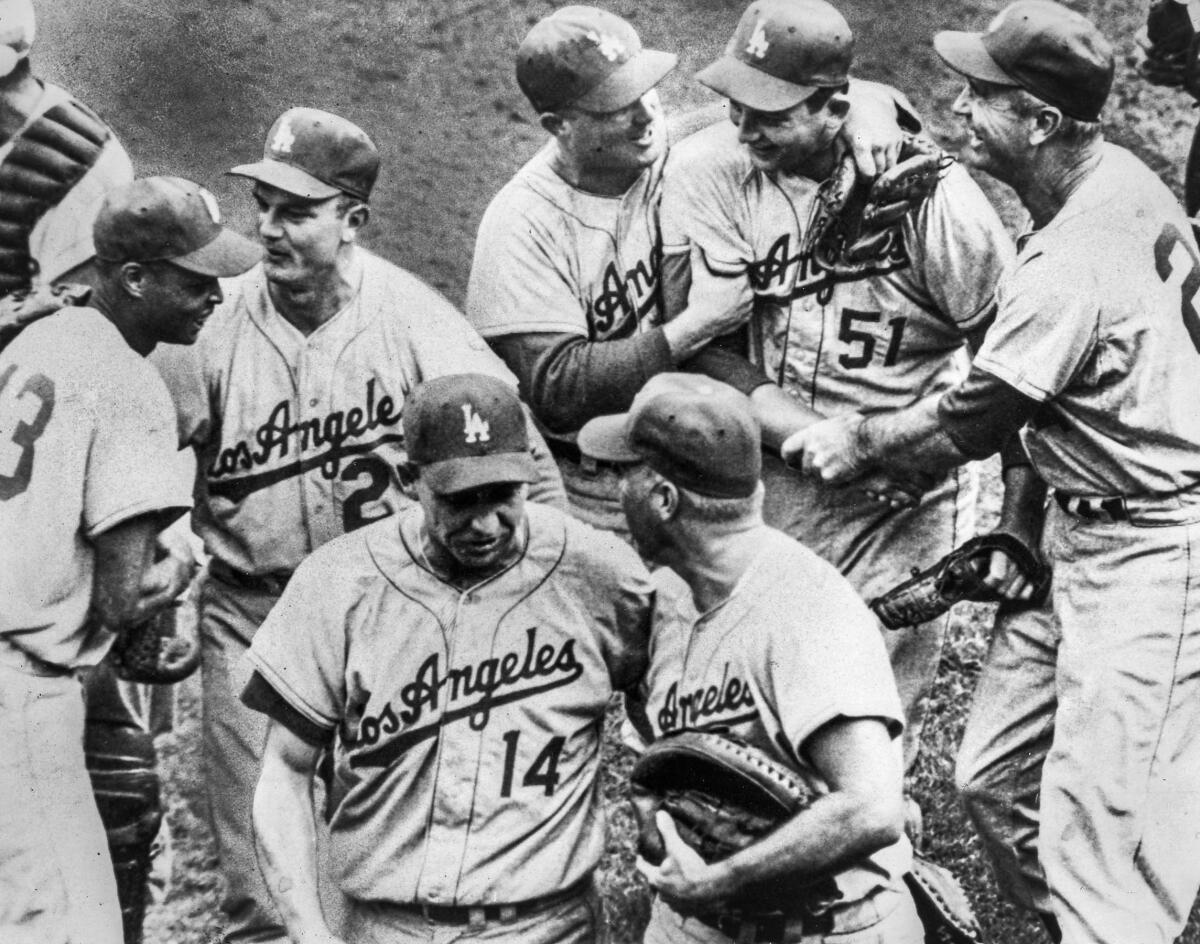
Games 5-6
Oct. 6/8
Chicago White Sox 1, Dodgers 0
Dodgers 9, White Sox 3
The White Sox fought off elimination with a Game 5 shutout at the Coliseum before the Dodgers clinched two days later at Comiskey Park. Los Angeles broke open the clincher with a sixth-run fourth inning to take an 8-0 lead. After Dodgers starter Johnny Podres gave back three runs in the bottom of the inning, Larry Sherry pitched 5 2/3 innings of shutout relief to close out the Dodgers first World Series championship in Los Angeles.
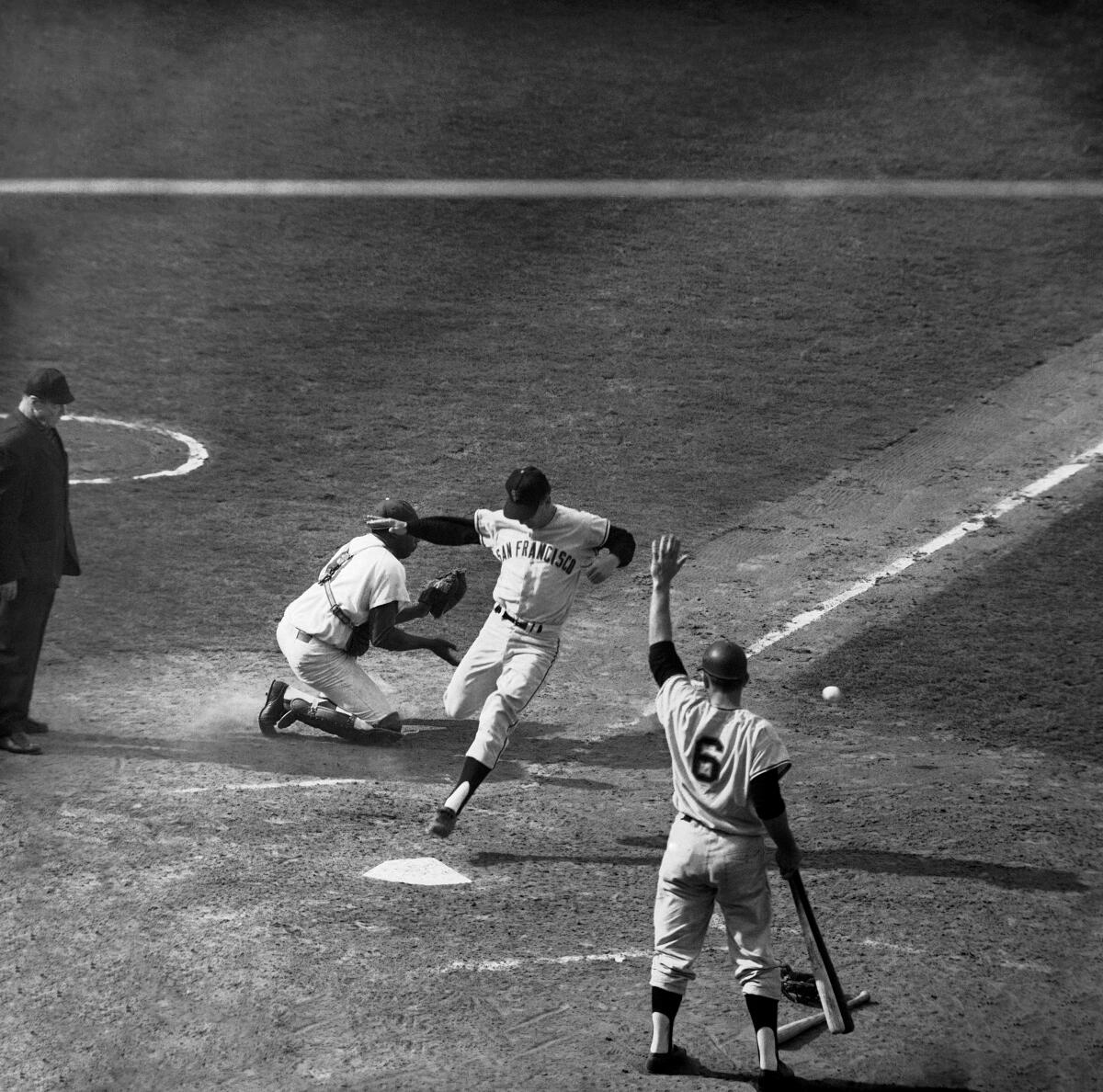
Games 2-3
Oct. 2-3
Dodgers 8, San Francisco Giants 7
Giants 6, Dodgers 4
Now both on the West Coast, the two archrivals reprised the drama of their 1951 tiebreaker series with another classic. Again in the clincher, the Dodgers — who had forced Game 3 with a walk-off victory on a Ron Fairly sacrifice fly the previous day — held a ninth-inning lead, but were unable to hold on. Four walks in the top of the ninth, including the go-ahead, bases-loaded walk to Jim Davenport, was Los Angeles’s undoing.
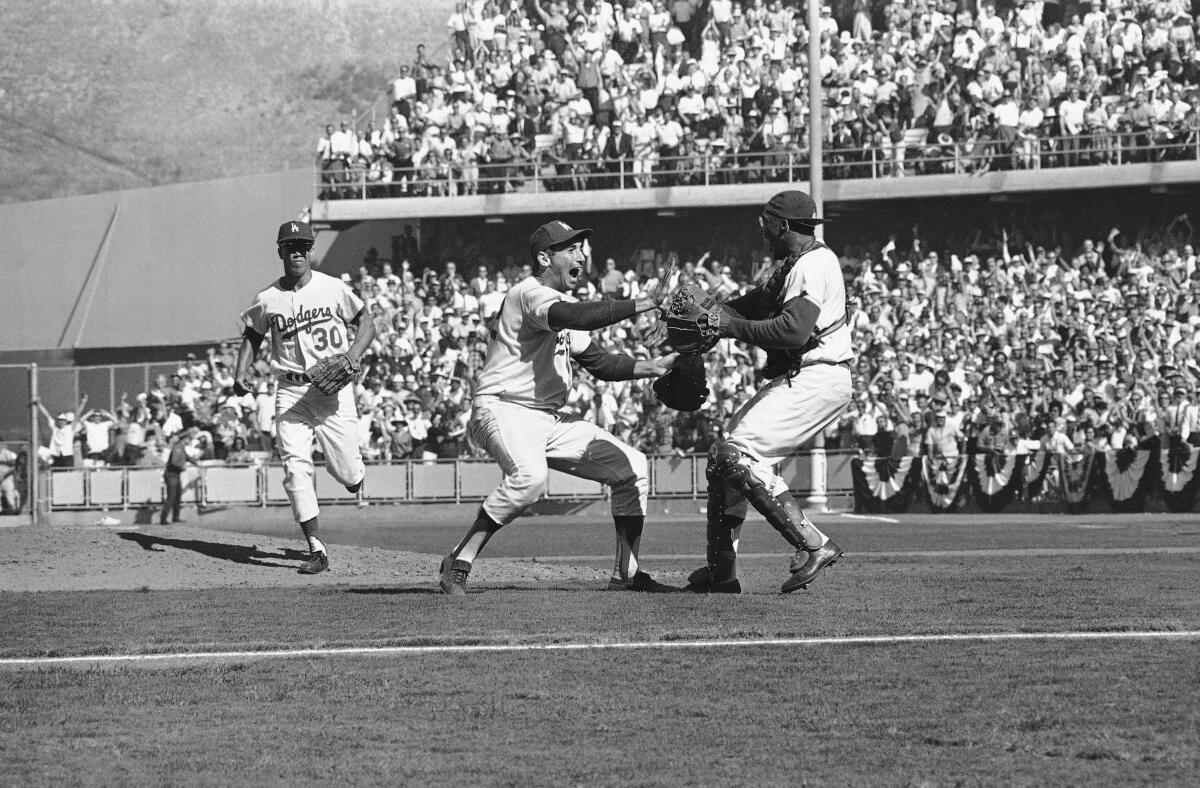
Game 4
Oct. 6
Dodgers 2, New York Yankees 1
In the first World Series meeting between the teams since the Dodgers moved West, Los Angeles closed out a sweep of the Yankees behind Sandy Koufax’s second complete-game gem of the Fall Classic. Tied 1-1 in the seventh, Los Angeles took the lead on a bizarre sequence: Jim Gilliam led off with a groundball that Yankees third baseman Clete Boyer scooped up and made an accurate throw to first that Joe Pepitone lost sight of. Gilliam went all the way to third on the play and scored the Series-winner on a Willie Davis sacrifice fly. Koufax, who struck out 15 in a Game 1 duel with Whitey Ford, went the distance again, whiffing eight.
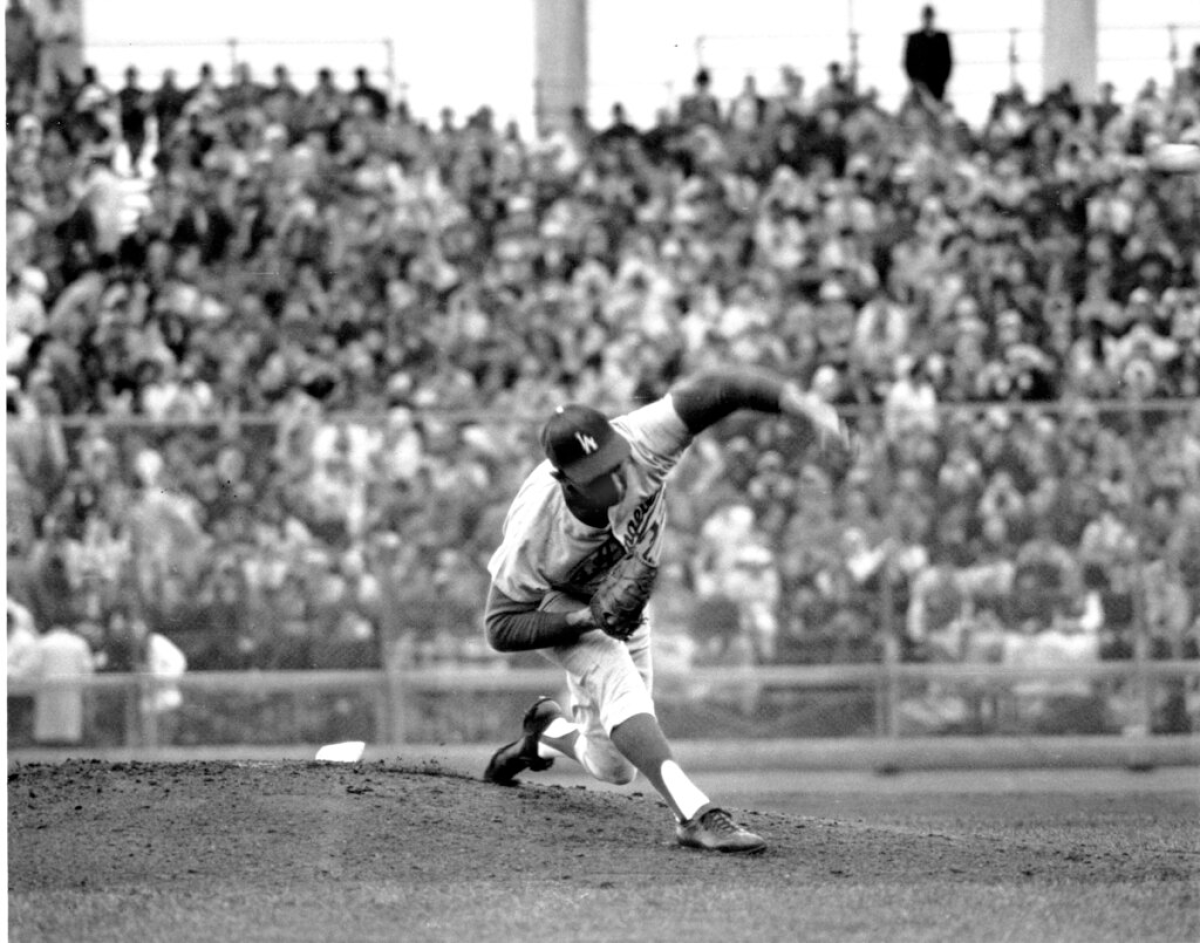
Games 6-7
Oct. 15-16
Minnesota Twins 5, Dodgers 1
Dodgers 2, Twins 0
In what would be his penultimate postseason, Sandy Koufax, making his third start of the Series, struck out 10 in a complete-game, three-hit shutout. The Dodgers scored both of their runs in the fourth inning, on a Lou Johnson solo homer and a Wes Parker triple. Minnesota had forced a seventh game the day before, taking a 5-0 lead off Claude Osteen and Howie Reed. Koufax was named the Series MVP for the second time in three years, yielding a single earned run in 24 innings and striking out 29.
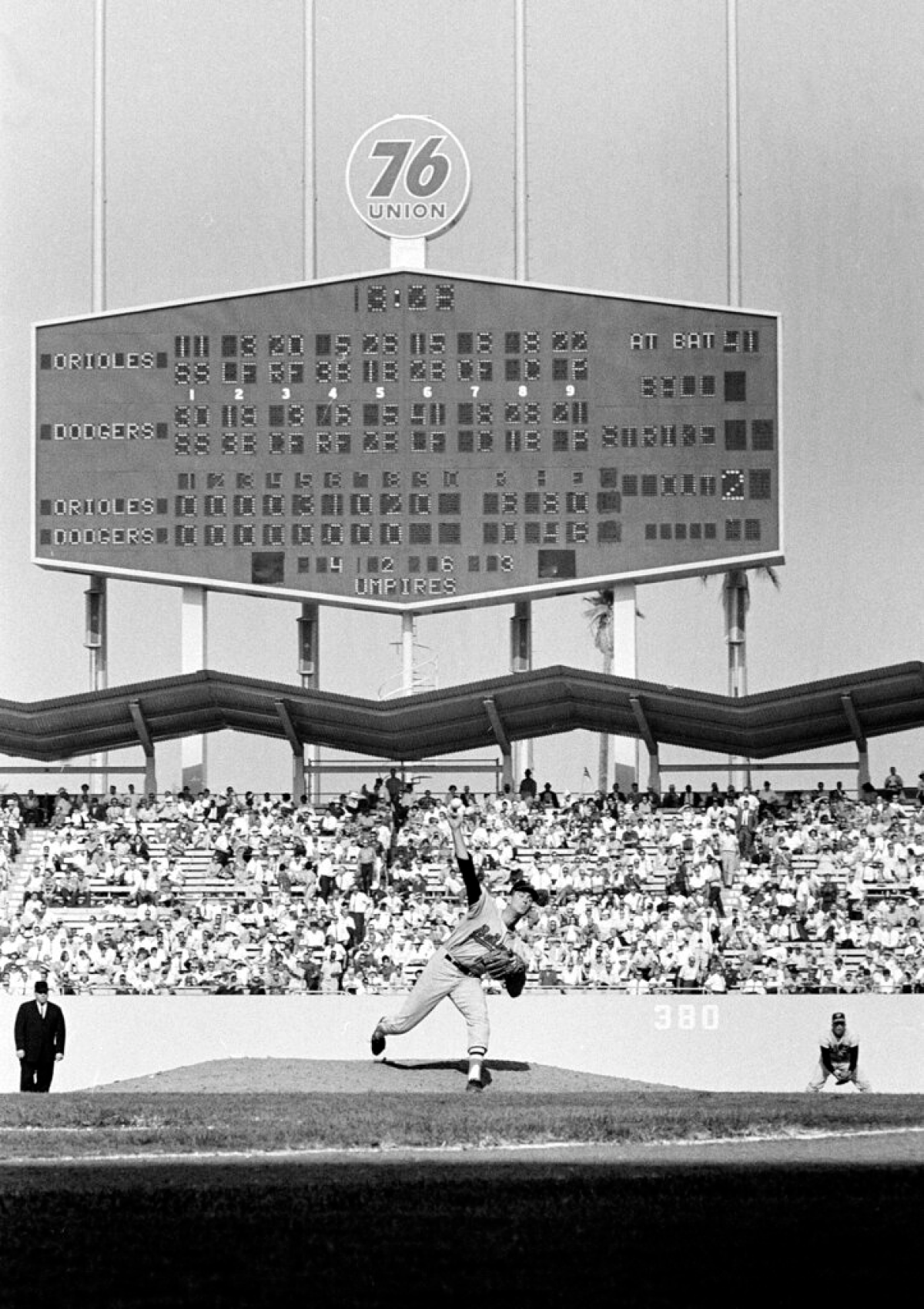
Game 4
Oct. 9
Baltimore Orioles 1, Dodgers 0
Neither Game 1 starter, Don Drysdale nor Dave McNally, made it through the third inning. Both, however, were sublime in Game 4, each going the distance. A fourth-inning Frank Robinson home run was the difference for the Orioles, who turned in one of the most dominant pitching performances in Series history. The Dodgers did not score a run after the third inning of the opener, and Baltimore did not go to the bullpen in the final three games of the Series.
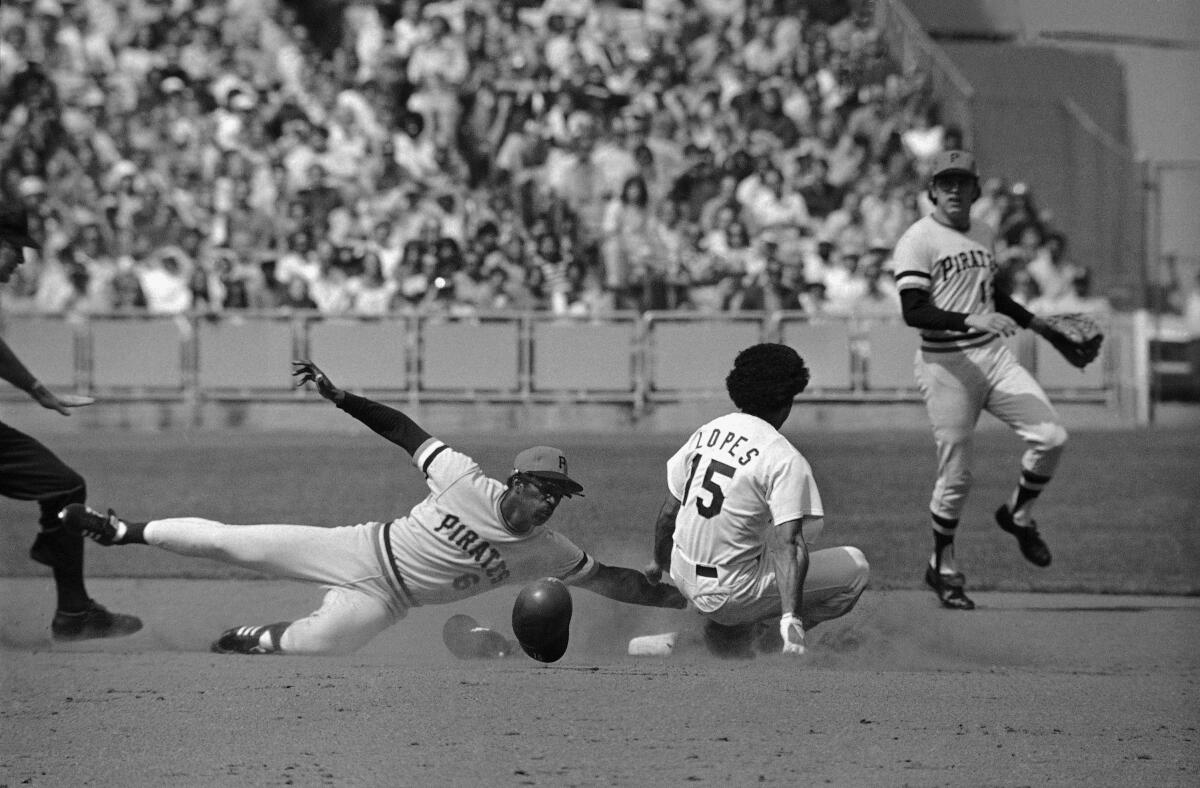
Games 3-4
Oct. 8-9
Pirates 7, Dodgers 0
Dodgers 12, Pirates 1
After winning Games 1 and of 2 of the NLCS in Pittsburgh, Bruce Kison shut out the Dodgers in Game 3 at Dodger Stadium, clearing the way for the signature postseason performance of Steve Garvey’s Los Angeles career. The first baseman went four for five in the clincher with two two-run run homers (the first off future teammate Jerry Reuss). Don Sutton locked it down with eight innings of three-hit ball. Garvey was named the NLCS MVP and would go on to win the NL MVP.
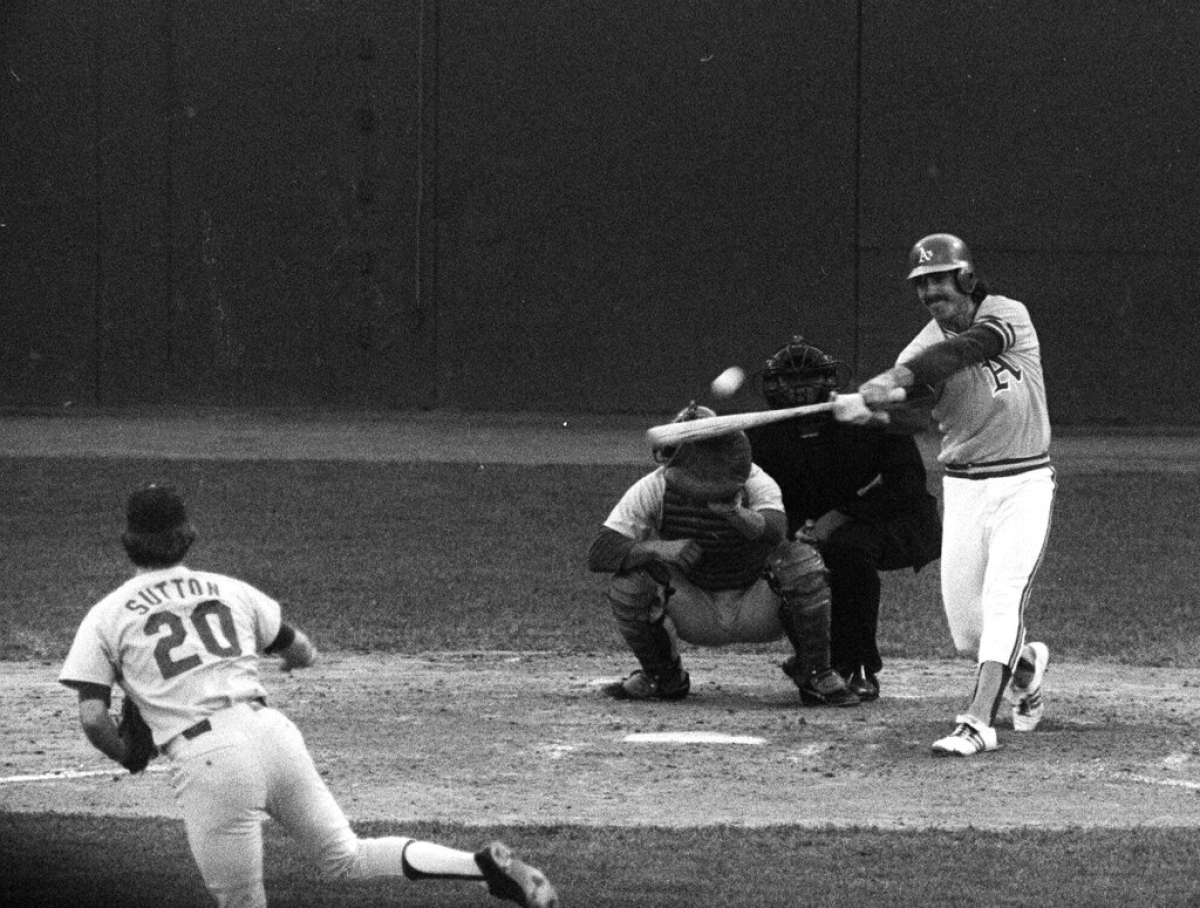
Game 5
Oct. 17
Oakland A’s 3, Dodgers 2
The Dodgers’ first World Series appearance in eight years was closer than the 4-1 Series loss suggests. All but one of the games was decided by a single run, including the finale. The Dodgers had tied the game 2-2 in the sixth on a Jimmy Wynn sacrifice fly and a Steve Garvey single, but Oakland scored the decisive run on a Joe Rudi homer to lead off the seventh. For the A’s, it was their third straight World Series championship.
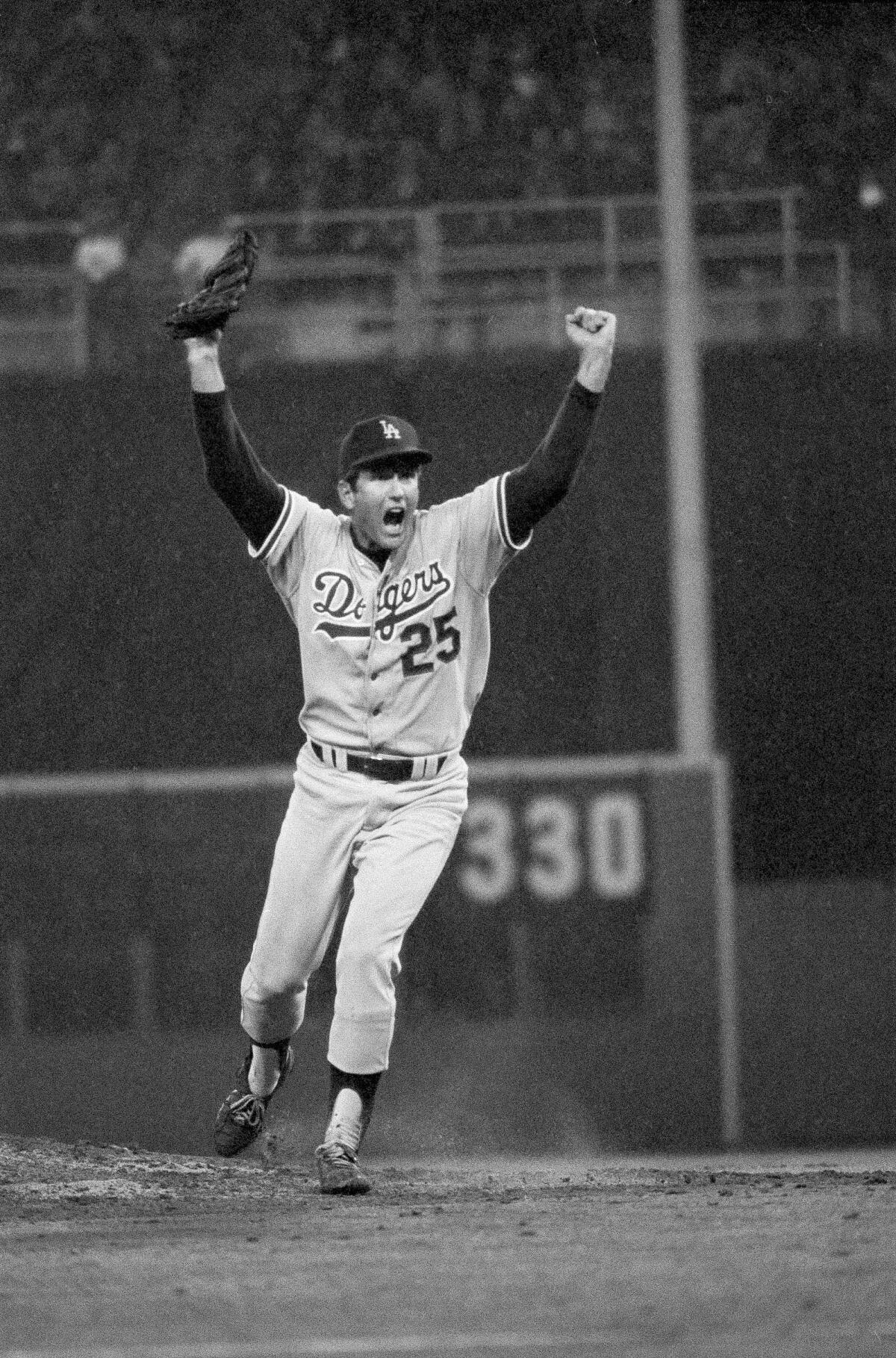
Game 4
Oct. 8
Dodgers 4, Philadelphia Phillies 1
A first-inning Dusty Baker homer off Steve Carlton was all the Dodgers would need in punching their ticket to the World Series. The real drama had occurred 24 hours earlier when it appeared the Phillies would take a 2-1 series lead. Game 3 went from being the Burt Hooton Game (knocked out in the second inning when he walked four straight batters, three with the bases loaded) to the Vic Davalillo-Manny Mota Game.
Down 5-3 with nobody on and two outs in the top of the ninth, pinch-hitter Davalillo reached on a bunt single and came home on pinch-hitter Mota’s double that was bungled by Greg Luzinski, allowing Mota to reach third. Davey Lopes reached on an infield single to tie the game and moved into scoring position on an errant pickoff throw before scoring the game-winning run on a Bill Russell single to center.
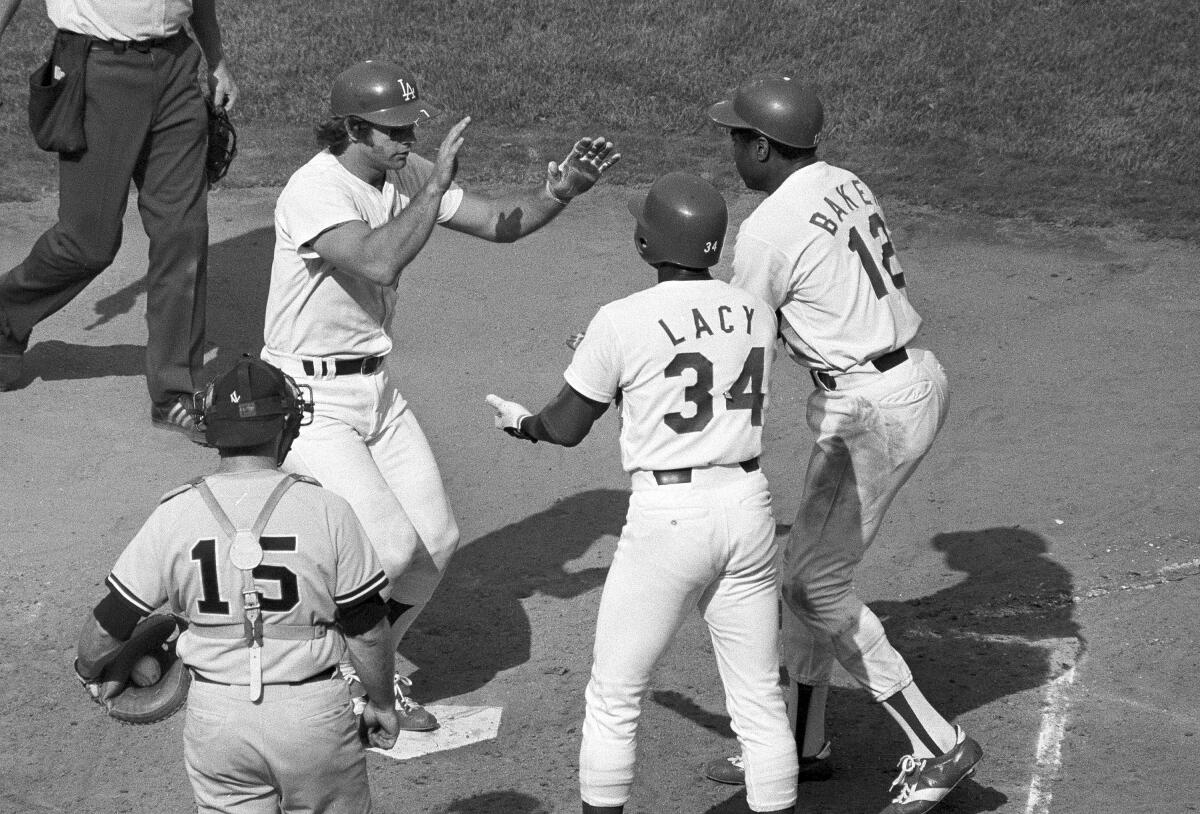
Game 5
Oct. 16
Dodgers 10, New York Yankees 4
After losing their first two home games of the World Series, the Dodgers fended off elimination with an easy win behind Don Sutton’s complete game. Steve Yeager broke open a 1-0 game with a fourth-inning grand slam and L.A. was up 10-0 by the end of the sixth.

Game 6
Oct. 18
New York Yankees 8, Dodgers 4
The performance that would give Reggie Jackson the sobriquet “Mr. October” (and America the Reggie bar): On the first pitch against three different pitchers (Burt Hooton, Elias Sosa, Charlie Hough) Jackson hit home runs to give the Yankees their first World Series title in 15 years and fifth, in seven meetings, against the Dodgers.
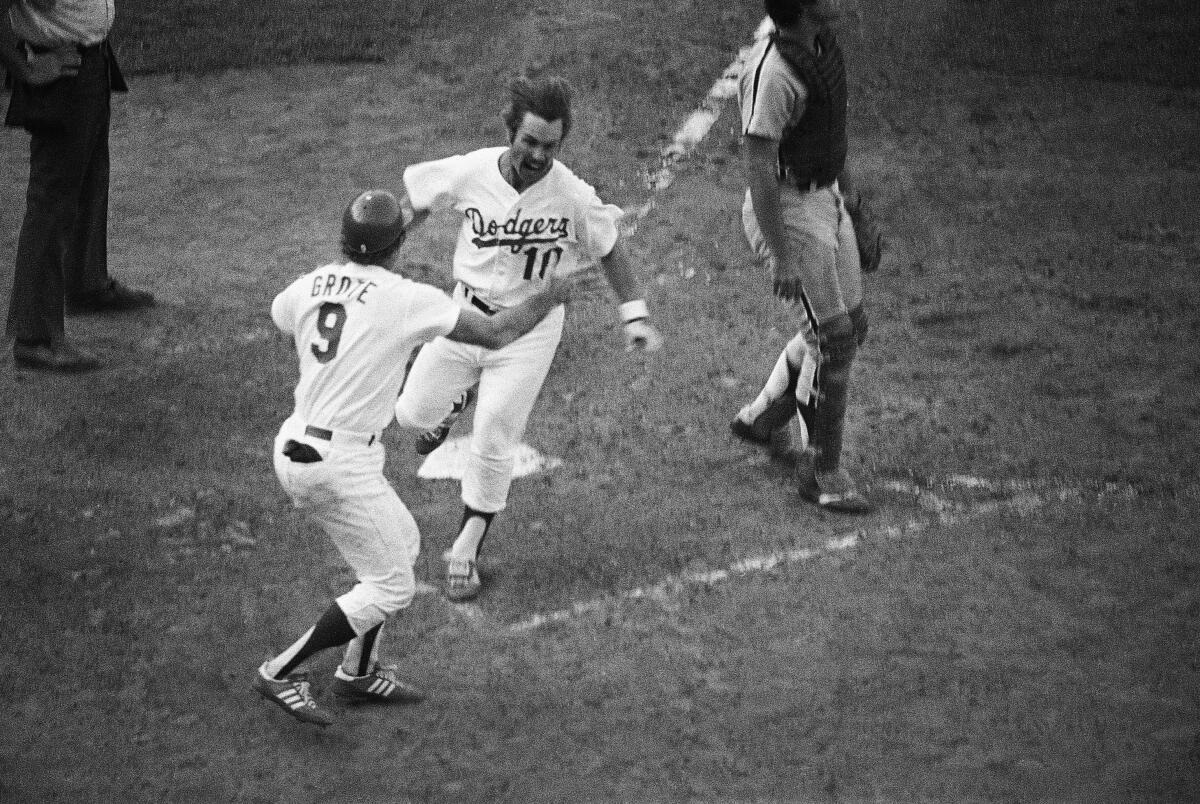
Games 3-4
Oct. 6-7
Philadelphia Phillies 9, Dodgers 4
Dodgers 4, Phillies 3 (11)
The first three games of the second consecutive NLCS between the two teams had been decided by at least four runs, with the Phillies fending off elimination in a Game 3 rout. Game 4 brought some drama. After the first two Dodgers were retired in the bottom of the 10th, Ron Cey walked and reached second when Garry Maddox, one of game’s premier center fielders, muffed a Dusty Baker fly ball. Bill Russell followed with the walk-off single to advance Los Angeles to the World Series against the Yankees for a second straight year. Reprising his 1974 NLCS heroics, Steve Garvey hit four homers to win the series MVP.
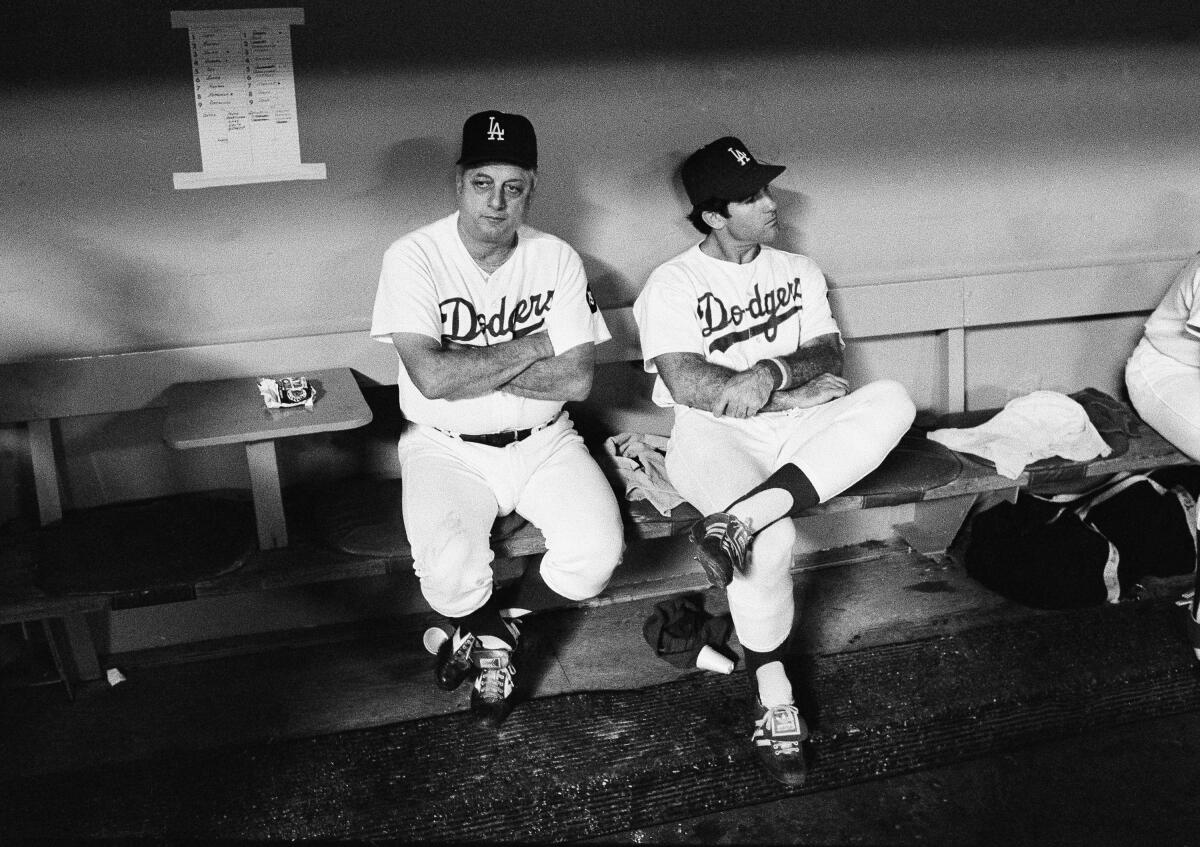
Game 6
Oct. 17
New York Yankees 7, Dodgers 2
The Dodgers jumped out to a 2-0 Series lead at home before losing the next three in New York (Frank Pulli, curse his name). Back at Dodger Stadium for Game 6, Los Angeles kept it close for five innings before light-hitting middle infielders Brian Doyle and Bucky Dent hit consecutive RBI singles to give New York a 5-2 lead. Reggie Jackson added a two-home run homer off Bob Welch in the seventh to blow it open.
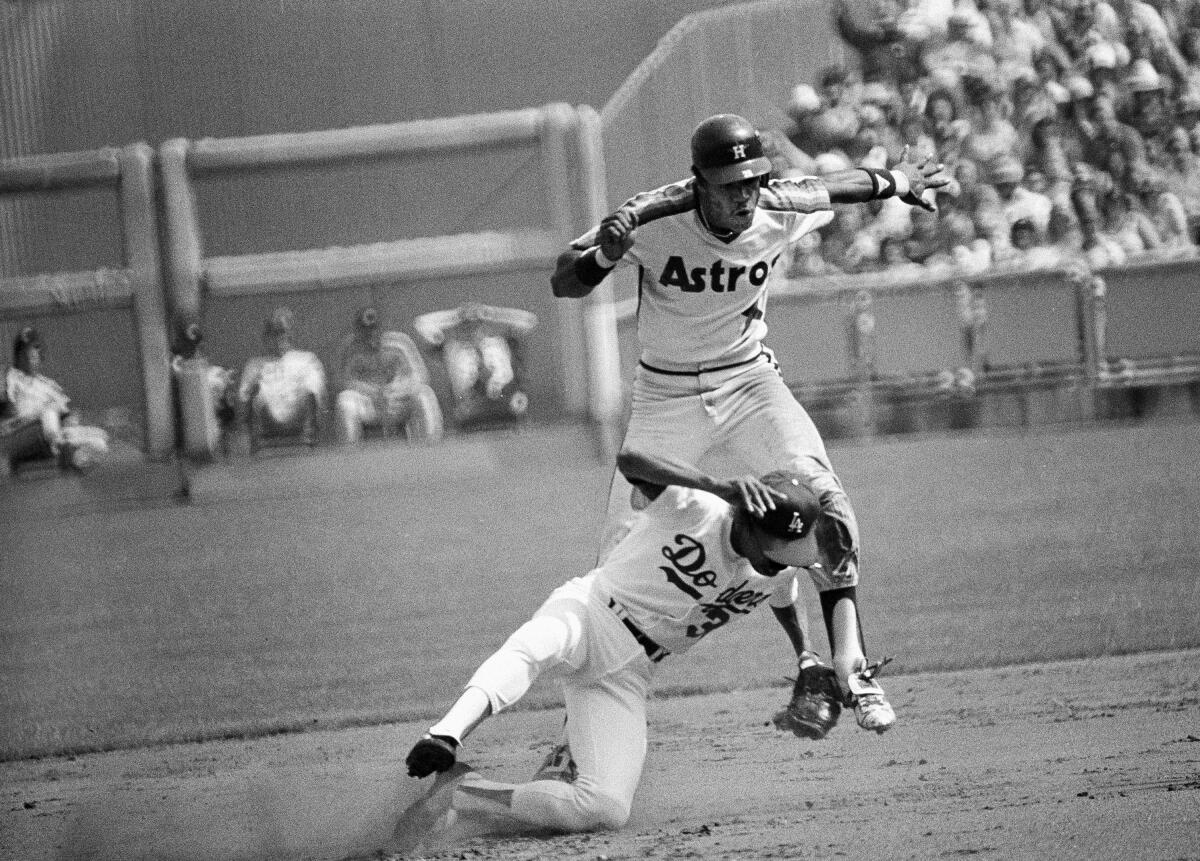
Oct. 6
Houston Astros 7, Dodgers 1
Facing elimination in each of the three home games against the division-leading Astros, the Dodgers swept the regular season-ending series, winning each game by one run, to force a play-in game on Monday at Dodger Stadium. Los Angeles had nearly been eliminated in the first game of the series. Trailing 2-1 in the bottom of the ninth, the Dodgers tied the game on a Ron Cey single and won in the 10th on a leadoff homer by Joe Ferguson. The tiebreaker was far less dramatic: Lasorda went with Dave Goltz and the game was over by the fourth inning, when Houston took a 7-0 lead.
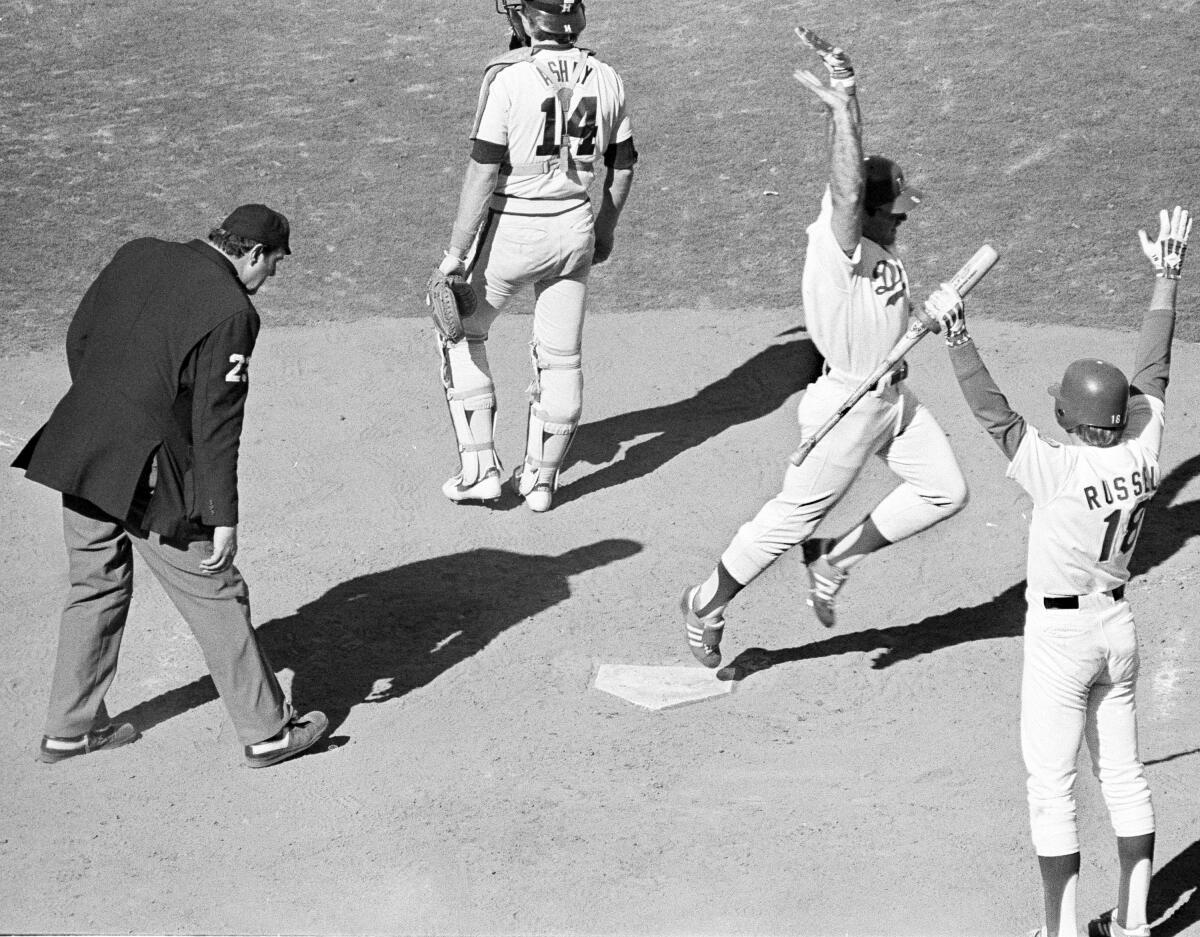
Games 3-5
Oct. 10-12
Dodgers 6, Houston Astros 1
Dodgers 2, Astros 1
Dodgers 4, Astros 0
One year later, the Dodgers turned the tables on the Astros. After scoring a single run and falling behind 2-0 in a divisional playoff created by that summer’s strike, Los Angeles held the Astros to two runs over the next three games to advance to the NLCS, where the elimination drama would escalate.
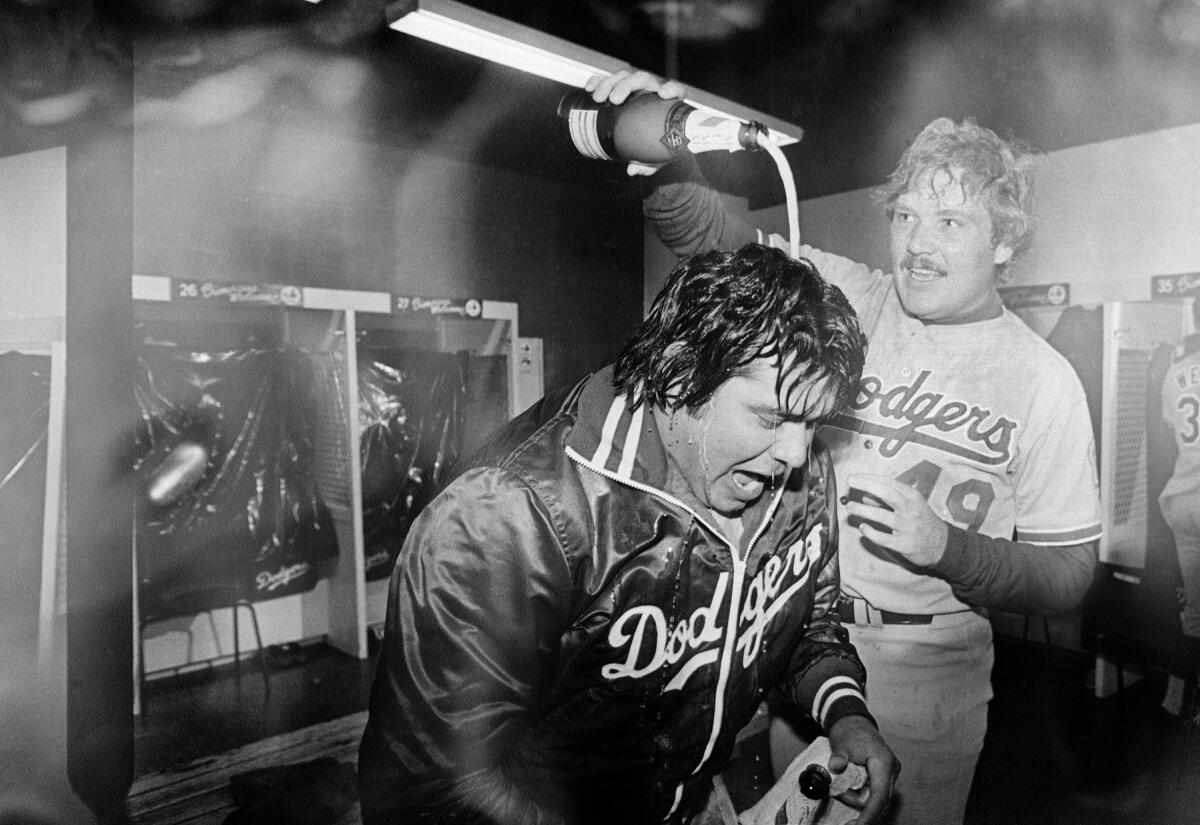
Games 4-5
Oct. 17/19
Dodgers 7, Montreal Expos 1
Dodgers 2, Expos 1
Down 2-1 on the road in Montreal, the Dodgers broke open a 1-1 Game 4 with six runs over the final two innings to force a frigid Game 5 at Olympic Stadium (34 degrees at first pitch). This game, too, was a 1-1 pitchers duel, between rookie Fernando Valenzuela and Ray Burris. Both managers turned to frontline starters in the ninth, with the Expos’ Dick Williams going to ace Steve Rogers, who surrendered a home run to Rick Monday in the top half of the inning. After back-to-back, two-out walks by Valenzuela in the bottom half, Lasorda turned to Bob Welch, who induced a groundout to deliver the Dodgers to their third World Series in five years.
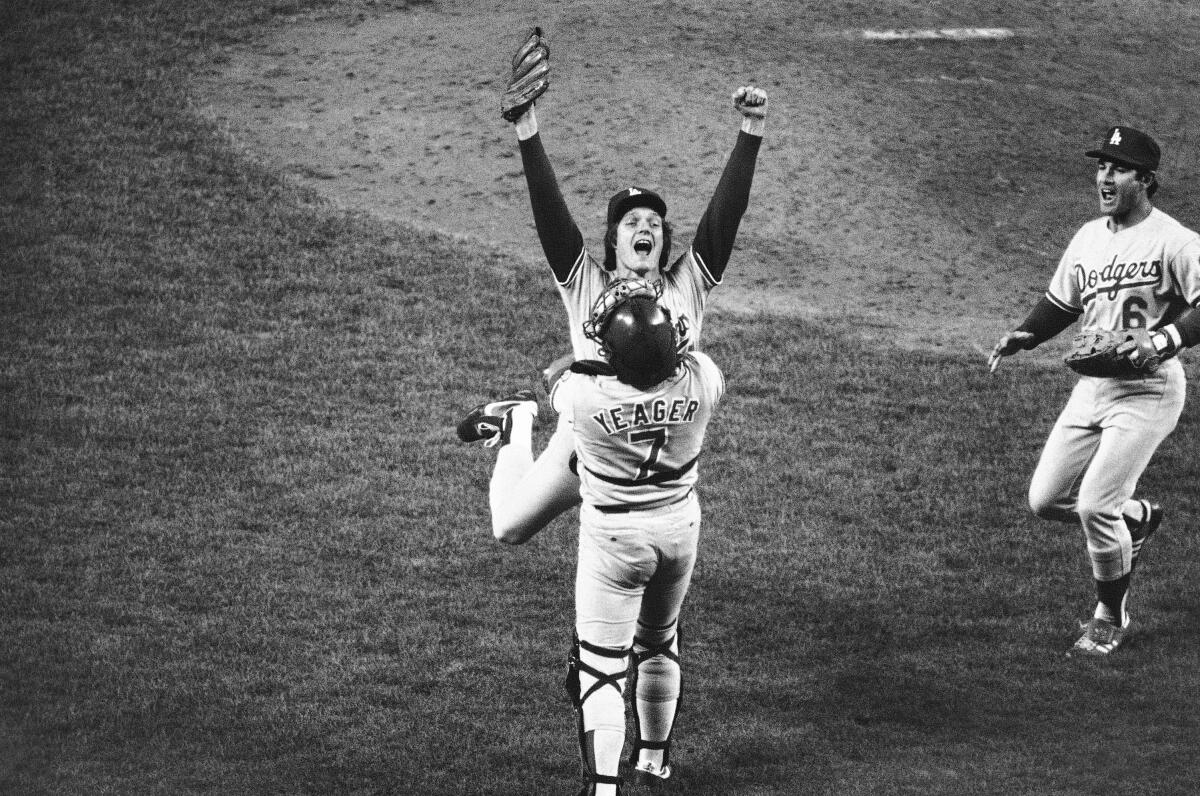
Game 6
Oct. 28
Dodgers 9, New York Yankees 2
Los Angeles dropped the first two games at Yankee Stadium before winning the next three at home, all by one run. The clincher was less climactic, as the Dodgers broke a 1-1 tie with three runs in the fifth, and four in the sixth. Steve Howe pitched 3 2/3 innings in relief of winning pitcher Burt Hooton to close out the Dodgers’ fifthWorld Series championship, and first in 16 years.
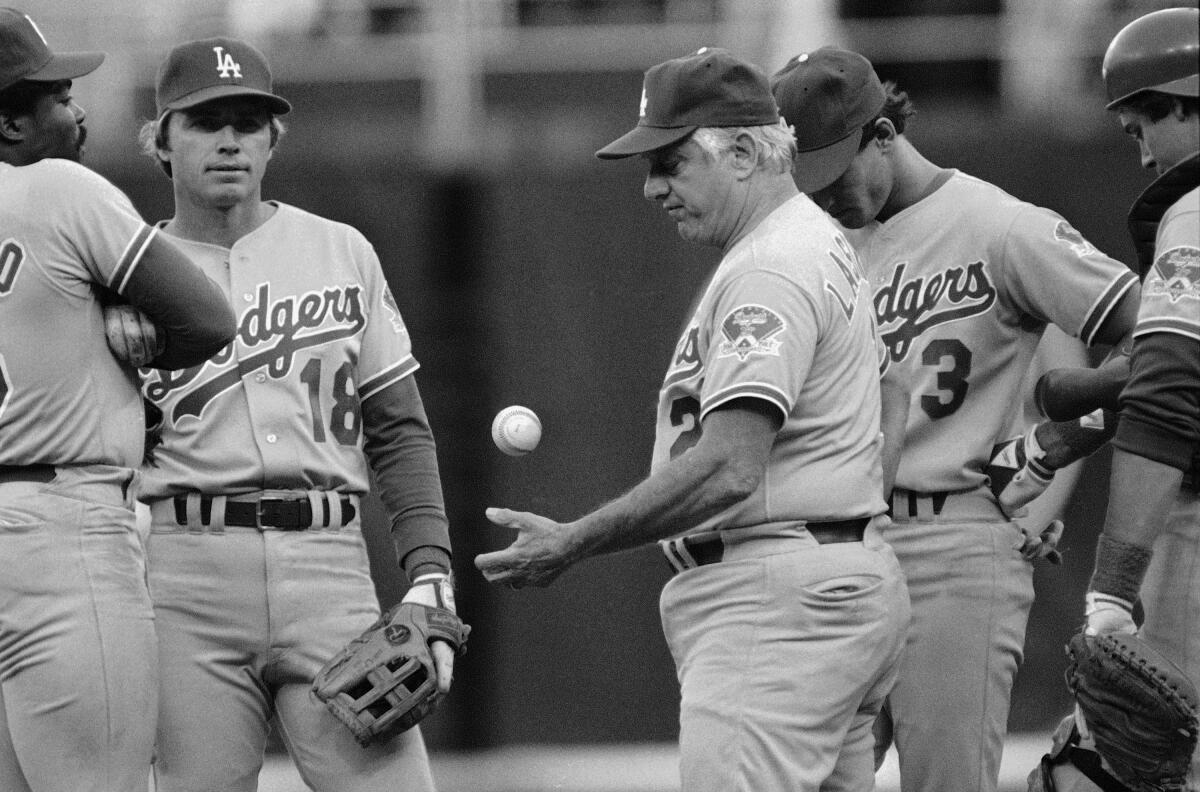
Game 4
Oct. 8
Philadelphia Phillies 7, Dodgers 2
After splitting the first two games of the NLCS at home, the Dodgers put up little fight in Philly, losing consecutive 7-2 decisions. For the second time in five days, Steve Carlton shut down the Dodgers lineup, allowing only a Dusty Baker solo homer in six innings.
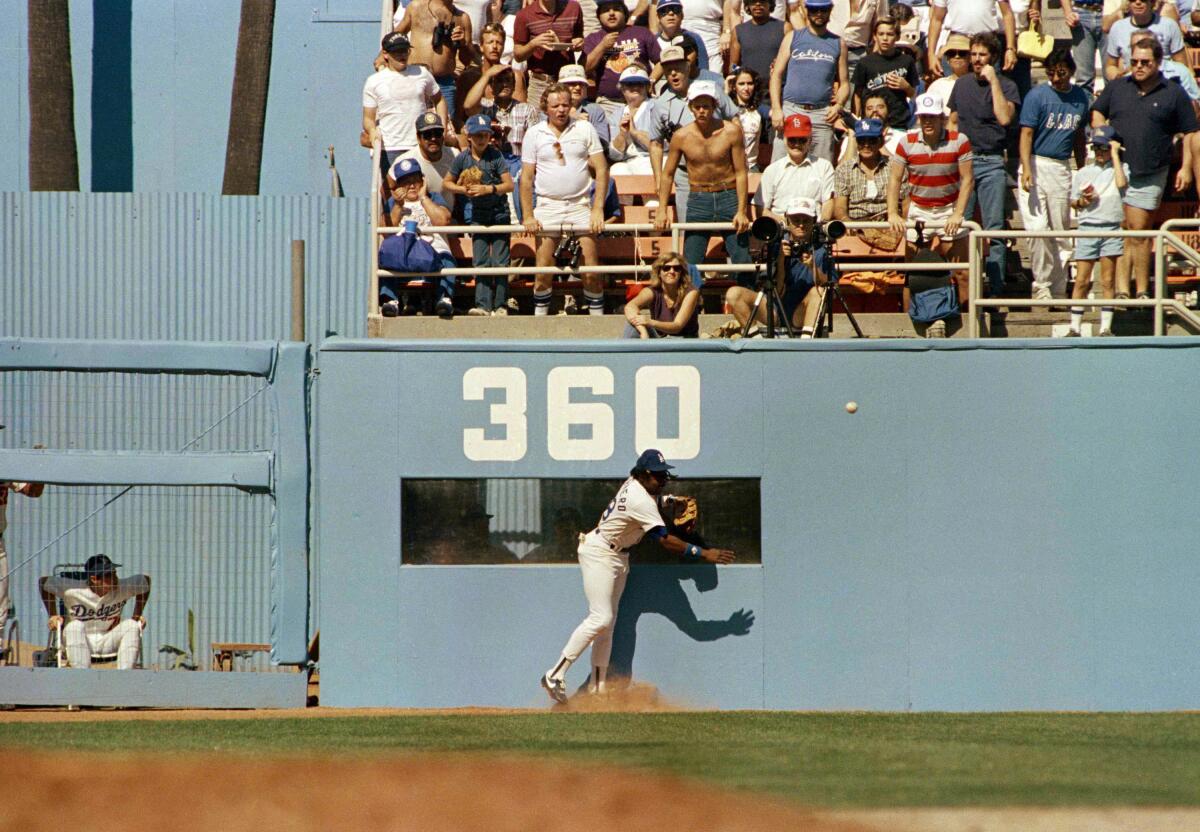
Game 6
Oct. 16
St. Louis Cardinals 7, Dodgers 5
An all-time crusher. Two days after Ozzie Smith’s walk-off homer against Tom Niedenfuer in Game 5 of the NLCS, Jack Clark ripped out the heart of the Dodgers with a three-run bomb in the top of the ninth inning off Niedenfuer as left fielder Pedro Guerrero famously threw his glove to the ground. The Dodgers had won the first two games of the series.
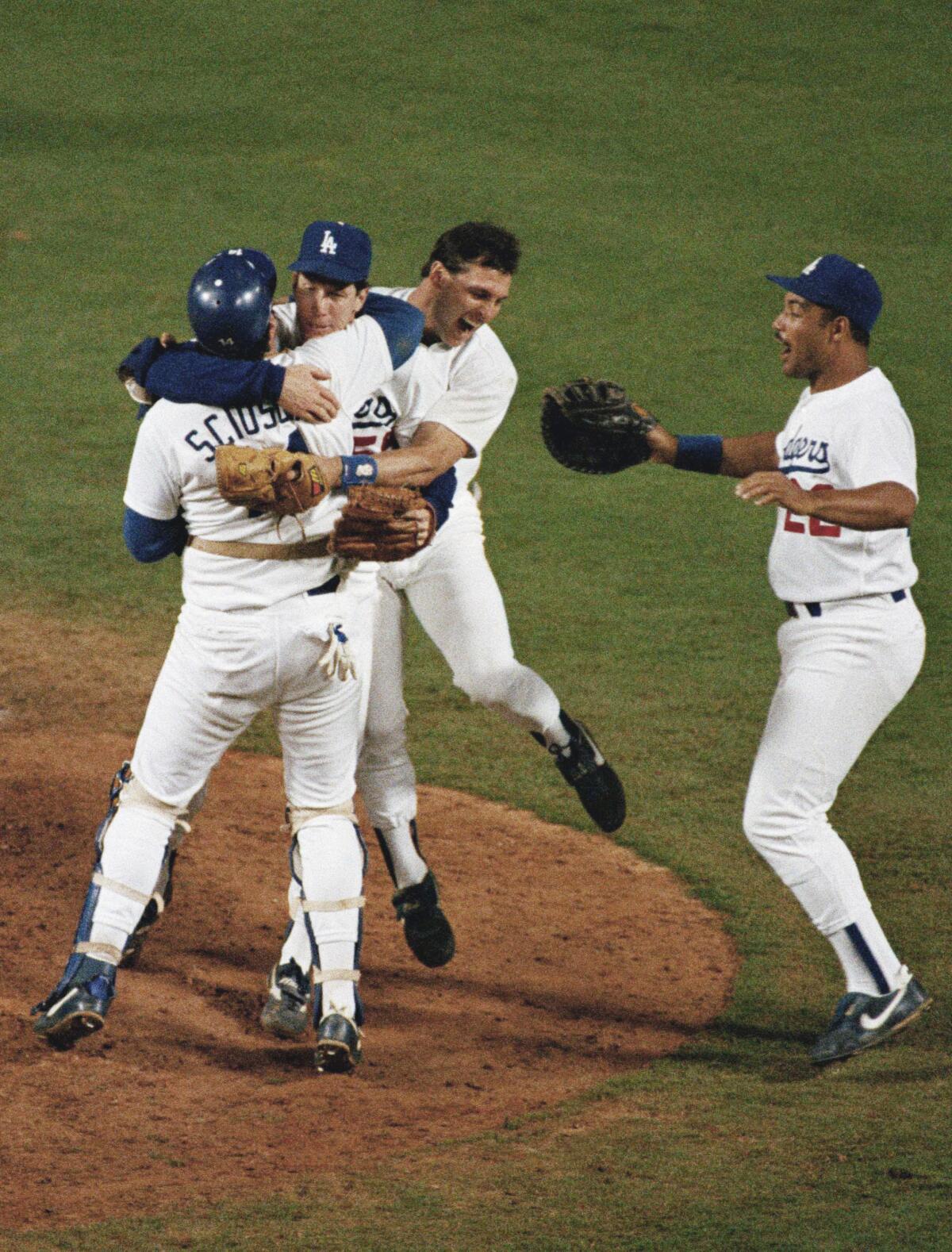
Games 6-7
Oct. 11-12
New York Mets 5, Dodgers 1
Dodgers 6, Mets 0
The most memorable result in this seven-game series was non-elimination Game 4, when the Dodgers, down 4-2 and their last out, tied the game on a Mike Scioscia two-run homer off Dwight Gooden, then won the game in the 12th on Kirk Gibson’s second-most famous homer that postseason. After David Cone shut down the Dodgers in Game 6 at Dodger Stadium, Orel Hershiser — in the midst of an historic finish to the season — went the distance in the franchise’s first-ever NLCS Game 7.
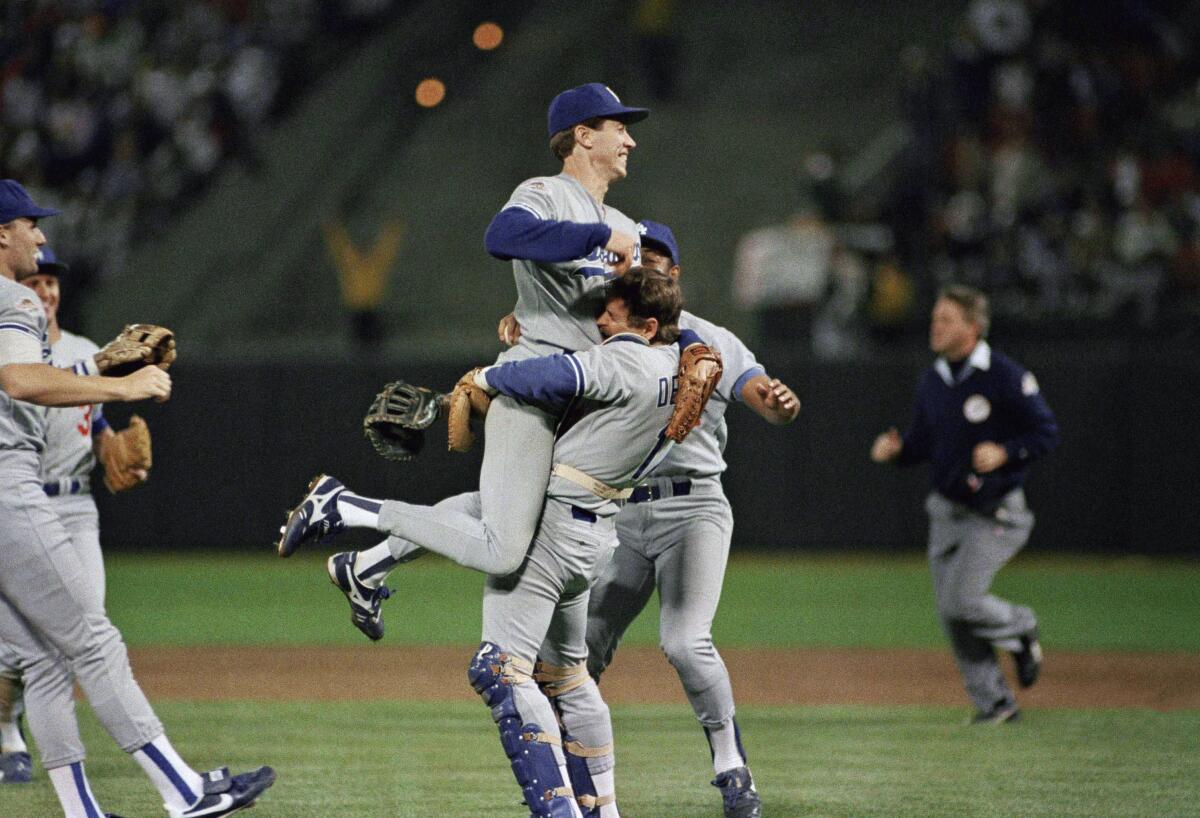
Game 5
Oct. 20
Dodgers 5, Oakland A’s 2
Tom Lasorda’s Game 5 lineup card? Had it been the opening day starting nine, you might have forecast a 75-win season, even with Orel Hershiser in it. Instead it was the group that delivered the Dodgers to one of the unlikeliest World Series championships in history. Pocked by injury—it was missing eventual NL MVP Kirk Gibson, Mike Scioscia and Pedro Guerrero — it rode the unsung bats of Mickey Hatcher and Mike Davis, both of whom hit two-run homers, and the much-sung arm of Hershiser, who sealed a dominant season with his second complete-game victory of the Series.
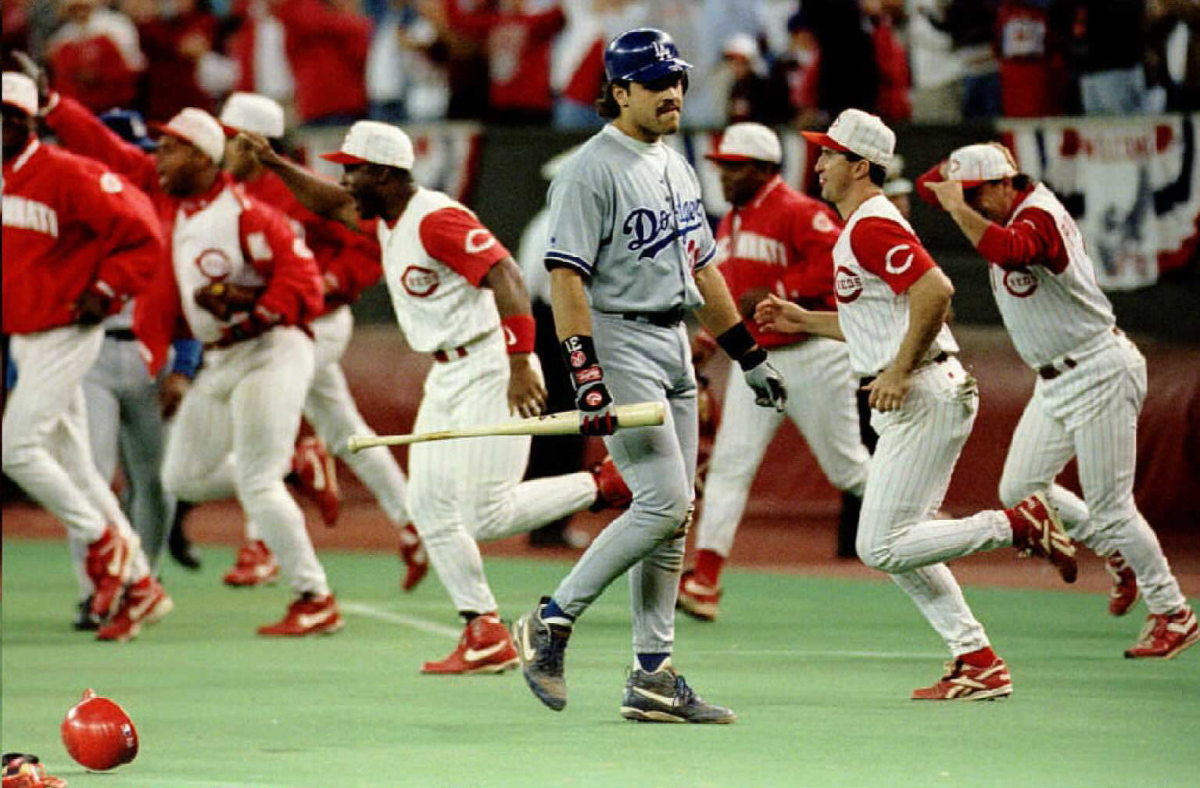
Game 3
Oct. 6
Cincinnati Reds 10, Dodgers 1
A non-competitive inaugural NLDS ended in a Reds rout in Cincinnati. The salt in the wound of the Dodgers’ first postseason berth since the 1988 World Series was a bases-clearing double by pinch-hitting pitcher Danny Jackson in the seventh inning to account for the Reds’ final three runs.
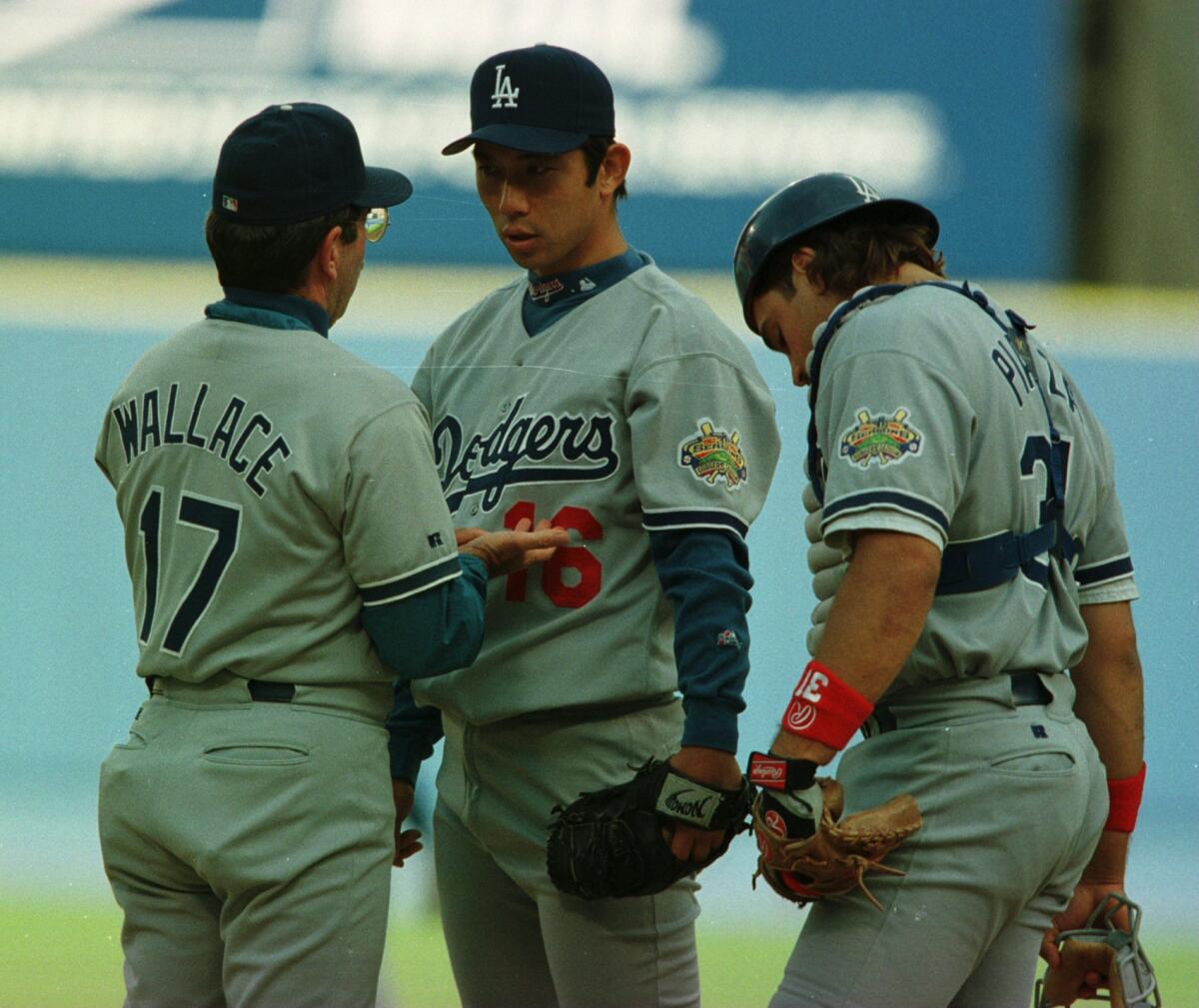
Game 3
Oct. 5
Atlanta Braves 5, Dodgers 2
For the second straight year, the Dodgers were swept in the NLDS, this time at the hands of the defending World Series champions. And for the second straight year, the losing pitcher was Hideo Nomo, who did not make it out of the fourth inning, by which time Atlanta had taken a 5-0 lead.
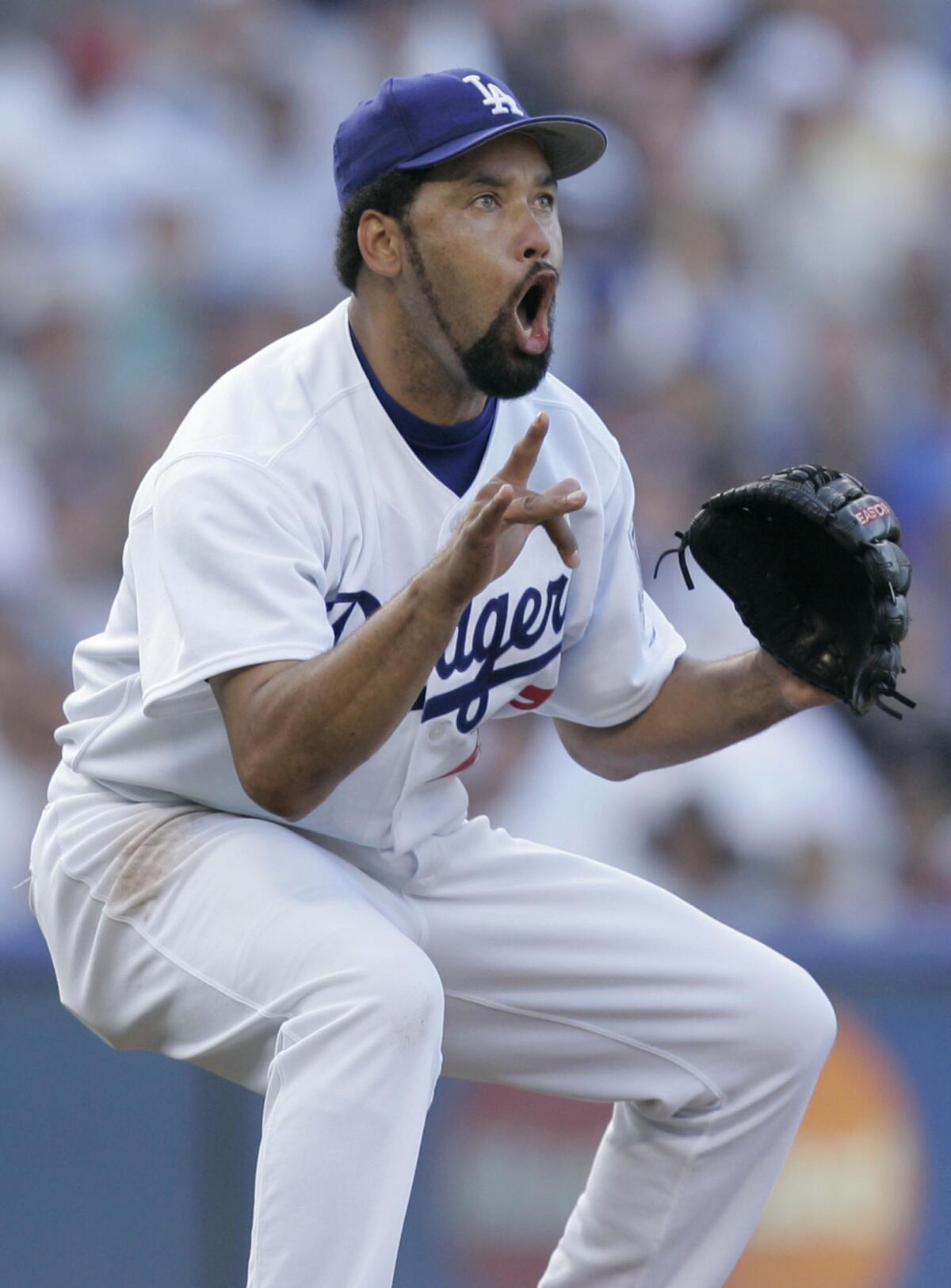
Games 3-4
Oct. 9-10
Dodgers 4, St. Louis Cardinals 0
Cardinals 6, Dodgers 2
One day after José Lima staved off elimination with a complete-game shutout, the Cardinals ended the Dodgers’ first postseason trip in eight years with an easy Game 4 victory. Albert Pujols’ three-run homer in the fourth off Wilson Alvarez broke a 2-2 tie and the Dodgers managed only one hit after the third inning.
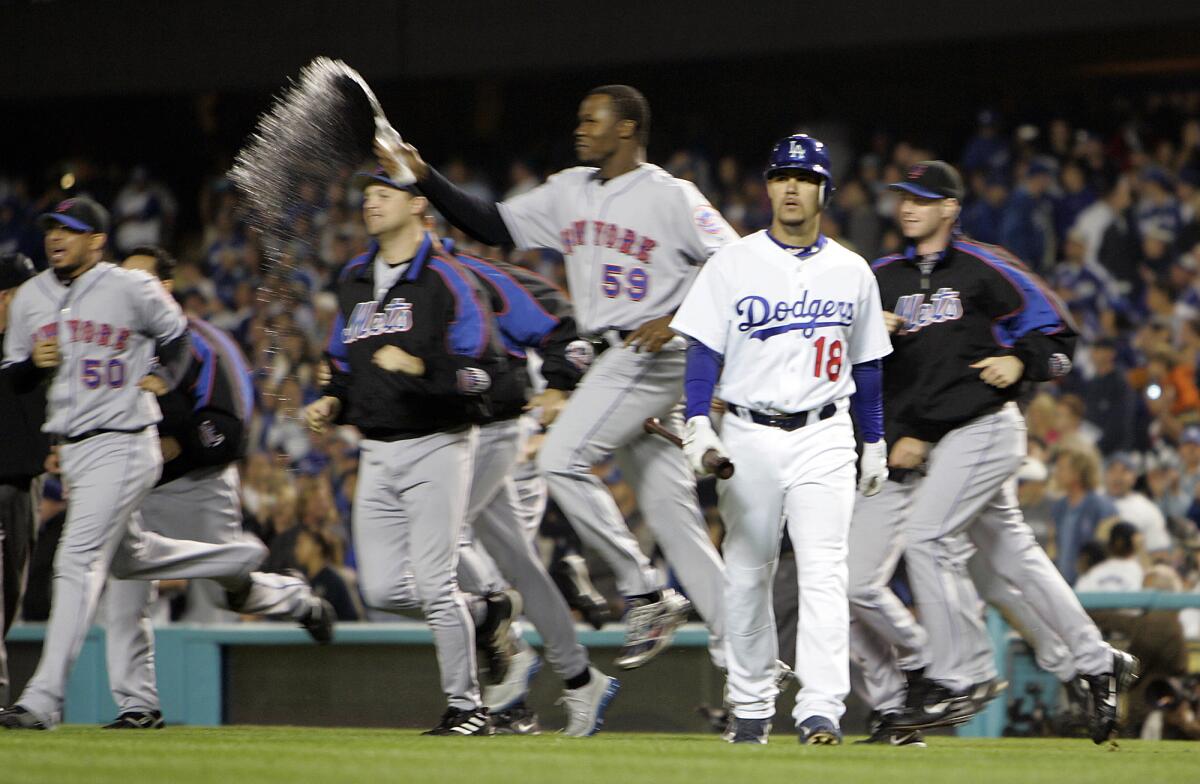
Game 3
Oct. 7
New York Mets 9, Dodgers 5
Down 2-0 in the NLDS, but up 5-4 in the sixth inning of Game 3, manager Grady Little turned to setup man Jonathan Broxton to salvage Game 3. It didn’t work, as the Mets scored three times off the fireballing right-hander to send L.A. to its 12 loss in its last 13 postseason games.
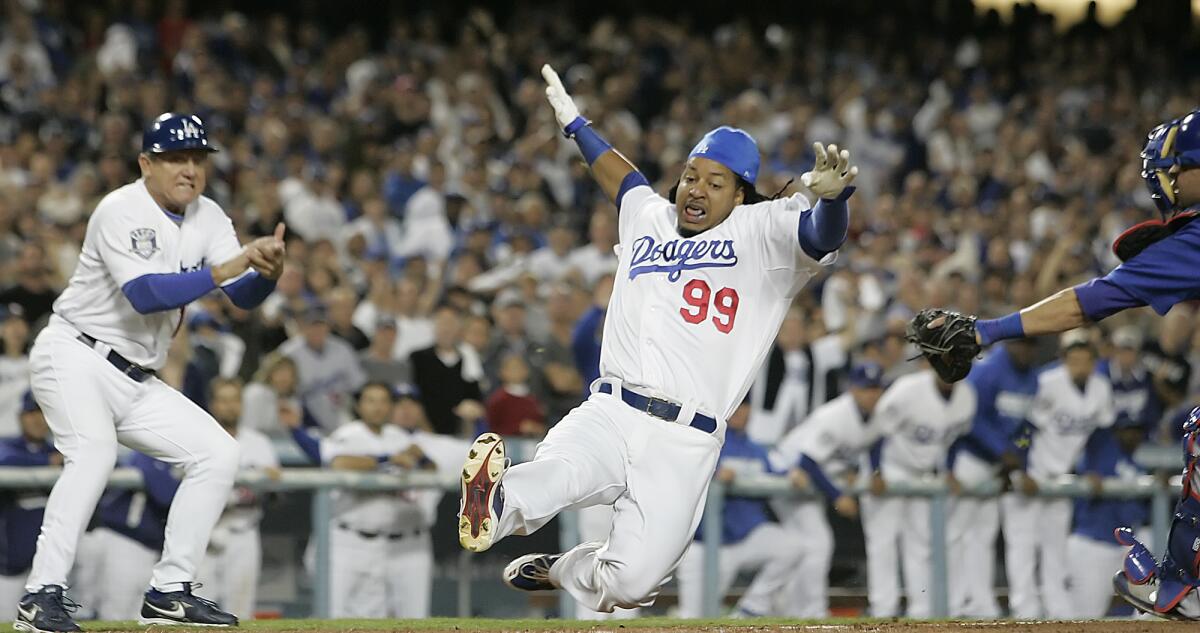
Game 3
Oct. 8
Dodgers 3, Chicago Cubs 1
The Dodgers punctuated a sweep of the Cubs behind Hiroki Kuroda’s 6 1/3 shutout innings. Los Angeles outscored Chicago 20-6 in three games to win its first postseason series since the 1988 World Series championship.
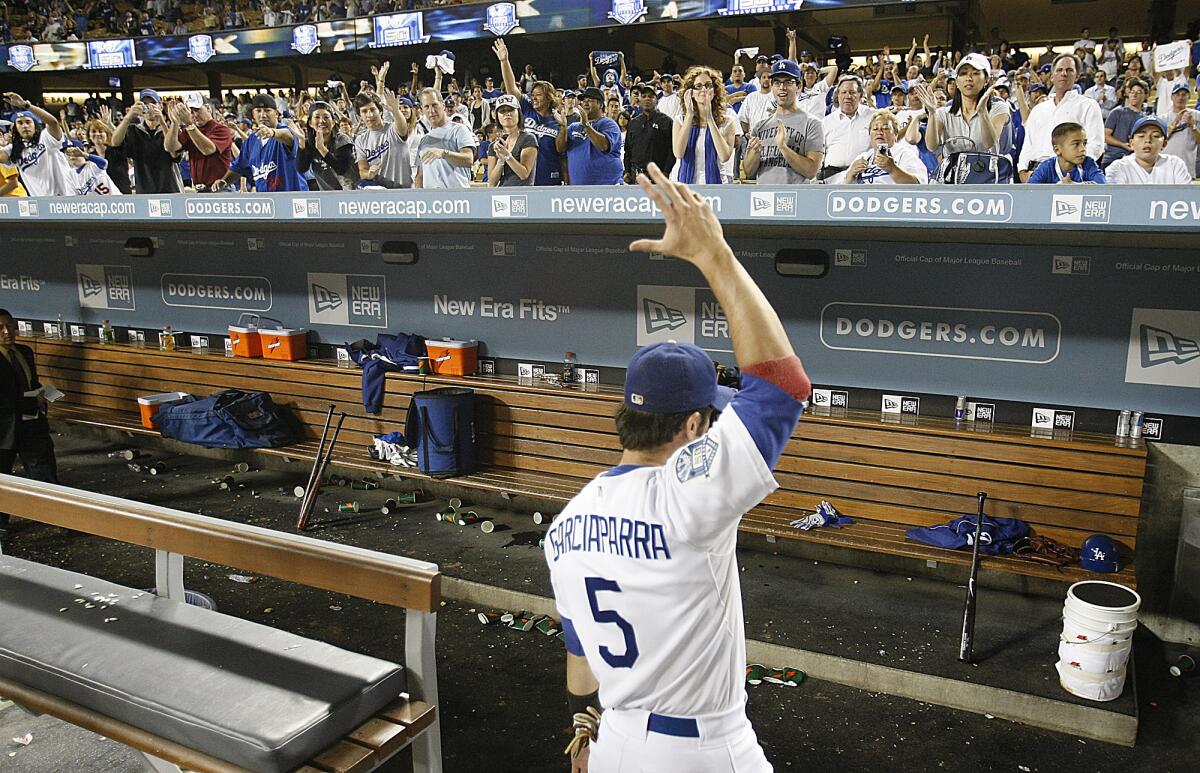
Game 5
Oct. 15
Philadelphia Phillies 5, Dodgers 1
These once-familiar October foes met in the postseason for the first time in 25 years. Jimmy Rollins set the tone with a leadoff home run off Chad Billingsley, who didn’t make it out of the third inning for the Dodgers, who were making their first NLCS appearance in 20 years.
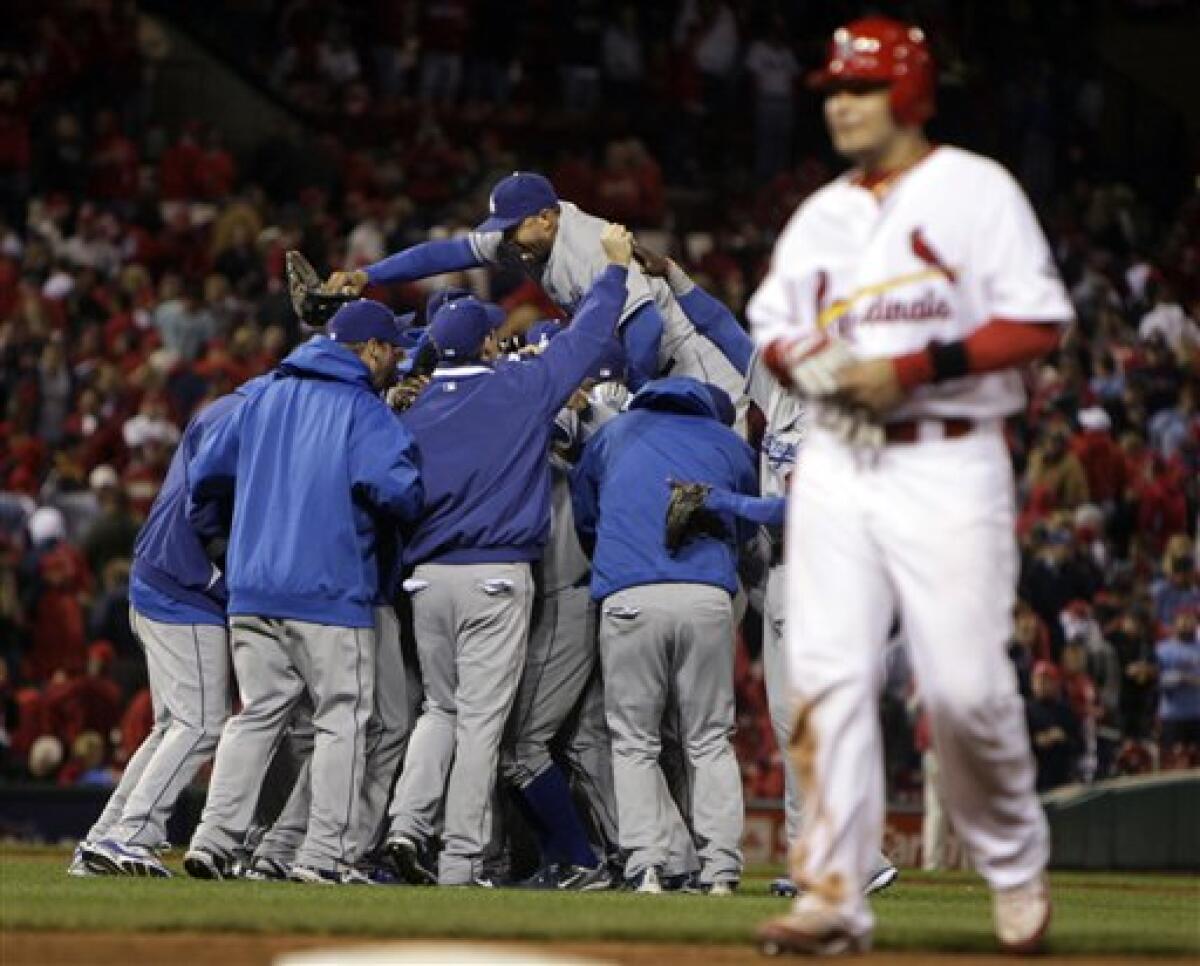
Game 3
Oct. 10
Dodgers 5, St. Louis Cardinals 1
Vicente Padilla pitched seven shoutout innings and Andre Ethier had a triple and a home run to give the Dodgers postseason series victories in consecutive years for the first time since 1977-78.
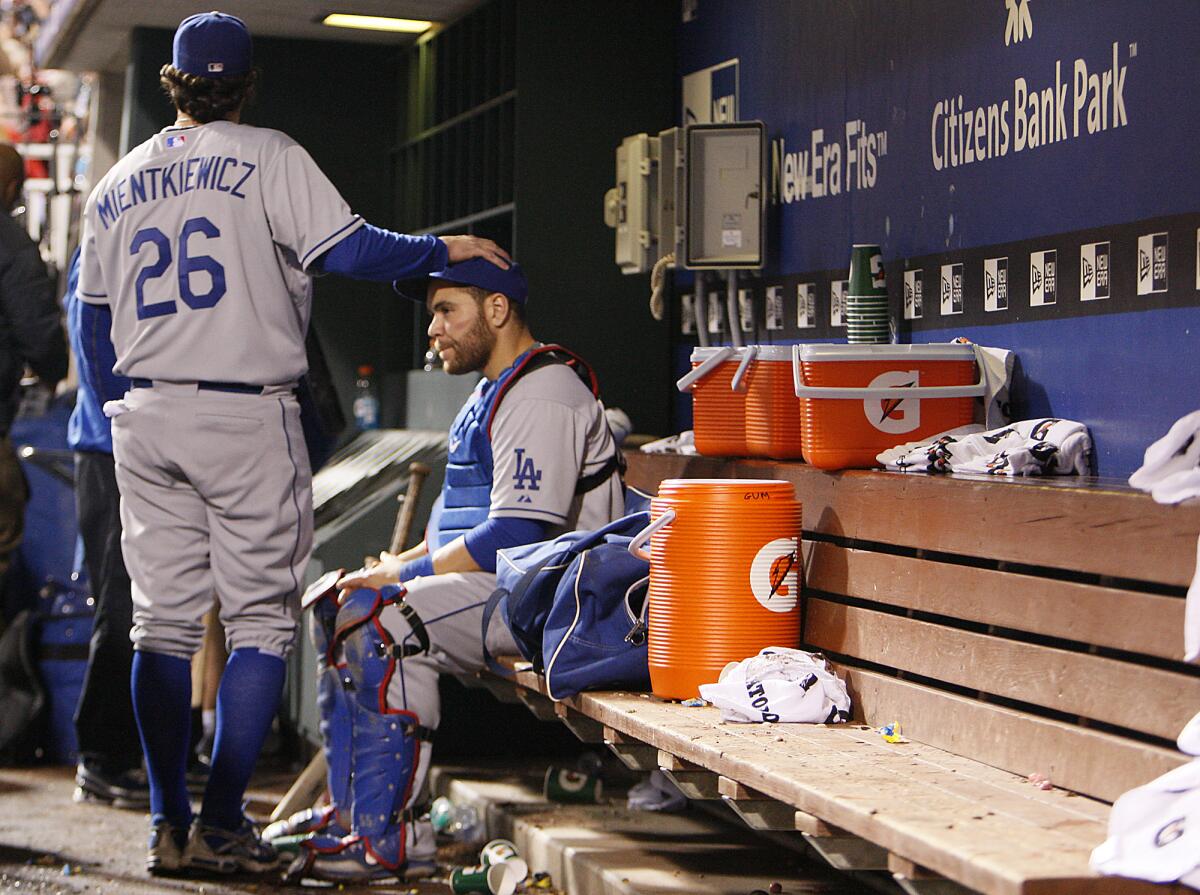
Game 5
Oct. 21
Philadelphia Phillies 10, Dodgers 4
For a second straight October, the Phillies stood in the way of the Dodgers’ return to the World Series. Vicente Padilla, the hero of the NLDS clincher, was knocked out of the game in the fourth inning against a Philadelphia lineup that hit four homers, including two by Jayson Werth.
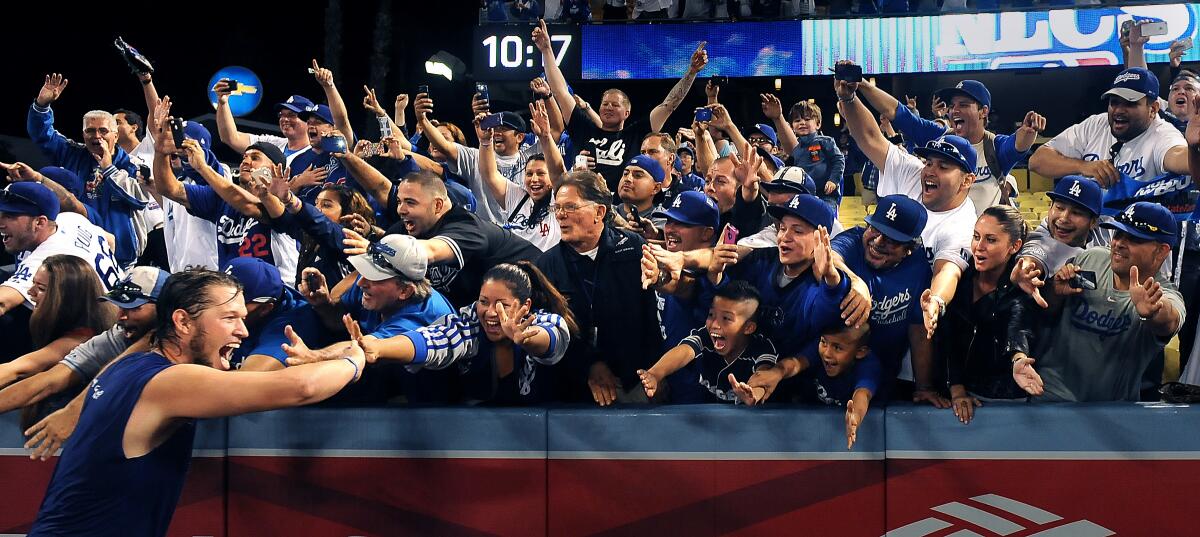
Game 4
Oct. 7
Dodgers 4, Atlanta Braves 3
Much (though less so since his 2020 postseason heroics) has been made of Clayton Kershaw’s postseason resume. Against Atlanta, he was vintage Kershaw, pitching six innings without giving up an earned run. The bullpen allowed a run in the seventh before Juan Uribe’s two-run homer in the eighth won it, putting the exclamation point on his heroics with an all-time bat flip.
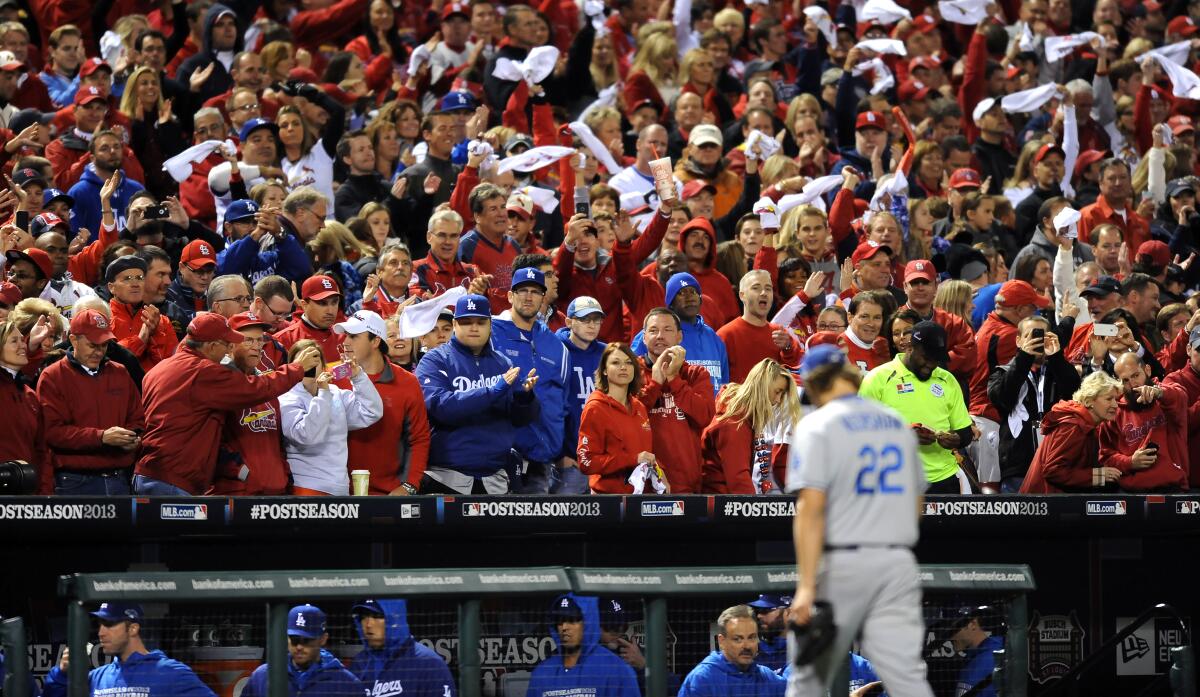
Games 5-6
Oct. 16/18
Dodgers 6, St. Louis Cardinals 4
Cardinals 9, Dodgers 0
Four home runs, including two by Adrián González, delayed elimination in Game 5, but the Cardinals strafed Clayton Kershaw for seven runs in four innings in a Game 6 rout.
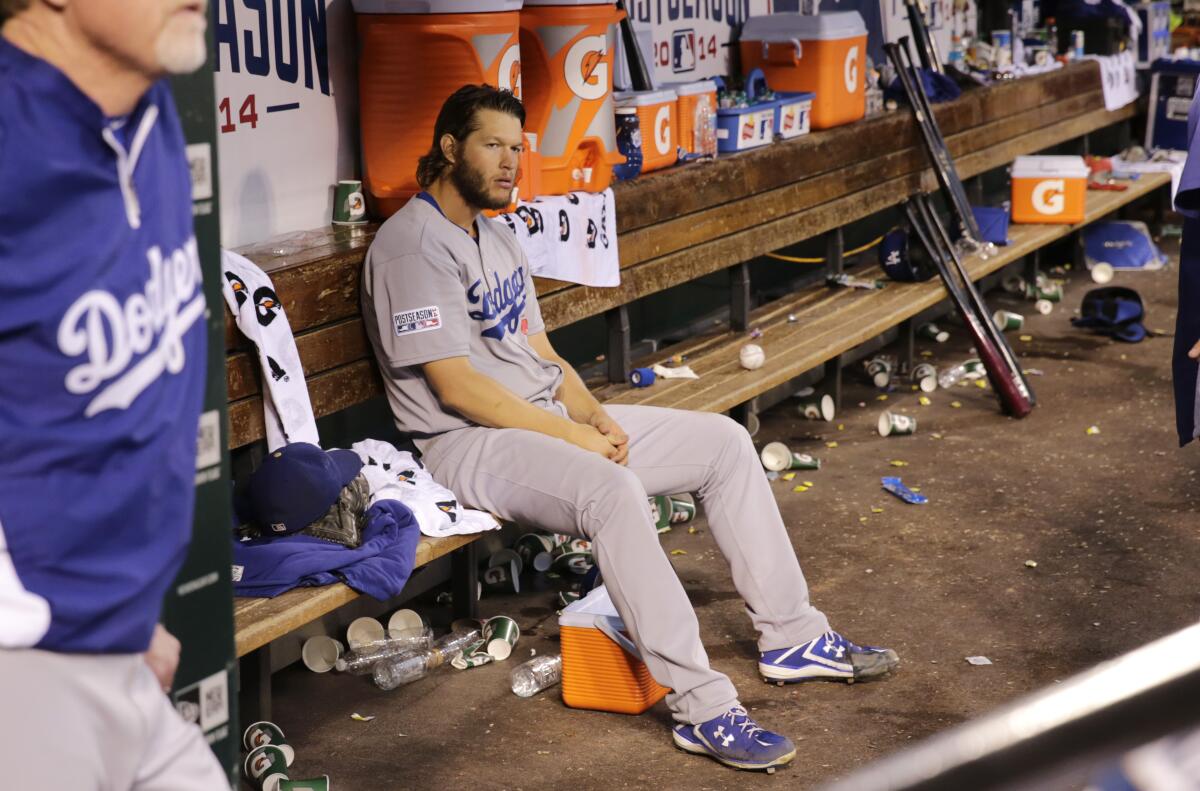
Game 4
Oct. 7
St. Louis Cardinals 3, Dodgers 2
Clayton Kershaw had a shutout and a 2-0 lead entering the seventh inning. Two infield hits and a Matt Adams homer to open the inning, however, knocked Kershaw out of the game and sent him to his second loss of the NLDS.
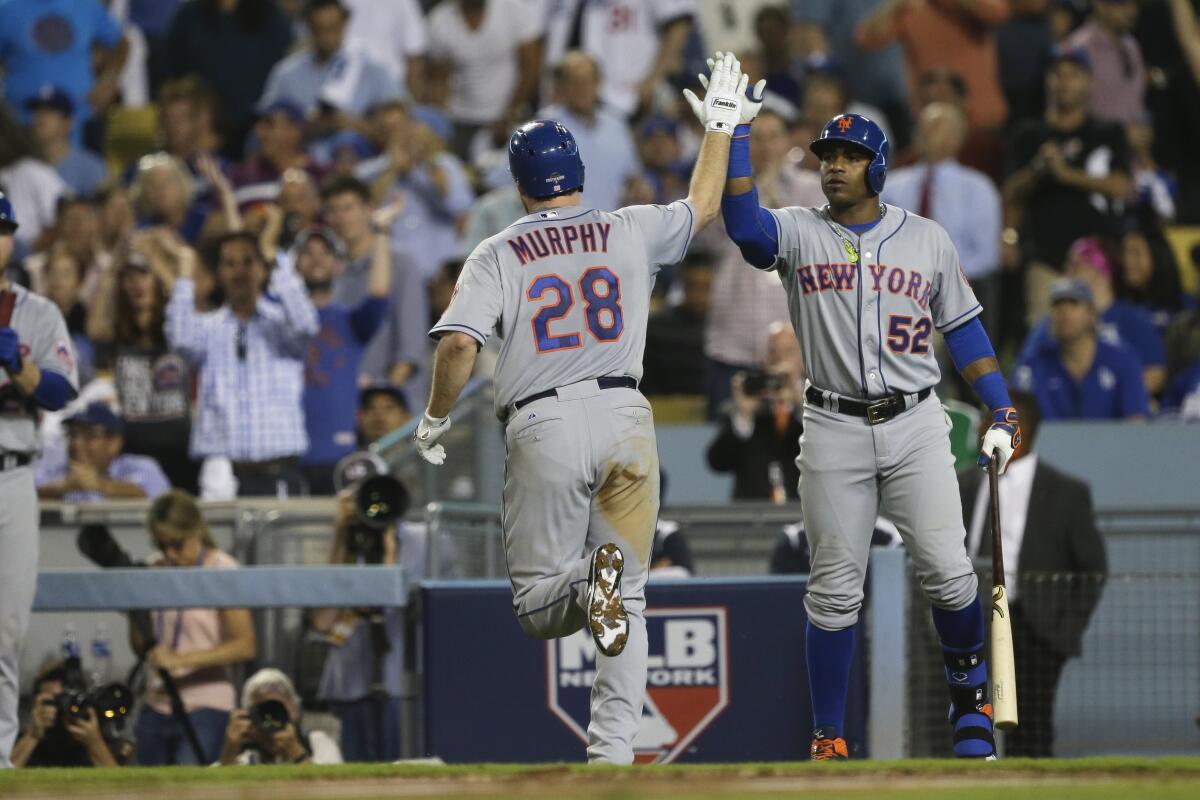
Game 4-5
Oct. 8/10
Dodgers 3, New York Mets 1
Mets 3, Dodgers 1
Clayton Kershaw pitched seven strong innings and Justin Turner’s two-run single highlighted a three-run third inning for the Dodgers, who avoided elimination at CitiField in Game 4. Back home for the winner-take-all game, the Dodgers took a 2-1 first-inning lead, but single runs by in the fourth and sixth innings lifted the Mets to the series win.
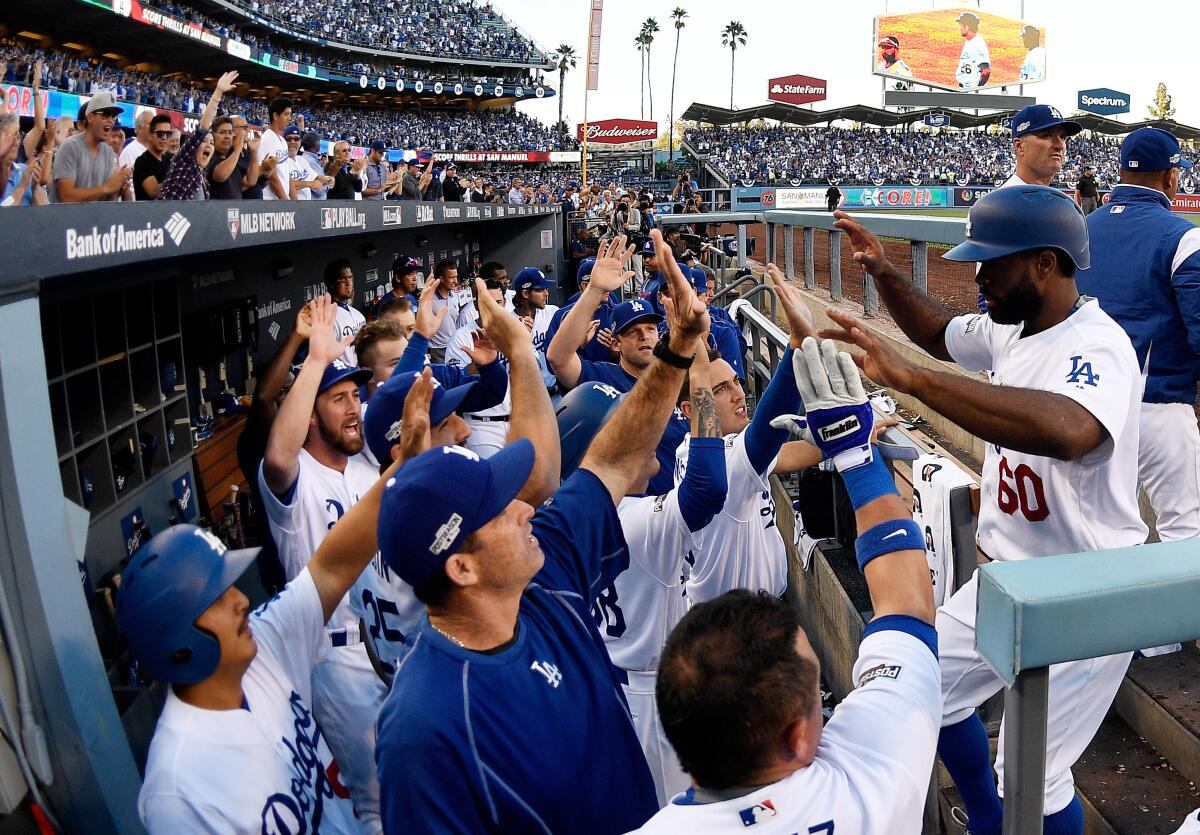
Games 4-5
Oct. 11/13
Dodgers 6, Washington Nationals 5
Dodgers 4, Nationals 3
Facing elimination at home, the Dodgers jumped out a 5-2 lead that was erased in the seventh when the Nationals scored three runs off Clayton Kershaw and Pedro Báez. A single by Chase Utley to drive in Andrew Toles in the bottom of the eighth, however, forced a Game 5 in Washington.
A Joc Pederson home run to lead off the seventh inning tied Game 5 at 1-1 and forced Nationals starter Max Scherzer from the mound. The Dodgers added three runs off three Nats relievers in the seventh to take a 4-1 lead that was cut to 4-3 in the bottom of the inning. Kenley Jensen came on in the seventh, getting out of a bases-loaded mess, and pitched into the ninth, when he was lifted for Clayton Kershaw after walking two batters. Kershaw retired both batters he faced for the save.
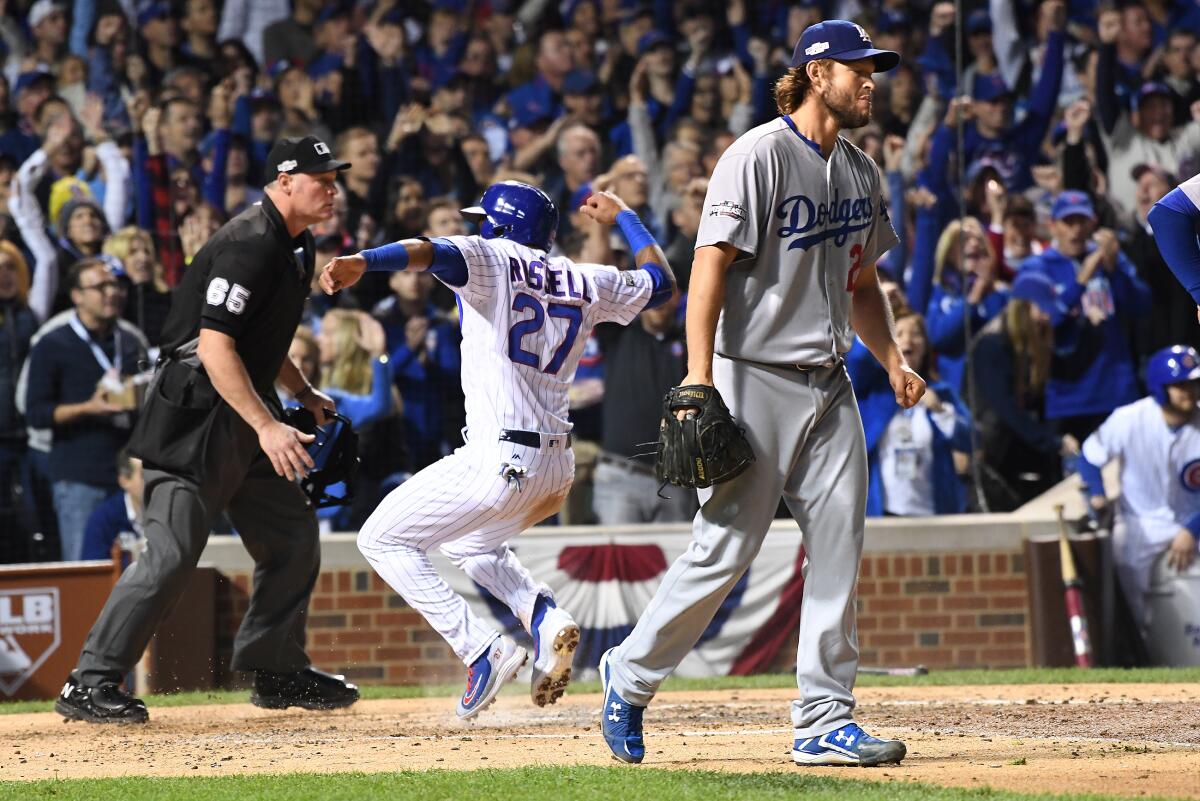
Game 6
Oct. 22
Chicago Cubs 5, Dodgers 0
Clayton Kershaw, who had been brilliant in a 1-0 Game 2 shutout that gave the Dodgers a 2-0 series lead, was unable to replicate the magic in Game 6, when the Cubs scored two runs in the first and another in the second. Kyle Kendricks and Aroldis Chapman limited the Dodgers to two hits to deliver the Cubs to their first World Series in 71 years.
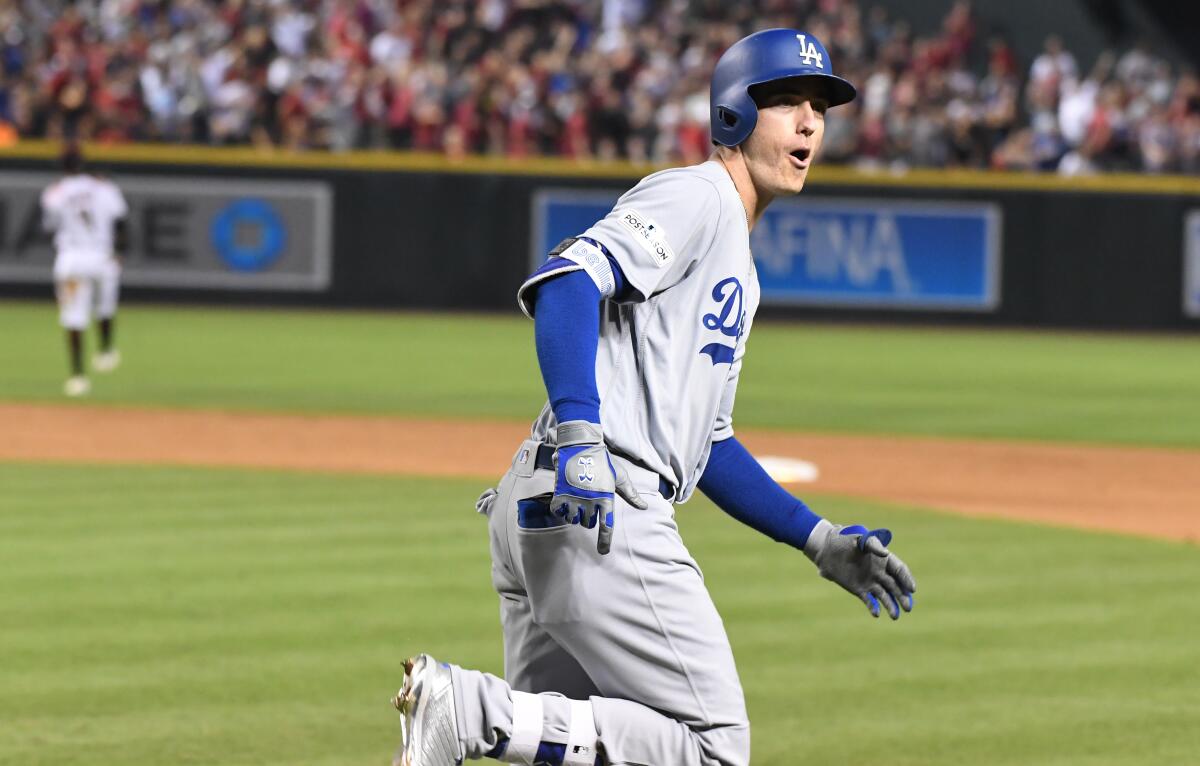
Game 3
Oct. 9
Dodgers 3, Arizona Diamondbacks 1
Rookie-of-the-year-to-be Cody Bellinger’s fifth-inning homer off ex-Dodger Zack Greinke was the difference as L.A. closed out the sweep. Yu Darvish pitched five innings and gave up one run on two hits before four relievers closed it out with four shutout innings.
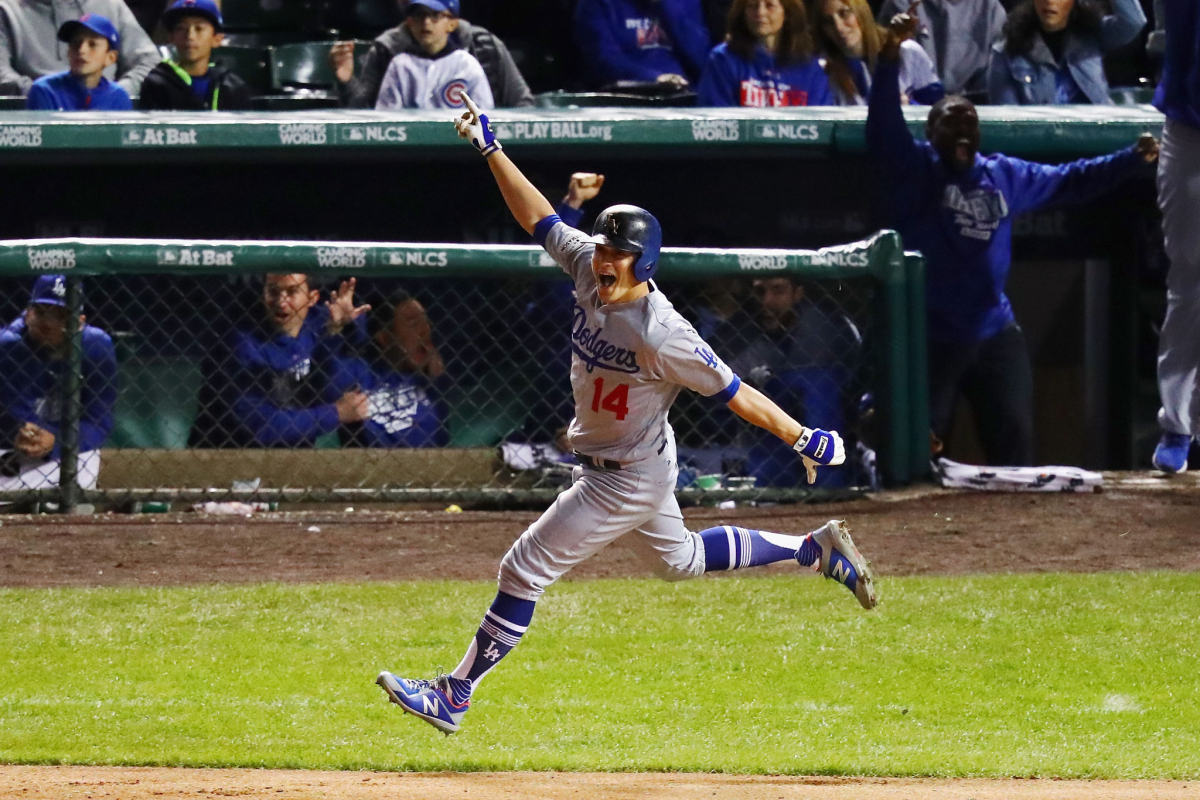
Games 4-5
Oct. 18-19
Chicago Cubs 3, Dodgers 2
Dodgers 11, Cubs 1
The Dodgers avenged their 2016 NLCS loss to the Cubs with a Game 5 rout in which Kiké Hernández became the first Dodger to hit three home runs in a postseason game. The left fielder hit a solo homer in the second, a grand slam in the third and a two-run shot in the ninth. The win sent the Dodgers to their first World Series in 29 years.
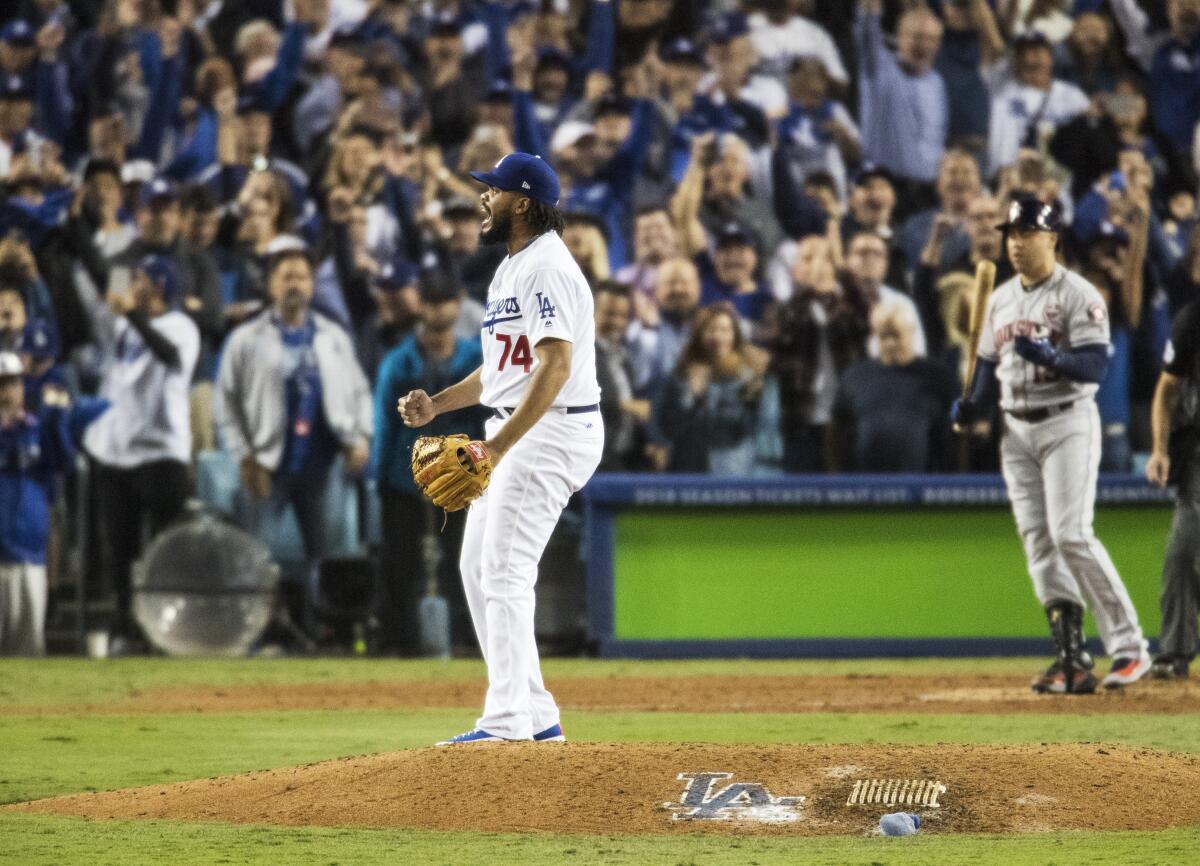
Game 6
Oct. 31
Dodgers 3, Astros 1
Two nights earlier, all hell broke loose in Houston to send the Dodgers to the brink of elimination. The 13-12 Astros win included seven home runs, five by Houston; another early postseason exit by Clayton Kershaw; two squandered L.A. leads of at least three runs; a squandered three-run ninth-inning lead by the Houston bullpen; and, of course, trash cans. Game 6, back in Dodger Stadium, was a much crisper affair, with L.A. beating Astros ace Justin Verlander behind Rich Hill and four relievers, the last of which was Kenley Jansen, who retired the final six batters in order.
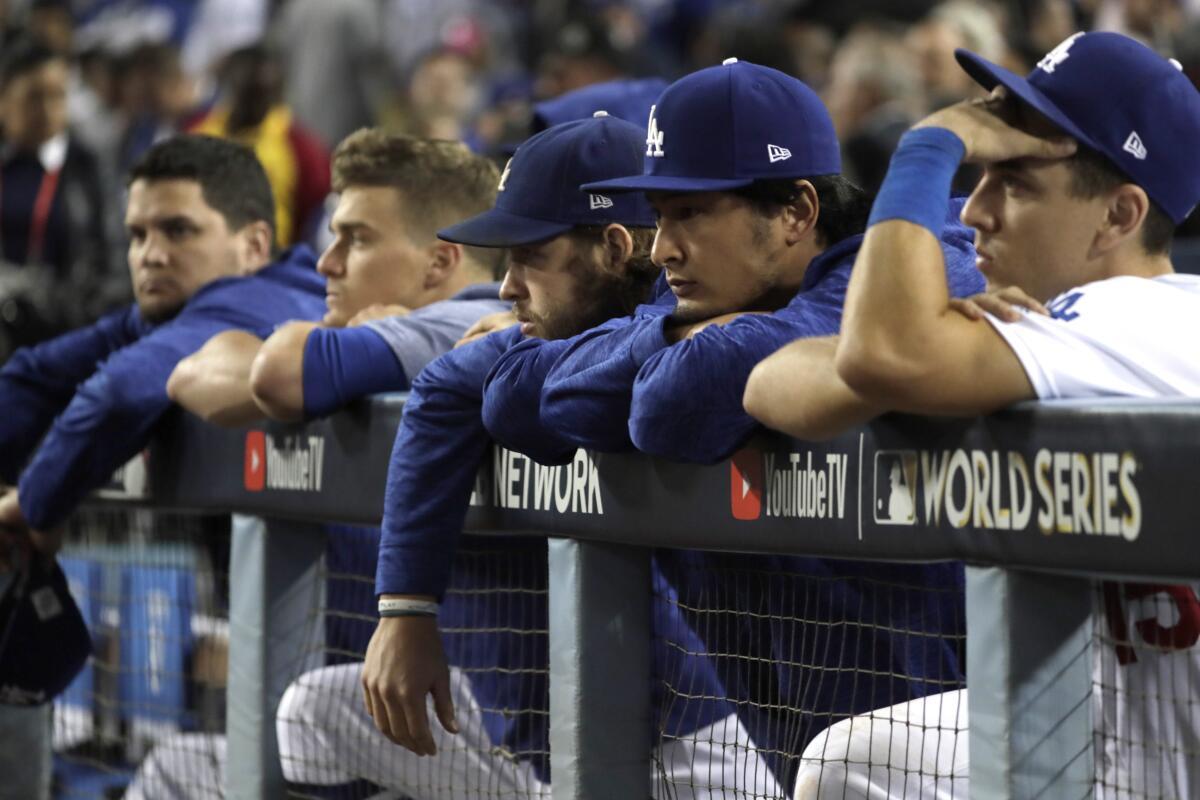
Game 7
Nov. 1
Houston Astros 5, Dodgers 1
The Astros opened an early lead in Game 7, scoring two runs in the first inning and three in the second inning off Yu Darvish, the last two runs coming on George Springer’s fifth home run of the World Series. The Dodgers — playing their first World Series Game 7 since 1965 — were held to six hits, scoring their lone run on a sixth inning single by Andre Ethier. The story of this Fall Classic, we would eventually learn, was only beginning.
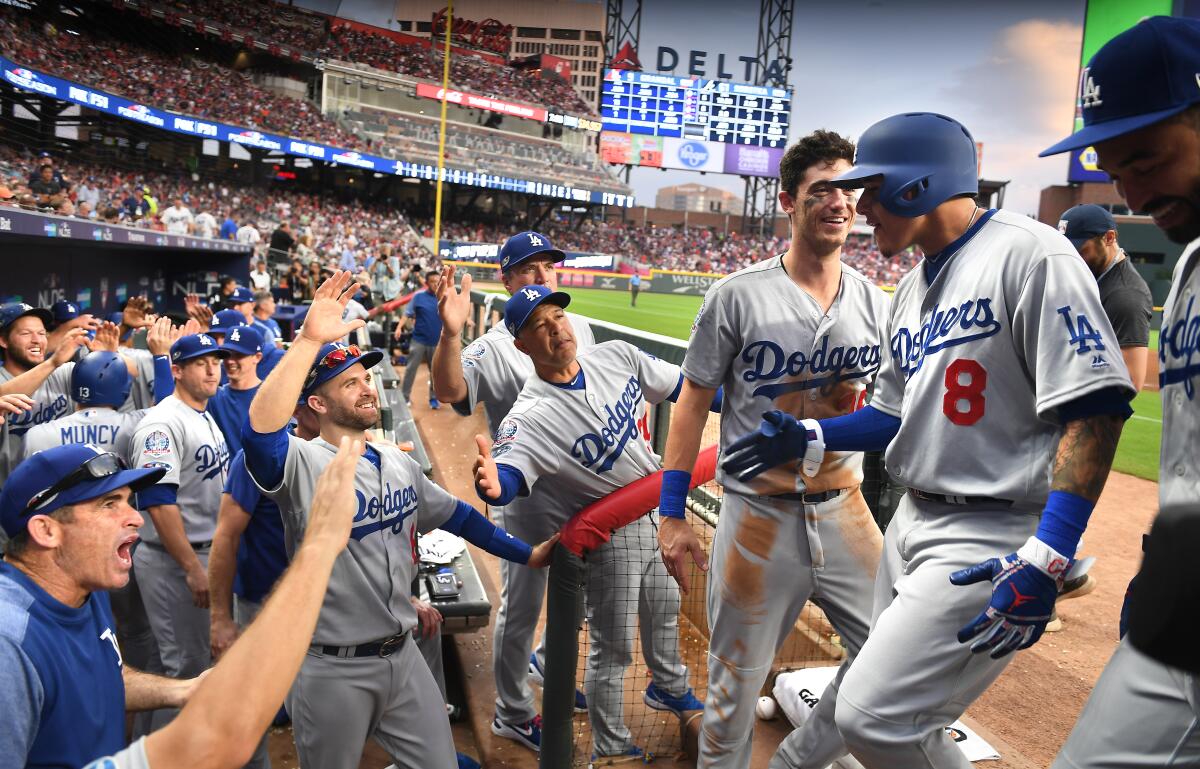
Games 3-4
Oct. 7-8
Atlanta Braves 6, Dodgers 5
Dodgers 6, Braves 2
After the Braves avoided elimination in Game 3 on a tiebreaking homer by Freddie Freeman off Alex Wood, the Dodgers closed out the series by scoring two runs in the fifth to take a 3-2 lead and put the game away on a three-run Manny Machado homer in the sixth.
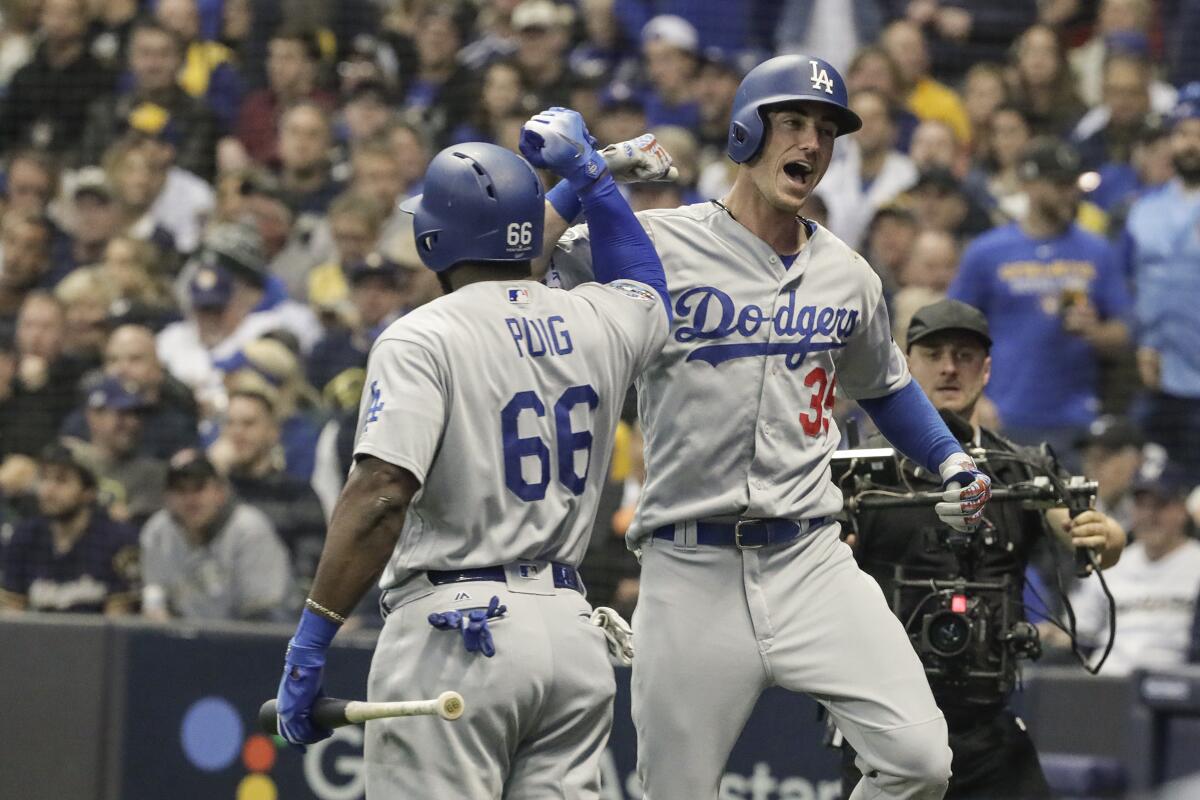
Games 6-7
Oct. 19-20
Milwaukee Brewers 7, Dodgers 2
Dodgers 5, Brewers 1
After the Brewers forced a seventh game with an easy Game 6 victory, the Dodgers closed out their second consecutive NL pennant by scoring all five of their runs on homers, a Cody Bellinger two-run shot in the second and a three-run blast by Max Muncy in the sixth. For the first time since 1977-78, the Dodgers were headed to consecutive Fall Classics.
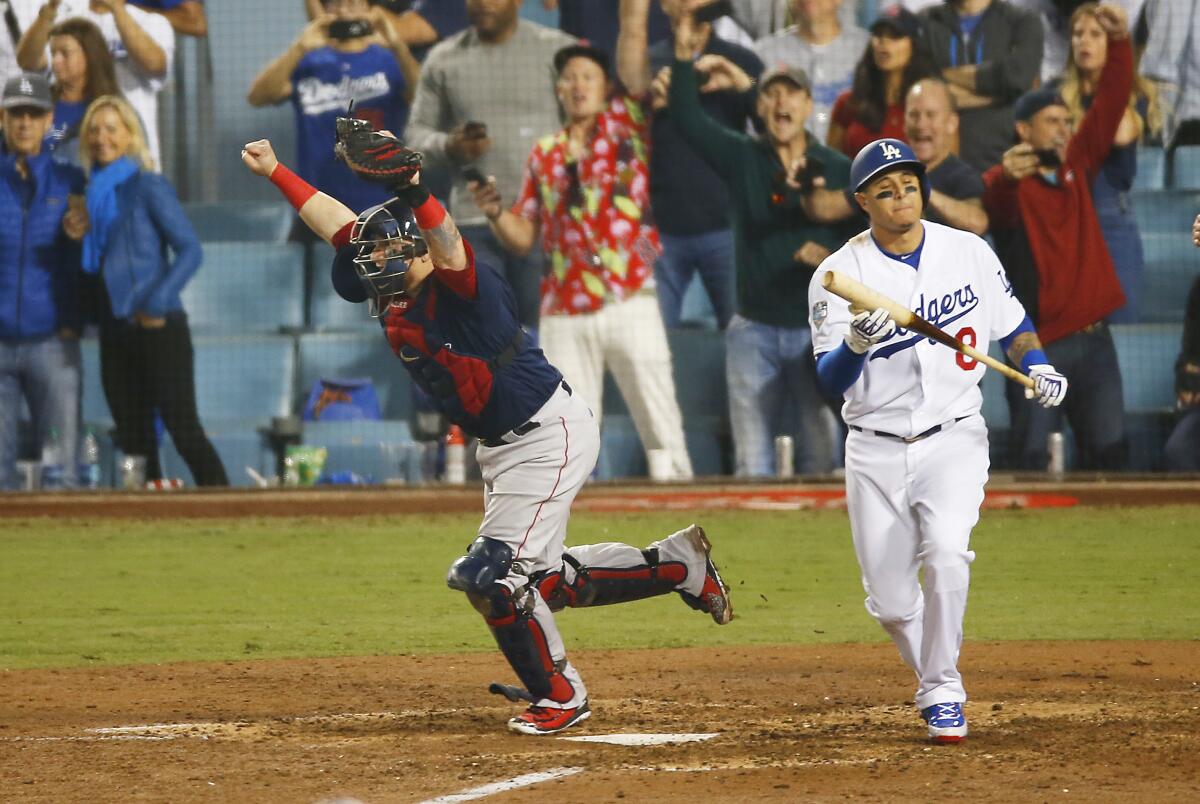
Game 5
Oct. 28
Boston Red Sox 5, Dodgers 1
In the first Boston-L.A. World Series meeting, the Red Sox hit four homers in the clincher, including one by future Dodger Mookie Betts. Clayton Kershaw went seven innings but was done in by three longballs.
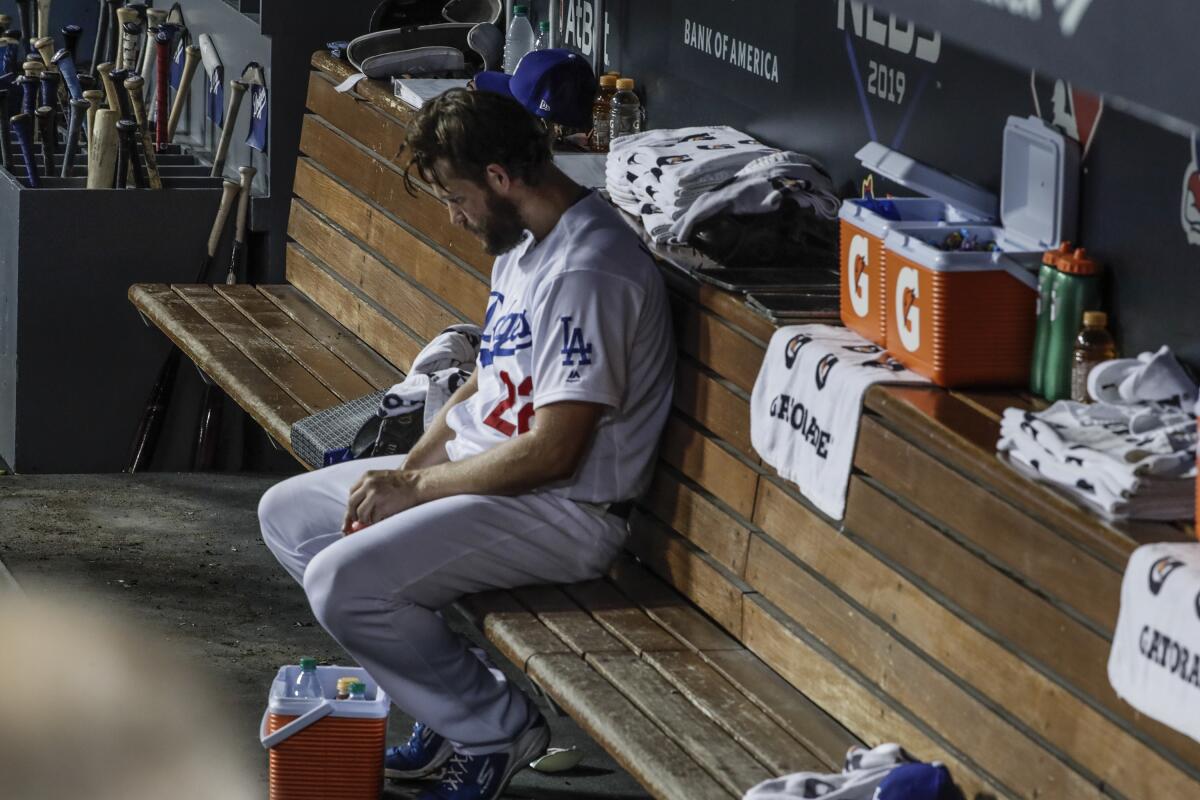
Games 4-5
Oct. 7/9
Washington Nationals 6, Dodgers 1
Nationals 7, Dodgers 3
The Nationals forced a winner-take-all game with an easy win Game 4. The Dodgers appeared headed for a fourth straight NLCS in Game 5 when they took a 3-1 lead into the eighth with Clayton Kershaw on the mound. Kershaw, who had come on relief of Walker Buehler to get out of a seventh-inning jam, gave up back-to-back homers to Anthony Rendon and Juan Soto to lead off the eighth, paving the way for Howie Kendrick’s grand slam in the 10th off Joe Kelly to end Los Angeles’ season.
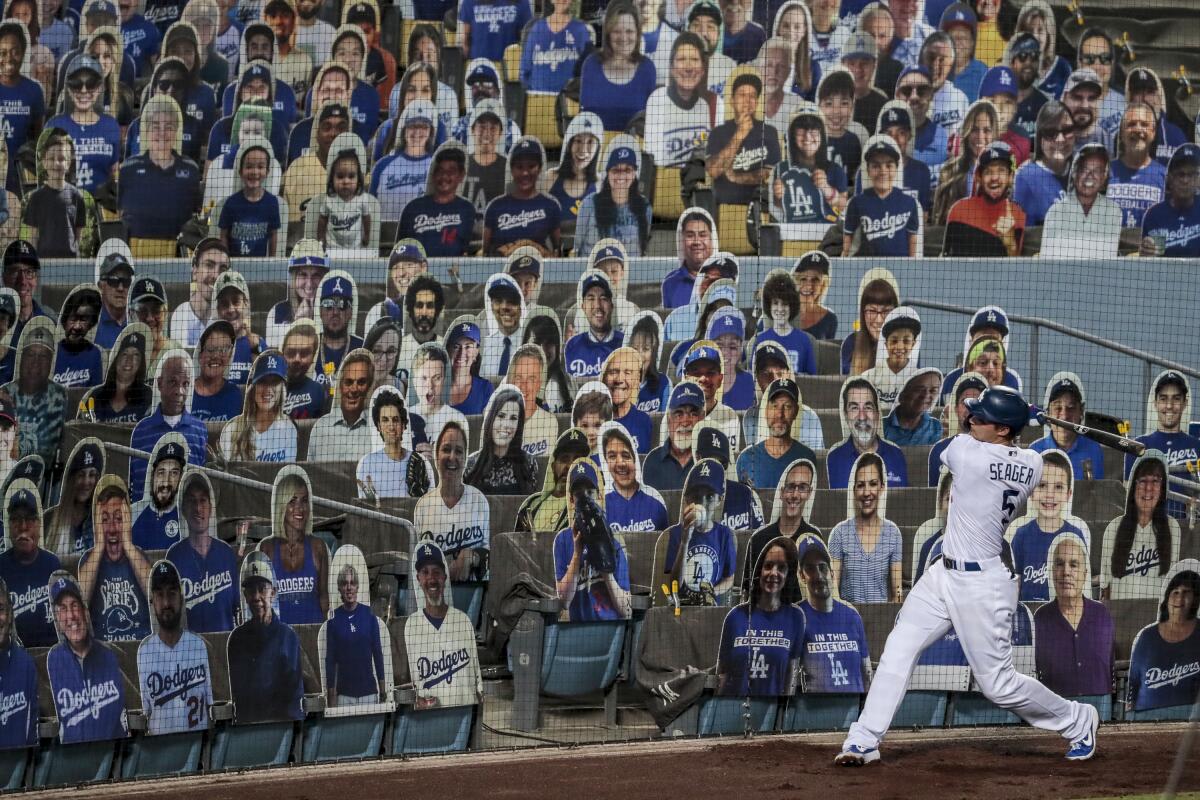
Game 2
Oct. 1
Dodgers 3, Milwaukee Brewers 0
In his finest postseason performance, Clayton Kershaw struck out 13 Brewers in eight innings of one-hit ball. The Dodgers scored all three of their runs in the fifth inning on an Austin Barnes single and a two-run double from Mookie Betts.
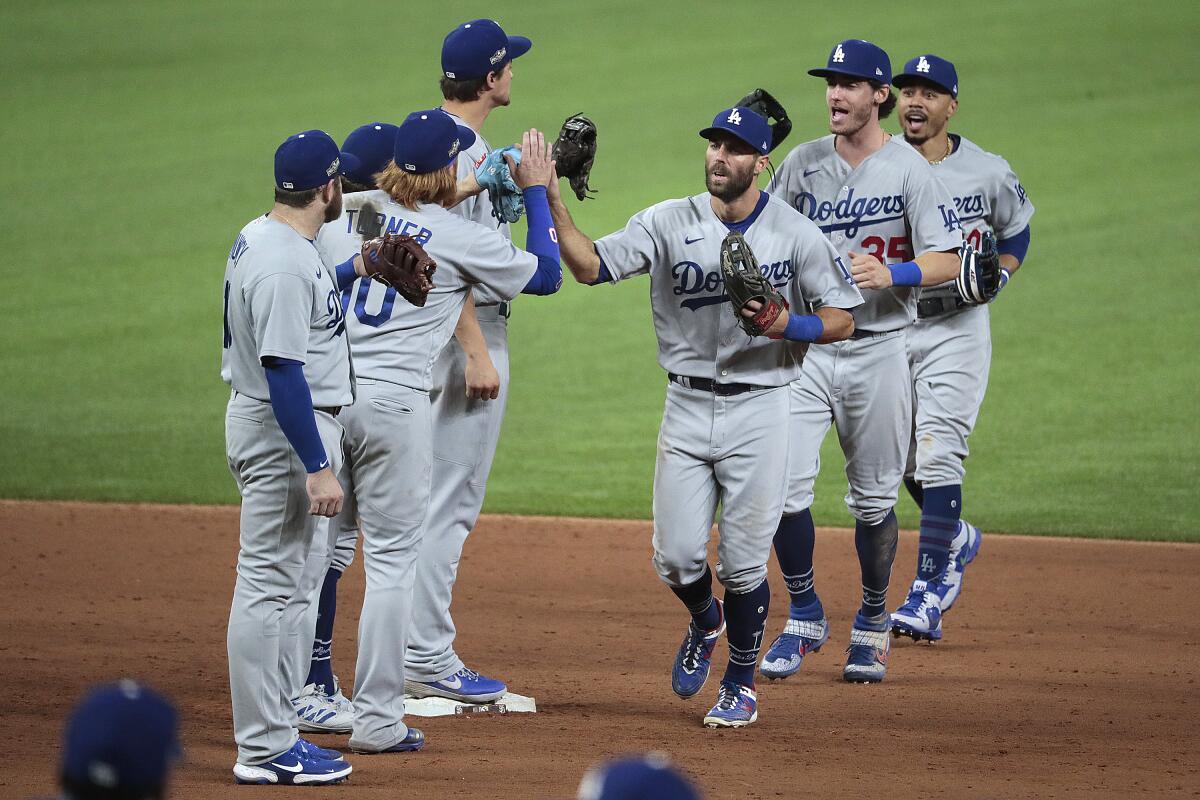
Game 3
Oct. 8
Dodgers 12, San Diego Padres 3
In the first postseason meeting between the two SoCal rivals, the Dodgers blew open the clincher early, jumping out to an 8-2 lead after five innings. Julio Urías, the Dodgers third pitcher of the night, pitched five innings of one-hit ball and Will Smith went five for six with three RBI.
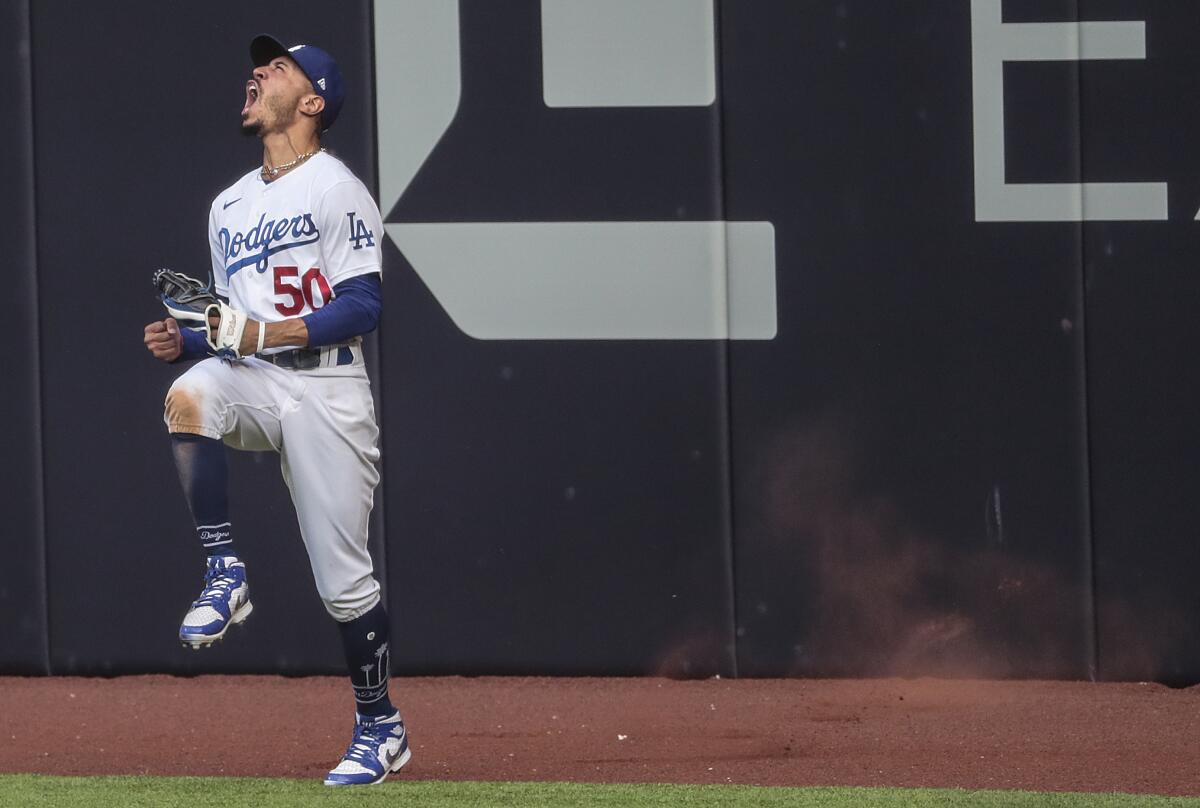
Games 5-7
Oct. 17-19
Dodgers 7, Atlanta Braves 3
Dodgers 3, Braves 1
Dodgers 4, Braves 3
Never had the Dodgers come back from a 3-1 postseason deficit — until 2020. Corey Seager, the eventual NLCS MVP, supplied the offense in Games 5 and 6, hitting three homers over the two games. In the clincher the Dodgers trailed 3-2 in the sixth, when Kiké Hernández tied the game with a homer. Cody Bellinger’s solo shot in the seventh broke the tie and Julio Urías continued an excellent postseason by retiring all nine batters he faced to send the Dodgers back to the World Series.
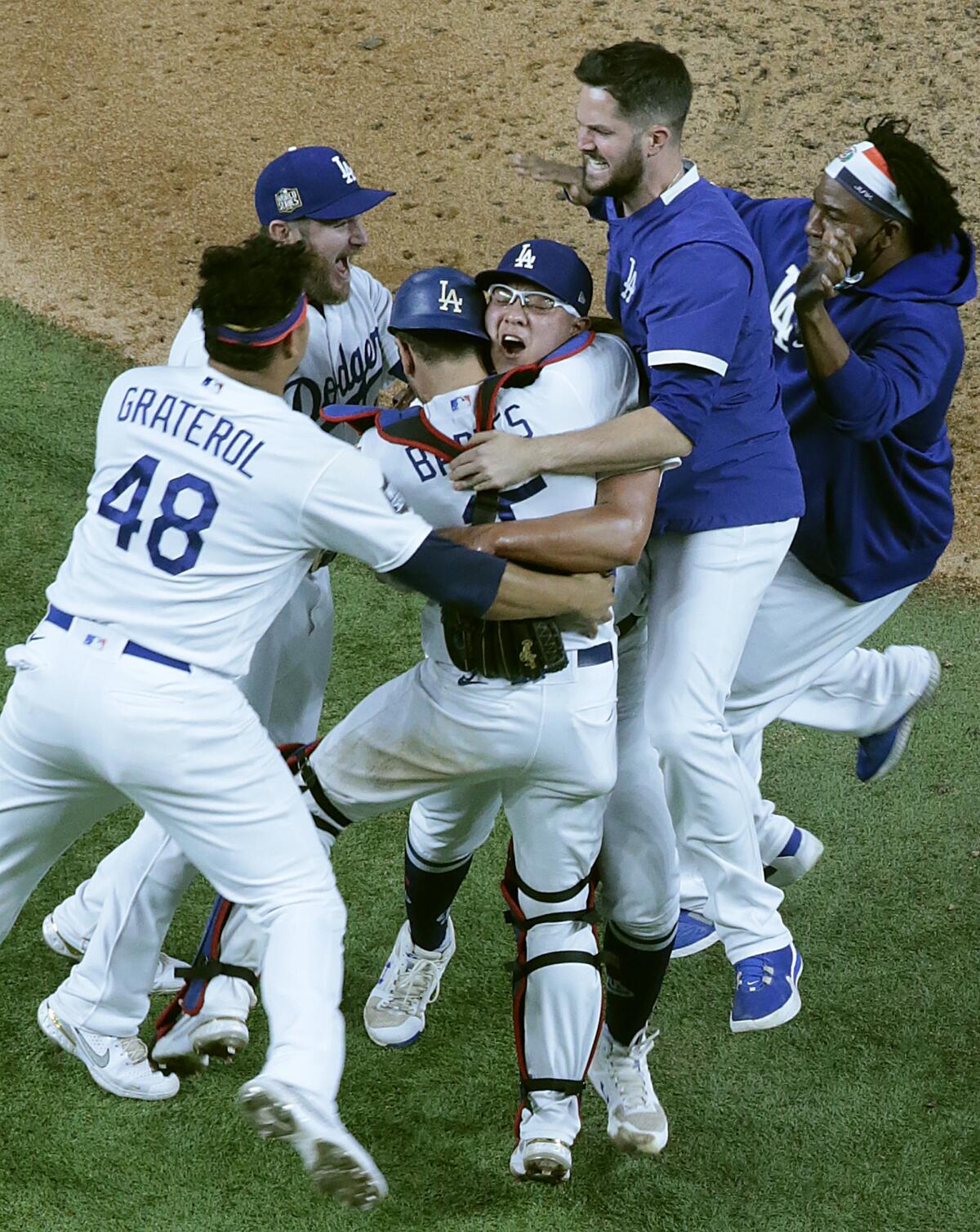
Game 6
Oct. 27
Dodgers 4, Tampa Bay Rays 2
Denied the opportunity for a Revenge Series against the Astros, who fell in seven games to the Rays in the ALCS, the Dodgers appeared headed for a Game 7 before things got weird. Tampa Bay’s Blake Snell was nearly flawless for 5 1/3 innings, yielding two hits before his manager Kevin Cash — adhering to a season-long commitment to minimizing third trips through the order for his starting pitchers — yanked him with a 1-0 lead. The Dodgers scored twice in the inning, on a wild pitch and a fielder’s choice. They added a run in the eighth (when, unbeknownst to pretty much everyone, things got weirder) on a Betts homer. Julio Urías put the coda on his dominant postseason with 2 1/3 more perfect innings.

Oct. 6
Dodgers 3, St. Louis Cardinals 1
In 2021 the Dodgers tied a franchise record for victories (106). They had the largest run differential in the majors by 59 runs. They won 16 more games and outscored their opponents by 225 more runs than the Cardinals, their foe in the play-in wild-card game. They had won their previous 15 games in Dodger Stadium, site of the play-in game.
They were a wrecking ball.
On a Los Angeles radio show two nights before the game, former Dodger great and TV analyst Orel Hershiser left no doubt about his belief that the Dodgers would dominate any five- or seven-game series. But the one-game wild card that stood between Los Angeles and those five- and seven-game series? That, Hershiser explained, is where the baseball gods — or randomness if you’re an atheist about these things — get to meddling. Even the worst baseball teams defeat the best ones several times a season.
It was taut, tense game, with the Cardinals jumping out a 1-0 first-inning lead against an uncharacteristically erratic Max Scherzer, who threw 94 pitches before manager Dave Roberts pulled him for Joe Kelly. A Justin Turner solo homer and a shutdown bullpen kept the score 1-1 until the bottom of the ninth inning. With two outs, Cody Bellinger, a .165 hitter in the regular season, walked and Chris Taylor, whose average since Sept. 1 was even lower than that, smoked a walk-off homer to left-center field.
The Dodgers had survived. Eight days later, it would be back to do-or-die.
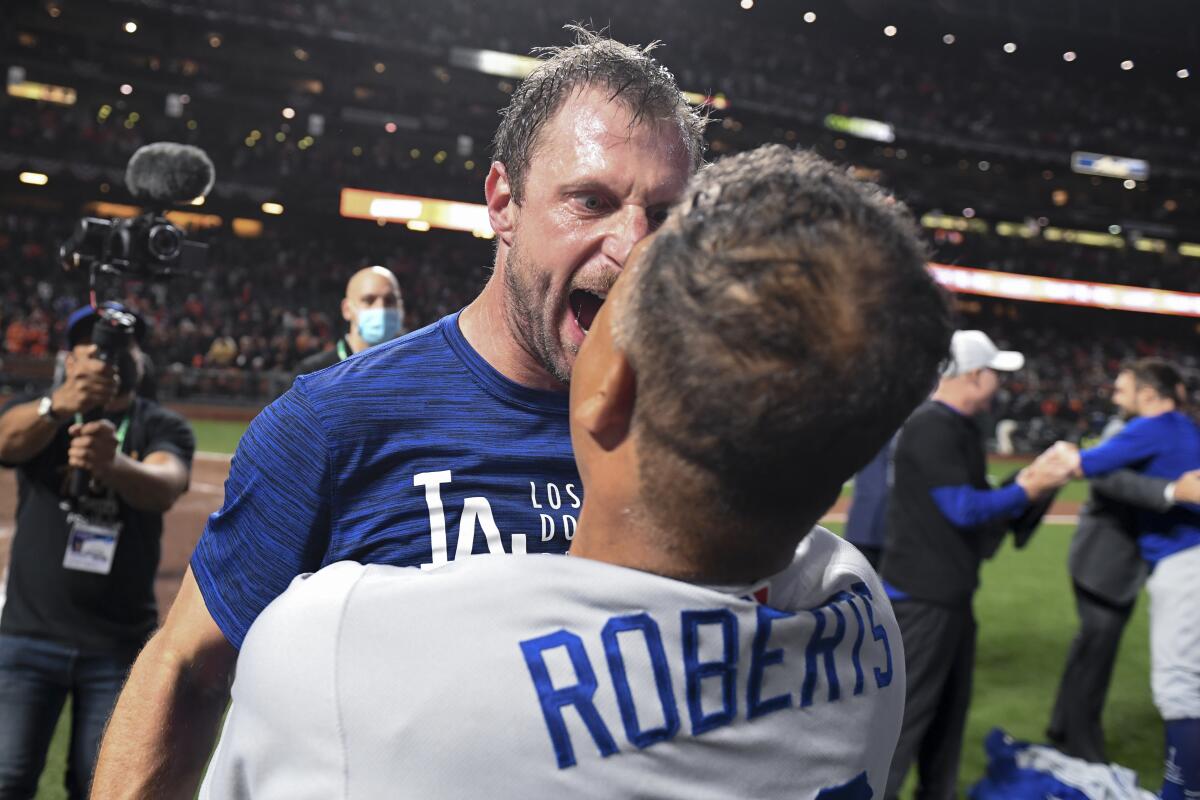
Games 4-5
Oct. 12/14
Dodgers 7, San Francisco Giants 2
Dodgers 2, Giants 1
In the first postseason meeting in the rivalry’s 131-year history, the Giants and Dodgers produced an heir worthy of their classic 1951 and ’62 showdowns, best-of-three tiebreakers that came down to the ninth inning of Game 3 both times. The NLDS finale, too, was decided in the ninth inning when Cody Bellinger hit a two-out, two-strike single off Giants closer Camilo Doval to break a 1-1 tie. Max Scherzer, with no prior saves to his professional resume, closed out the game, ending it on a controversial check-swing third strike against Wilmer Flores that replays showed to be incorrect.
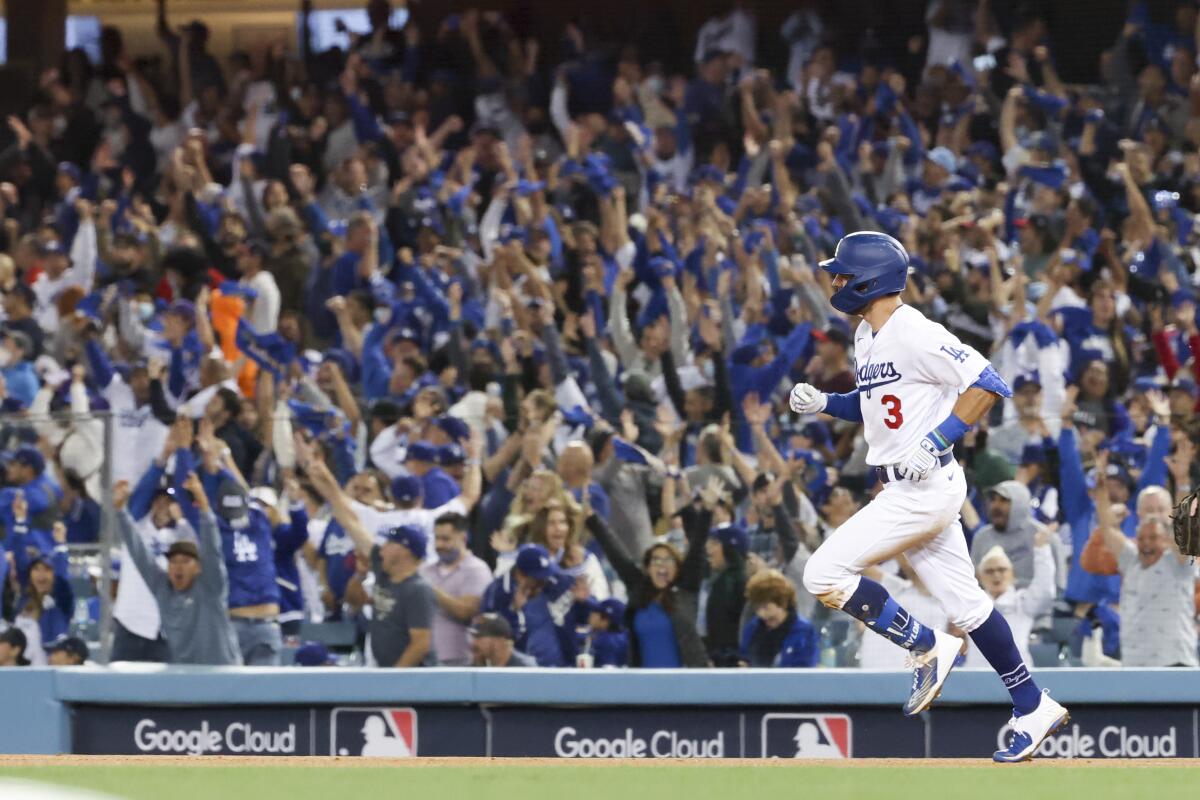
Game 5
Oct. 21
Dodgers 11, Atlanta Braves 2
One day after falling into their second consecutive 3-1 NLCS hole against the Braves, the Dodgers’ bats came alive with their biggest offensive outburst of the postseason. Chris Taylor — hero in the wild-card play-in game against the St. Louis Cardinals, goat in Game 1 of the NLCS when he got caught in a pickoff between second and third base of a tie game and Mookie Betts coming to the plate — joined Kiké Hernández (2017) as the only Dodgers to hit three home runs in a postseason game. When AJ Pollock hit a three-run shot in the eighth, L.A. became the first team to have players with a three-homer performance and a two-homer performance in the same game. Meanwhile, the bullpen did not yield a run over the final 8 2/3 innings to force a return to Atlanta for Game 6.
Are you a true-blue fan?
Get our Dodgers Dugout newsletter for insights, news and much more.
You may occasionally receive promotional content from the Los Angeles Times.